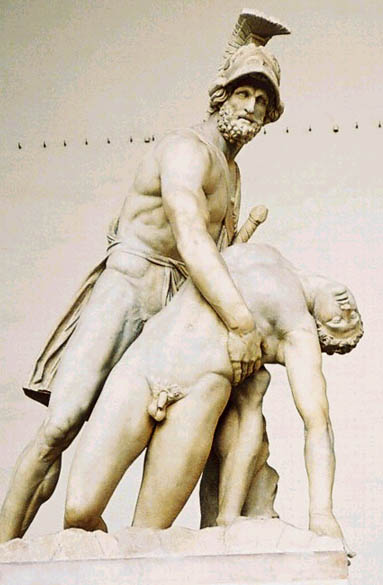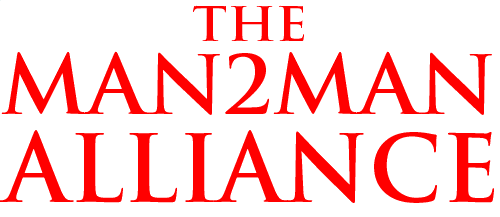




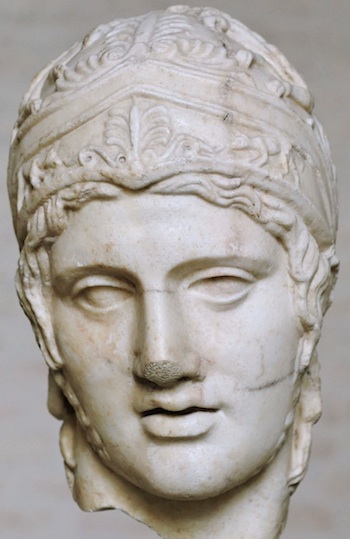

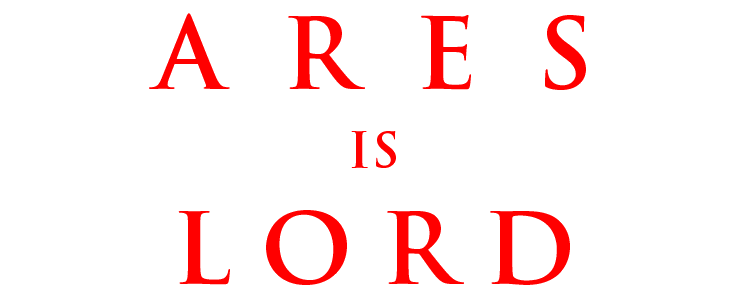
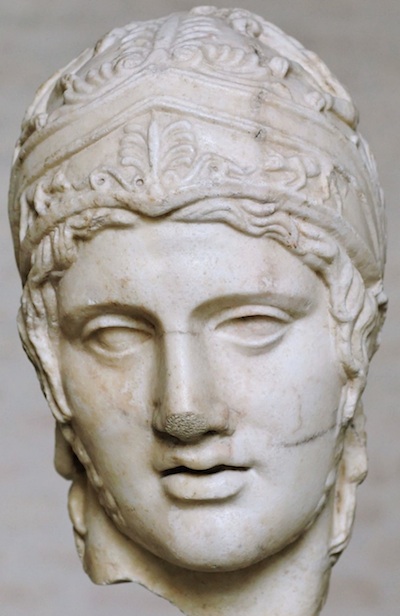









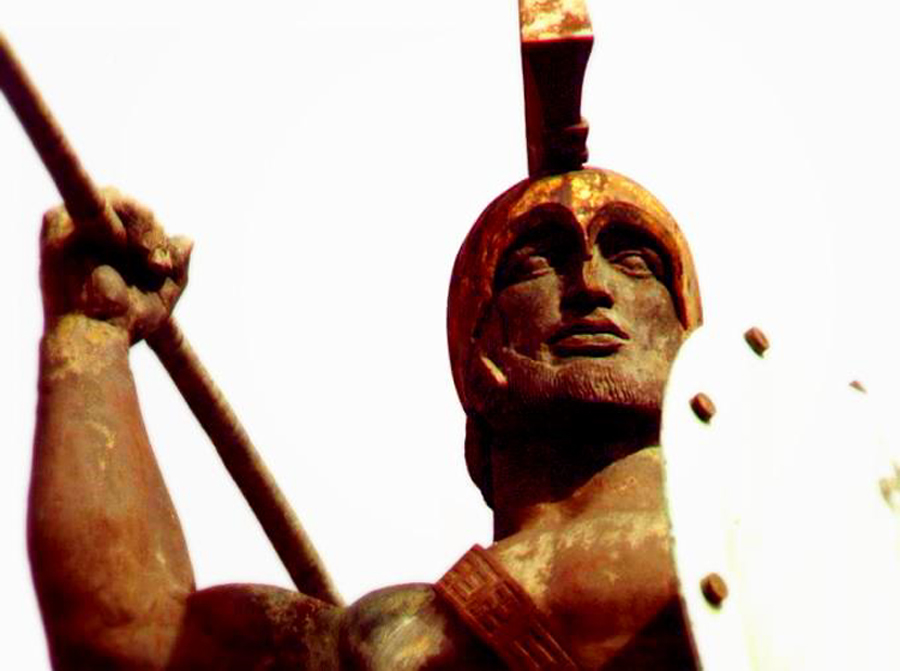


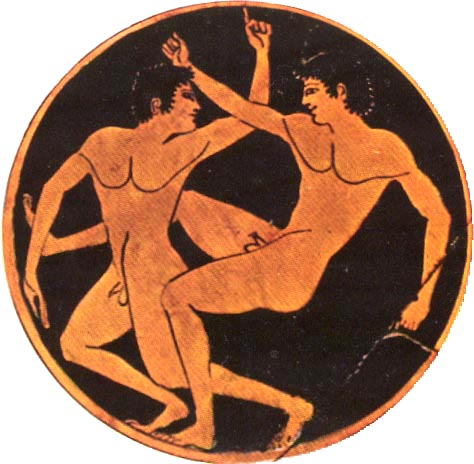
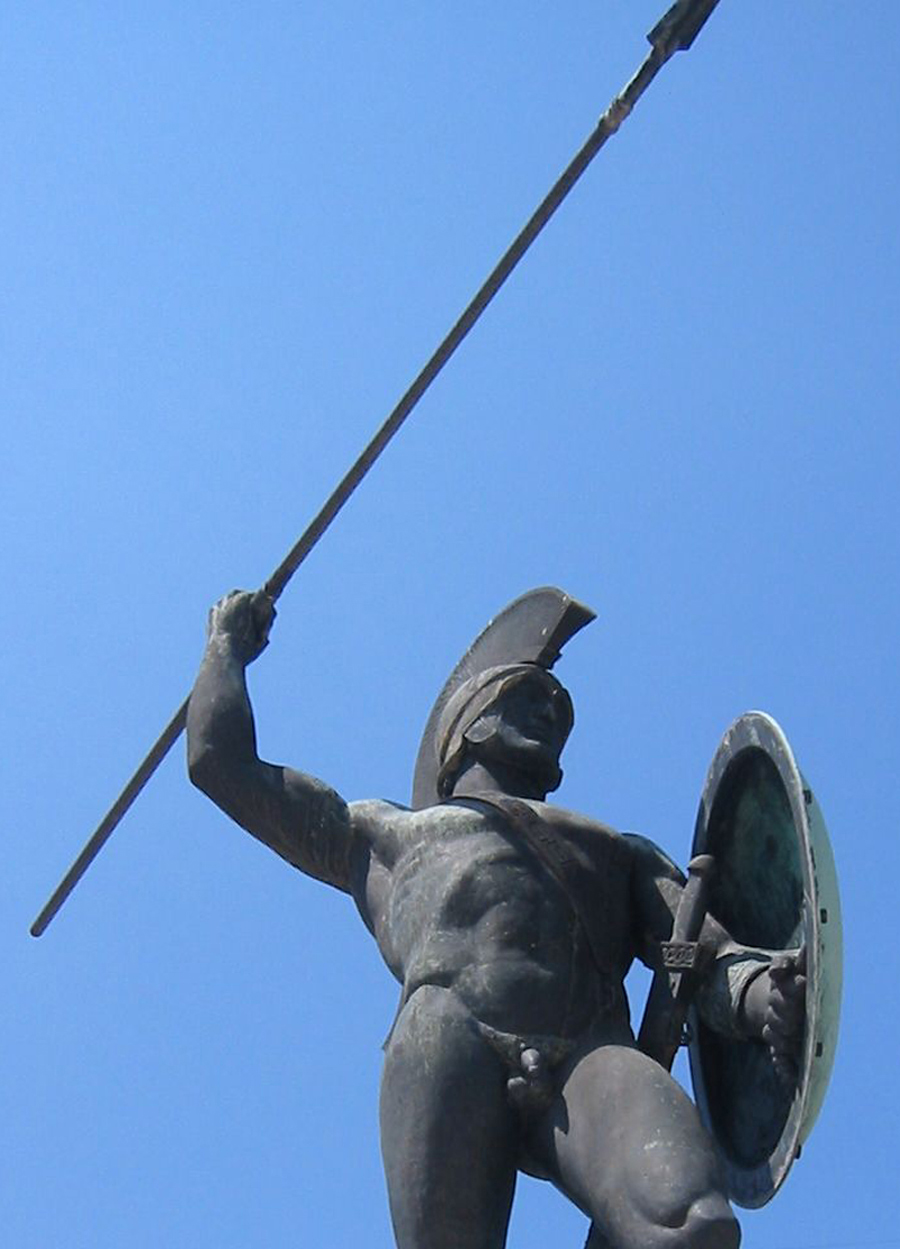
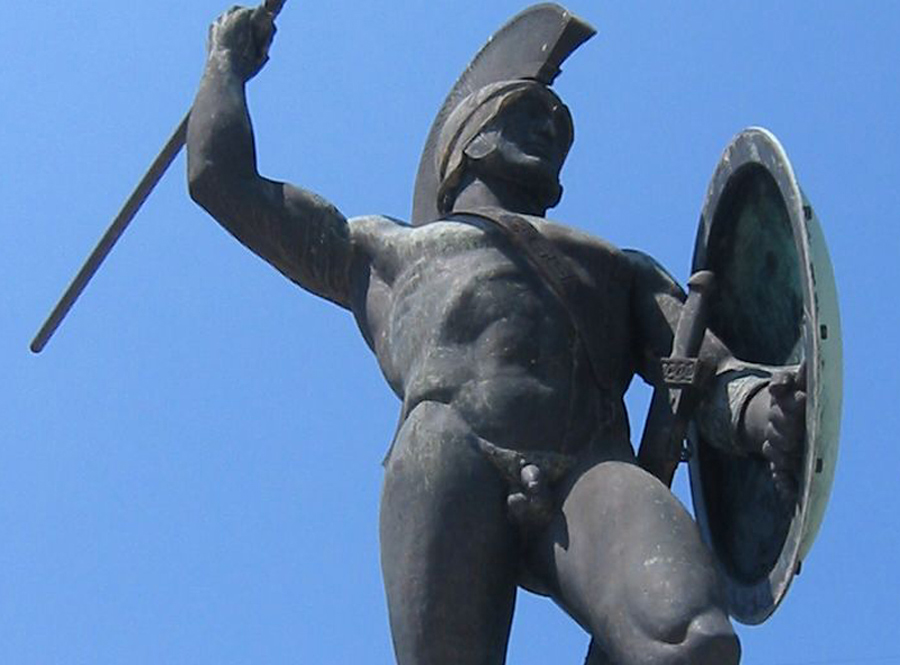
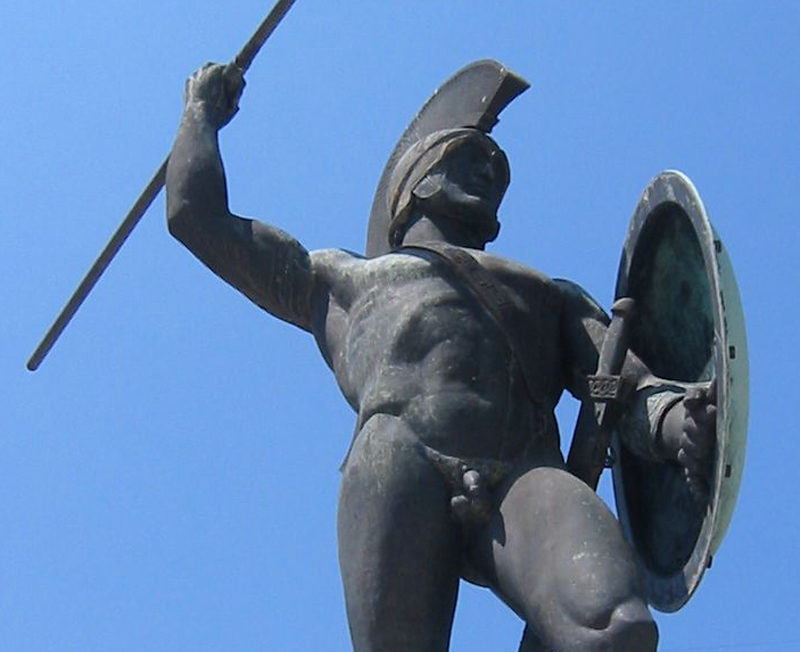


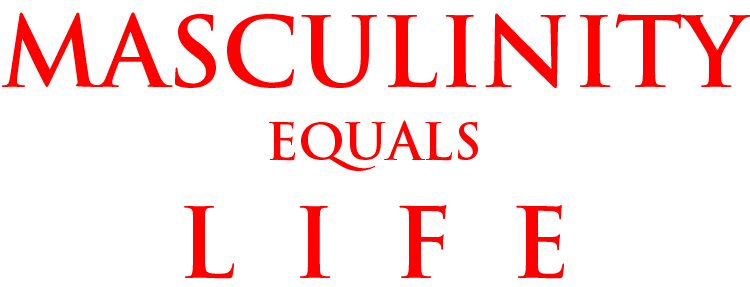







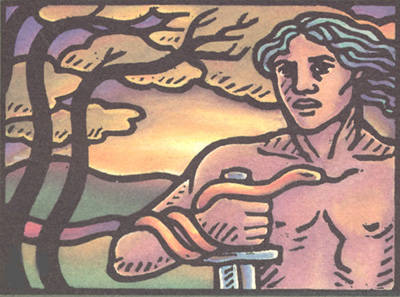


MANHOOD: A Reductional, Functional, Teleological, Incantational, and, above all, Sanctional --
Lexicon
7-4-13
Prefatory Note -- please read this first.
Prolegomena:
Men, Manhood, and Fighting -- please read this next.
MANHOOD -- A LEXICON
I Prologue II The Alphas of Male III Men of Honor: The Morally Beautiful, the Righteously Erect, and the Warrior Worthy I Warriors and Warriordoms
II Father and King
III Ares - Eros - Agon
IV Manly Moral Order
V In Union with Valour
I ARES : Manliness is Godliness
II ARES : High-Minded Passion and Noble Anger
III ARES : Adventus through Askesis
IV ARES : On Equal Terms
V ARES : Warlike and Wise
VI ARES : Scenes from a Munus
VII ARES : Nude Fight Free Fight
VIII ARES : Warrior Virtue
IX ARES : Warrior Communion
X ARES : Warrior Kosmos, Warrior Sanction
Word List -- Words discussed in this Lexicon
First off:
If you're new to the Alliance, please click here for important information which will help guide your reading.
Next:
This Lexicon of Manhood is a foundational, book-length article for the work we'll be doing in the Alliance in 2013 and thereafter.
It's essential therefore that you read the article.
And really read it.
I've included a Word List -- that is, a list of the individual words discussed in the Lexicon -- for easy reference.
However, glancing at that List is NOT a substitute for reading the article line-by-line all the way through -- at least once.
If you don't do that, you'll be unable to understand the ensuing discussions.
For that reason, I've put the Word List at the end of the article.
Because, and again, it's essential that you do read the article -- and preferably more than once.
As I said, the Lexicon is a book-length article.
It begins with this Preface, which is then followed by a Prolegomena.
"Prolegomena" is a term often used by scholars which derives from the ancient Greek words "lego" -- "I speak" ; and "pro" -- meaning "before."
Pro lego -- Speaking before, speaking first, as the dictionary explains:
1. A preliminary discussion, especially a formal essay introducing a work of considerable length or complexity.
2. Prefatory remarks or observations.
And that's what this Prolegomena to Manhood: A Lexicon is -- "a formal essay introducing a work of considerable length and complexity," which contains "prefatory remarks and observations."
So -- just as with this Preface you're currently reading, it's *essential* that you read the Prolegomena -- before you read the rest of the work, which is, indeed, "of considerable length and complexity."
Now: Because this Lexicon is both long and complex, I've separated it into sections -- for ease of reading.
And I've given each of those sections its ancient Greek name --
βιβλιον -- see Roman numeral II, Arabic numeral 2
So -- the ancient Greeks divided a long work, like this one, into "books" -- Biblia.
And the books in our Lexicon of Manhood are called Biblion Proton, Biblion Deuteron, Biblion Triton, Biblion Tetarton, and Biblion Pempton -- meaning First Book, Second Book, etc.
Why follow that ancient Greek practice and use those ancient Greek words?
Because I want you guys to increasingly understand that contemporary American culture is your enemy -- and ancient Greek culture -- your friend.
And to get used to ancient Greek words.
Which are really not difficult.
For example:
Biblios = Book ; and you all know a book called the Bible -- so that's not a stretch for you.
Proton = First ; and you've all heard of Prototypes, which are the First of their kind.
Deuteron = Second ; just think of Duo -- two. And there actually is a Greek word "duo," and deuteron is the comparative form of that word.
Triton = Third ; "tri," as in Triple -- and Triangle --
and Trident:
Not difficult.
Then there's Tetarton = Fourth.
Ever heard of a Tetrahedron?
What about Pempton = Fifth?
It derives from Pente = Five -- as in Pentagon.
And Pentathlon.
So -- First, Second, and Third -- are easy.
While for Fourth and Fifth -- you have to think a little bit.
So what?
Listen up:
You're not going to get what you want, and you're not going to go where you want -- in this life -- through easy.
YOU'RE GOING TO HAVE TO WORK.
Right now the "gay" community is riding high -- it has, essentially, achieved all its goals.
How did it do that?
By WORKING.
You've achieved nothing -- in fourteen years.
Because you've sat on your hands -- and your well-padded butts -- and refused to do *anything* which might even remotely challenge the status quo -- or -- your precious self.
No way that will ever get you anywhere -- other than where you already are.
Which is nowhere.
YOU HAVE TO WORK.
And if that means learning a few new words and reading an article -- that's what you'll do.
So, the Lexicon is divided, after the Prolegomena, into Biblion Proton -- First Book ; Biblion Deuteron -- Second Book ; etc.
There are five books in all.
And, as it happens, the first book, Biblion Proton, which is titled "The First Notion of Goodness," has three distinct parts : Prologue ; The Alphas of Male ; and -- Honor: The Morally Beautiful, the Righteously Erect, and the Warrior Worthy.
All three of those parts demonstrate how the Greek language speaks to the idea and ideal of Manhood -- as the first notion -- of Goodness.
The next two books, titled "Primal Love" and "UN-forgetting," are each unitary -- there are no divisions within them.
While Biblion Tetarton, titled "Fight is the Father of All," is divided into five parts.
Regardless, however, of how the individual books are structured, it's very important that you read the books IN THE ORDER GIVEN in the Table of Contents.
For example -- some of you may see this in the Contents --
and want to read the Fifth Book first.
DON'T.
Read the First Book first ; and then the Second, etc.
Because you won't understand what comes after each book -- unless you've read what comes before.
The Table of Contents appears just before this preface, at this link, and here as well:
Prefatory Note -- please read this first.
Prolegomena:
Men, Manhood, and Fighting -- please read this next.
MANHOOD -- A LEXICON
I Prologue II The Alphas of Male III Men of Honor: The Morally Beautiful, the Righteously Erect, and the Warrior Worthy I Warriors and Warriordoms
II Father and King
III Ares - Eros - Agon
IV Manly Moral Order
V In Union with Valour
I ARES : Manliness is Godliness
II ARES : High-Minded Passion and Noble Anger
III ARES : Adventus through Askesis
IV ARES : On Equal Terms
V ARES : Warlike and Wise
VI ARES : Scenes from a Munus
VII ARES : Nude Fight Free Fight
VIII ARES : Warrior Virtue
IX ARES : Warrior Communion
X ARES : Warrior Kosmos, Warrior Sanction
Word List -- Words discussed in this Lexicon
Because the Lexicon is long, and, more to the point, contains a great deal of information, I strongly suggest you read one section at a time -- the Prolegomena, followed by Biblion Proton, Prologue, followed by Biblion Proton, The Alphas of Male, etc.
In other words, give yourself some time to digest and think through the information you've received in one section -- before going on to the next.
At that rate, it might take you a week -- or a month -- to read the entire Lexicon.
That's fine, and appropriate.
The Lexicon is long, and it's complicated.
Give yourself time.
And of course I also strongly encourage you to read the entire Lexicon more than once.
The ideas contained in this Lexicon, as in all the articles on this site, are complex.
For the vast majority of people, one reading does not and will not suffice.
And, like I said, it's important that you read the Lexicon in the order given ; don't read the second book before reading the first, for example.
Now:
To those of you who will complain that the article is "too long" and "too much to read" etc and ad nauseum -- this is my response:
I'm no one's fool, and certainly not yours.
I know how much time you waste on the internet looking for pix of guys' dicks, reading the latest celebrity trash on Yahoo!, etc.
Not to mention the time wasted watching cable tv.
I know because you write to me about it.
So I do know.
You spend a lot of time -- a LOT of time -- polluting your minds.
Which means that --
You have more than enough time to read this Lexicon, if you so choose.
And -- That you need to stop surfing the net looking for meretricious crap -- worthless filth which has, and will continue to, destroy you -- and truly concentrate instead on the Alliance.
Because, as I often say, Being Determines Consciousness.
If you continually immerse yourself in the world's mainstream hedonist and viciously avaricious culture -- that will become your consciousness.
Your debased and ignoble consciousness.
Which it already is for 99.99% of you.
If, by contrast, you immerse yourself -- and I do mean immerse -- yourself -- in the Virtuous Manhood which we here present -- that will become your consciousness.
Your Virtuous and Manly Consciousness.
So:
You can have Virtue or vice.
But you cannot have both.
And you'll never have what you claim you want --
Unless you choose Virtue -- which, as you'll see, is Manhood -- and then *act* on that choice.
Bill Weintraub
July 4, 2013
Prefatory Note -- please read this first.
Prolegomena:
Men, Manhood, and Fighting -- please read this next.
MANHOOD -- A LEXICON
I Prologue II The Alphas of Male III Men of Honor: The Morally Beautiful, the Righteously Erect, and the Warrior Worthy I Warriors and Warriordoms
II Father and King
III Ares - Eros - Agon
IV Manly Moral Order
V In Union with Valour
I ARES : Manliness is Godliness
II ARES : High-Minded Passion and Noble Anger
III ARES : Adventus through Askesis
IV ARES : On Equal Terms
V ARES : Warlike and Wise
VI ARES : Scenes from a Munus
VII ARES : Nude Fight Free Fight
VIII ARES : Warrior Virtue
IX ARES : Warrior Communion
X ARES : Warrior Kosmos, Warrior Sanction
Word List -- Words discussed in this Lexicon
By Bill Weintraub
Ιn 329 BC or so, Alexander the Great, in the midst of conquering the world, left some of his disabled soldiers in a city for rest and recuperation, which was then attacked by a particularly vicious group of Scythians:
These two had sufficiently recovered to ride and bear arms when the Scythian raid occurred; so as soon as they knew of it, they got together about eighty mounted men -- mercenaries, left to garrison the town -- and with them and a few of the King's boy squires, rode out to the attack.
The Scythians were taken by surprise and the first charge was successful: they recovered all the stolen cattle and killed a number of the men who were driving them off; but as they were straggling back to the town, in more or less go-as-you-please fashion, Spitamenes and his Scythians caught them in an ambush.
Seven of the Companions were lost, and sixty mercenaries.
Aristonicus too was killed -- having fought however not like a harpist, but like a man ; and Peitho was wounded and taken prisoner.
~Arrian, Anabasis, iv. 16. 7, translated by Aubrey de Selincourt
The phrase you need take note of is this:
"having fought however not like a harpist, but like a man"
And, in the original, there's a footnote after the word "man," footnote 45, which says,
and indeed Plutarch does say just that:
Various harp-players [kitharadoi] also were his friends, among them Aristonicus, who came to Alexander's aid in a certain battle, and was slain fighting gloriously. Therefore Alexander ordered to be made and set up at Delphi a bronze statue of him, with lyre in hand and spear advanced.
Now, in Arrian's original Greek, the text actually says that Aristonicus Fought like a Brave and Good Man, and the word for brave and good -- is agathos.
And, as you'll see in our Lexicon, agathos is the adjectival form of areté ; and, according to Liddell and Scott's Ancient Greek Lexicon Manhood.
"the first notion of goodness being that of manhood"
And, Liddell and Scott re-inforce that point by saying that areté is
Further, you'll notice, if you click on this link which takes you to Liddell and Scott's definition of areté, that they make the point even plainer by putting the word areté followed by the word Ares at the very beginning of the definition, thus:
αρετη Αρης
And while I know most of you don't read Greek, it's easy to puzzle out.
The Greek letter A looks like our letter A in both upper and lower case.
The Greek letter R -- which is Rho -- looks like our letter P in both upper and lower case.
T -- looks like -- T.
While there are two Greek letters which have an "e" sound:
One is epsilon, which looks our letter E, and the other is eta, which in lower case looks like our lower case letter n.
And that's it.
αρετη = areté;
Αρης = Ares.
And there's an extremely strong relationship between the two, which Liddell and Scott make plain by putting the two words side by side:
αρετη Αρης
Areté -- Manhood, valour, prowess, goodness, excellence -- flows from Ares -- the God of War -- or, to be more precise, the God of Fight.
And agathos, being the adjectival form of the noun areté, carries the same connotation of Manliness which derives from and is inextricably linked to -- Fighting.
So: de Selincourt translates the passage about the gallant Aristonicus as -- "he Fought like a Man" -- and that's correct.
He fought like a Man -- a Manly Man -- that is, a Man in full possession of his Manhood.
The point being that to the Greeks, what defined a Man and Manhood -- was the Willingness to Fight.
Willingness to Fight.
Valour.
Ability was good too -- you see that Liddell and Scott say "manly qualities, manhood, valour, prowess" ; and prowess means skill or ability.
Prowess.
So Manhood = Valour + Prowess = Willingness and Ability to Fight.
Which is why I often use this graphic in my articles:
Manhood is the Ability and Willingness to Fight.
Why do I emphasize Ability?
Because it's esssential that YOU -- and every other male -- learn how to Fight.
But all but one or two of you -- won't.
So you'll NEVER know -- despite all your male-posturing -- what it means to be a Man.
Among the Greeks, in theory, every boy was taught how to Fight -- at the Palaistra, the Wrestling School, which also taught Boxing and Pankration.
But -- we know from Plutarch that at Athens, at least, not every boy went to the Palaistra -- the great orator Demosthenes, for example, whom we've talked about, didn't -- and suffered as a result:
He could make a great speech ; but when it came to Fighting in Battle -- he was a coward.
He literally ran away.
So let's look at Demosthenes for a moment:
First we have the ancient writer Lucian, who describes the process by which every boy was taught to Fight.
Lucian:
. . .
[Training in Fight Sport] creates two valuable traits in our young
men: it makes them brave in the face of danger and unsparing of their
bodies, and it also makes them strong and vigorous.
Then we have this anecdote from Plutarch's life of the Athenian orator Demosthenes:
First he tells us that Demosthenes consistently showed a
Then he tells us that
which was then mismanaged by his guardians, so he didn't have a good standard Greek education.
Moreover,
So -- the Greeks had a system of physical training in Fight Sport.
In most city-states, like Athens, a kid was expected to participate but didn't have to.
In Sparta -- he had to.
Demosthenes, unfortunately for him, was Athenian.
Demosthenes' father died, the estate was mis-managed, and his mother didn't force him, as she should have, to go to the wrestling-school -- the palaistra.
As a first consequence, he remained skinny and sickly, and his peers mocked him with the sobriquet "Batalus," which Plutarch's researches found was associated with effeminacy, promiscuity, and -- the anus.
As a second consequence, Demosthenes never learned that he could -- physically Fight.
He never learned that.
And although as an adult he was good at Fighting with words -- he was an orator --
on the battlefield he was a coward -- he ran away.
Why?
Because he never learned the basic lessons of Fight School -- "to stand up to blows face to face, and not to yield through fear of injury . . . to be brave in the face of danger . . . and unsparing of [your] body."
In other words, he never learned he could take a punch.
The result -- he was laughed at as a child, taunted with being a femmy asshole -- and was a coward as an adult.
Now -- part of the problem was that he was raised by his mother -- because his father had died.
In Sparta, that wouldn't have mattered.
He would have gone into the agogé -- and his upbringing would have been supervised, ultimately, by every adult Male Spartan -- who were all Warriors.
He would have learned to Fight.
And he would have gone from being sickly -- to being robust.
So -- What Warrior NW has said -- is the Truth:
That's a Truth which the ancients understood -- and put into practice.
Except in the case of Demosthenes -- whose entire life, and the life of his city-state, was blighted, as a result.
So -- Fighting, and Learning how to Fight -- matters.
In the Aristonicus anecdote, what counted with Alexander -- and Arrian -- was Aristonicus' WILLINGNESS to Fight.
He may -- or may not -- have been a skilled Fighter.
But he went out to Fight -- to protect the sick Men -- in the city.
Naturally, Alexander was pleased.
So, in this instance, Willingness came first -- not ability.
And, particularly among the archaic and classical Greeks, of whom very few Men, other than the Spartans, were full-time soldiers, Willingness was what was needed and expected when it came to hoplite battle.
It was the Willingness to Fight -- that defined a Man.
Why does that matter?
Because it's crucial for you to understand that in the ancient world, and UNLIKE our contemporary world, Manhood had NOTHING to do with sex.
Except : that once in a while, the Greeks use the most common term for Manhood -- andreia -- to mean the male genitals.
Just as we do.
But -- the vast majority of time, Manhood refers to the Man's Willingness to Fight.
That's what Manhood is.
And in particular, though the word for Manhood may, once in a very great while, refer to the male genitals, Manhood itself has nothing to do with sexual acts, or the gender -- that is, male or female -- of the male's sexual partner.
NOTHING.
In that sense, and unlike in our own society, in which Manhood and being a "real man" is continually linked to something called "heterosexuality" -- that is, as one of our straight-identified guys puts it, fucking warm wet pussy --
Manhood, for the Greeks, had nothing to do with the gender, whether male or female, of a sexual partner.
Manhood was defined as the Man's Willingness to Fight.
So, in the little anecdote from Arrian about Aristonicus the harp-player, Arrian doesn't say that Aristonicus had always been into males sexually, but one night he fucked a woman, and then he died, and so he died like a man.
He doesn't say that.
Nor would he have ever said that.
Aristonicus Fought "like a man" -- and therefore died like a Man:
Aristonicus too was killed -- having fought however not like a harpist, but like a man.
And that, to the Greeks, is what mattered: He Fought like a Man.
And as a consequence,
And "spear advanced" means spear erect -- orthos -- and ready for battle.
And if you've been clicking on the little underlined links to Greek words, such as this one -- orthos -- you know that they take you to the word's definition in our Lexicon's Word List, which in the case of orthos means straight, standing erect, morally upright, righteous.
So:
When the Greek word for Manhood refers to the male genitals, which again, is rarely, it refers to them as the source of Man's Willingness to Fight.
And that's what was portrayed in the statue Alexander commissioned:
Aristonicus is shown with his spear -- which is phallic -- advanced and ready -- to Fight.
Alexander wanted Aristonicus to be remembered as a harpist -- who Fought and Died -- a Man.
And again, and I cannot emphasize this too strongly, it's critical, in reading this Lexicon, which is about Manhood, that you understand that the Manhood in question is Fighting Manhood.
Not "sexual" manhood.
But Fighting Manhood.
So -- this is a pic, not of the Aristonicus statue, which no longer exists, but of a statue of Leonidas of Sparta -- and it gives you some idea of what such statues looked like:
It's a Statue of Manhood.
Fighting Manhood.
Now -- just one more thing about the harp-player, Aristonicus, and how he "was killed -- having fought however not like a harpist, but like a man."
In the original Greek, the verb Arrian uses is "gignomai" -- γιγνομαι -- which means -- "come into a new state of being."
So -- it's hard to translate.
And de Selincourt's "having fought however not like a harpist, but like a man" is fine.
But, what Arrian is really saying is that by Fighting, Aristonicus left the state of "harp-player," and came into a new state of being -- that of Man.
That of Brave, Good, and Noble -- Man.
And that's certainly how the Greeks saw it:
Fighting Makes the Man.
It Awakens the Man, as we often say in the Alliance, to his Manhood.
Fighting Awakens the Man to his Manhood.
Manhood.
Which is the Willingness and Ability to Fight.
So -- here's another anecdote from Arrian which bears very directly on this definition of Manhood as Willingness to Fight -- and Ability to Fight.
And who, by the way, was Arrian?
Lucius Flavius Arrianus, a Greek by birth, was a distinguished Imperial Roman governor and military commander -- he commanded an entire border province for Rome and in that capacity repulsed a barbarian invasion; in addition, he was a Stoic who as a young man studied with Epictetus of Nicopolis and preserved his famous teacher's words, which he took down in shorthand, in eight volumes, known as the Discourses, and then summarized those teachings in an Encheiridion or Handbook -- and it was almost certainly Epictetus who imparted to Arrian the high moral standards through which he views Alexander.
In addition to his other government and military service, Arrian held two supreme magestracies, one at the political center of his world, the other at the intellectual: He was suffect consul at Rome in 129 or 130 AD, and then held the archonship at Athens in 145-6, afterwards becoming a member of the Areopagus -- Αρειος παγος -- the ancient Athenian council, which met on Ares' hill.
Arrian was also a prolific writer about military matters, writing several books on tactics, and another on the emperor Trajan's Parthian campaigns. He also wrote about his own circumnavigation of the Black Sea, as well as a book based on Alexander's Cretan admiral Nearchus' voyage to India, wrote a history of his home kingdom of Bithynia, a history of Events After Alexander, now mostly lost, several biographies, and even a book on hunting -- and Arrian wrote his Anabasis Alexandrou, today usually translated as "The Campaigns of Alexander," and which he considered his most important book, the labor of a lifetime, sometime between 120 and 150 AD.
So Arrian was and remains an impressive Man, well-known in his own lifetime, with a remarkably broad range of interests -- philosophical, historical, political, military -- and literary.
Further, Arrian was a Man who lived in a Masculinist culture, and whose values, from his love of the Martial Life -- the Life of Ares -- to his acceptance and appreciation of Male Eros -- that is, Romantic Passion between Men -- to his embrace of Stoicism and its emphasis on Sophrosyne -- self-control -- were at the heart of the Fighting Manhood which was core to that culture.
Now, Alexander lived from 356 to 323 BC.
Arrian, from about 90 to perhaps 173 AD.
So -- why should we believe Arrian?
Because he had available to him, and relied upon, the testimony, in the form of memoirs, of numerous eyewitnesses to Alexander's life and campaigns.
And because he was a formidable military man in his own right, which made him an excellent judge of Alexander's tactics, leadership, and character -- and also a friend of the Roman emperor Hadrian --
Who was devoted to and championed Greek culture and who had a Greek-born Lover, Antinous --
Who, it so happened, came from the same province -- as Arrian.
In short, Arrian was uniquely placed to write the definitive history of Alexander and his achievements --
And Arrian did -- and, in my view, superbly.
So -- here's another anecdote from Arrian which bears very directly on the Greek definition of Manhood as Willingness to Fight -- and Ability to Fight.
Because further on in the expedition, Alexander was almost killed when he led the charge into an enemy city.
His officers were concerned, and asked him to take more regard of his personal safety.
Alexander wasn't pleased.
Arrian:
~Arrian, Anabasis, vi. 13. 5, translated by Aubrey de Selincourt
"Action is a Man's job, my lord."
Action of course is movement, motion, and the Greek word for that is kinesis.
And as it happens, Ares, the God of War, is also the God of Kinesis -- of Action.
Fighting Action.
Ares is the God of, and the personification of, Fight.
And of Fighting Manhood.
Action is a Man's job.
Notice the position of Alexander's arm, which would have been holding a spear, Fighting is a Man's job.
Fighting -- is a Man's job.
The old soldier doesn't say "fucking warm wet pussy is a man's job" ;
He says, Action -- Fighting -- is a Man's job.
Fighting is Man
Fighting is Good
Man is Good:
Man is Good because He Fights.
Again, Man is Good because He Fights.
Which is why Fighting Manhood is, as Liddell and Scott say, the first notion of Goodness.
The first notion of Goodness is Fighting Manhood.
Fighting Manhood is Goodness.
Do you understand?
I hope so, because I've been telling you this for fourteen years, and most of you -- still don't get it.
The Greeks didn't care about the gender of a male's sexual partner.
We do.
What's the difference?
CULTURE.
Ancient Greek culture defined Man -- as virtually all cultures have -- as Willingness to Fight.
Our contemporary culture defines male -- as willingness to fuck females ; while discouraging those same males -- from fighting.
And that has taken a terrible toll upon Men.
Because:
The Greeks were, in this as in so many other things, right.
What truly defines Manhood and Manliness -- that is, the Man's inner sense of being a Man -- is Fighting Spirit -- the Willingness to Fight.
That was true in ancient Greece, and it's still true today:
And that is NOT CULTURAL.
It's both biological and spiritual.
A culture which denies its Men the realization and enjoyment of that biological and spiritual reality --
destroys them.
Now, let's talk about "gender neutral," that is, the plain fact that the Greeks didn't care about the gender -- that is, male or female -- of one's sexual partner.
They didn't care.
Except that they had a bias in favor of male-male relationships, which they thought were more faithful.
Here's a story, told by Plutarch in his Life of Phokion, which illustrates that point.
That's the Scott-Kilvert translation, which is on the Heroes Reading List ; it's a tad more modern than Perrin's, but you can read Perrin's on line here:
So -- Here's what Theodorus says:
And you can see that Theodorus is "gender-neutral"; you might be in love with a man, you might be in love with a woman; the man might be a comrade -- that is, a fellow-soldier, the woman might be a mistress.
And he's making a play on the Greek words for male and female beloved and for comrade and mistress:
the same should be true of a woman [phila]; if the principle applies to a comrade [hetairos], it applies equally to a mistress [hetaira].
So it's difficult to render in English; but what Theodorus the Atheist says uses the masculine form of philos for "a man beloved" and the feminine form for "a woman loved"; then he uses the male word "hetairos," meaning "comrade" or "[male] companion,"
Hetaireios : of or belonging to companions
and then the female word "hetaira," meaning a for-hire female mistress, a concubine.
So -- there are philoi (masculine) and philai (feminine), there are hetairoi (male comrades, companions, lovers) and hetairai (prostitutes).
The point being that the word "hetairos," a male comrade, can also mean a male lover.
So -- a hetairos is a comrade, a friend, a mate -- a brother in arms, a man beloved, a lover;
while a hetaira is a prostitute.
According to Theodorus -- they're equivalent.
Well, in terms of gender, and gender alone, that's true.
Male or Female, Man or Woman -- doesn't matter; to desire one or the other or both, to have one or the other or both as sexual partners -- is normative among the Greeks.
As classicist KJ Dover said:
But, and of course:
Even in our hopelessly corrupt and virtue-less society, we understand the difference between a freely-chosen mate -- and a paid mistress.
And so did the Greeks -- far more so, I'd say.
But Phokion's son -- a man of no worth -- didn't.
He was swayed by the arguments of the atheist.
Moreover, and as you can see, the word "hetairos" itself has a military connotation.
As classicist Nick Sekunda tells us in The Spartan Army:
~Sekunda, The Spartan Army, 13.
So -- a Man has a hetairos -- comrade; and there are hetaireiai -- bands of comrades.
Both terms are military.
And a Man's Comrade may also be his Beloved.
Phokion's son, a male "of no worth," heard "Theodorus the Atheist discourse in the Lyceum as follows: 'If there is no disgrace in ransoming a man beloved, the same is true of a woman loved; what is true of a comrade, is true also of a mistress.' "
And went ahead and bought the prostitute.
Does Plutarch agree with Theodorus the Atheist?
NO.
The point Plutarch's making is that only a male "of no worth," like Phokion's son, would be stupid enough to confuse a Manly Lover, a Warrior Lover, whose Love is Freely Given -- with a female prostitute -- whose services are paid for.
And again, as is always the case in the ancient world, it's a question of reason ruling passion.
Phokion's son, a male of no worth, is governed by his passion:
That's bad; and a clear marker of moral inferiority and therefore lack of manliness.
The Manly Male is ruled by his Reason -- not by his passions.
He's temperate -- he possesses self-control, sophrosyne -- the pivotal Greek civic virtue.
But the larger point I'm making is that in archaic and classical Greece, male-male was inextricably bound up with Fighting, both in sport and at arms, and therefore with Martial Values.
Love between Men was, as I've said, Manly, Martial, and Monogamous -- Phallic, Faithful, and Heroic.
And only a hedonistic and atheistic male like Phokion's son would confuse the True Love of Man for Man -- with lust for a prostitute.
Now -- here's another point:
Where does the word hetaira = paid companion = prostitute -- come from?
Well, according to Plutarch in yet another of his essays -- his Life of Solon -- hetaira = a nice way of saying "porne" = whore or harlot:
Thus they called harlots 'companions,' taxes 'contributions,' the garrison of a city its 'guard,' and the prison a 'chamber.'
~Plut. Sol. 15.3, translated by Perrin.
Harlot = whore = porne πορνη
'Companion' = paid companion = hetaira εταιρα
So -- if you feminize a Manly companion -- a hetairos -- he becomes a hetaira -- a prostitute.
Which is what we've seen in our contemporary world, in which effeminized males are promiscuous at a level rivaling that of prostitutes.
So -- Among the Greeks, Male-Male Love was inextricably linked to Martial Values and Manliness -- and considered the equal of, or slightly superior to, male-female love.
But again, whether the love or affection or just plain sex was male-male or male-female -- didn't matter to the Greeks.
What mattered to them was the moral comportment of the individuals involved.
As you've just seen.
And there are a great many anecdotes like the one about Phokion's son -- in Plutarch's enormous body of work.
For example -- here's one about Alexander:
~Plut. Alex. 22.1, translated by Perrin.
What's at issue here is not the gender of the love-object or subject-of-desire, whether male prostitute or mercenary's wife -- but the behavior of those in love or lust.
In the same paragraph, and thus linked together, Plutarch tells us that Alexander, who was the Lover of Hephaestion, his "philtatos hetairos" -- most beloved companion -- "whom," Arrian says, "he loved better than all the world," and whom, Alexander himself said, "I valued more than my life" ; and whom he'd been with since childhood -- "severely rebuked" someone who offered to buy him a pretty boy ; and ordered put to death two soldiers who'd raped other soldiers' wives.
In both cases what's in question is sexual behavior, and because it's bad behavior, Alexander punishes those involved.
And again, whether the love or affection or just plain sex was male-male or male-female -- didn't matter to the Greeks.
What mattered to them was the moral comportment of the individuals involved.
As you've just seen.
Now -- is Plutarch the only ancient Greek author to write in these gender-neutral terms?
No.
They all do.
And I do mean all.
For example, here's something from Plato's Republic regarding rewards given for Valour in Battle:
~Plat. Rep. 5.468b,c, translated by Shorey.
Jowett's translation -- which is earlier than Shorey's -- is actually, I think, a bit better, at least for our purposes, in the crucial passage:
Let no one whom he has a mind to kiss refuse to be kissed by him while the expedition lasts. So that if there be a lover in the army, whether his love be youth or maiden, he may be more eager to win the prize of valour.
"whether his love be youth or maiden"
That says it all.
The promise of a "kiss" makes the Warrior more eager to win the "prize of valour" -- which is, by the way, aristeia -- "whether his love be youth or maiden."
Let's come back to Alexander:
Alexander was passionate about winning "glory" -- actually, timé -- the Worth which accrues to a Man through Prowess in Battle -- and so, he kept going, fighting and fighting, conquering and conquering.
At various times, his Men objected -- they wanted to go home.
Alexander didn't.
Here's part of a really great speech Alexander made to his Men -- on one such occasion:
Perhaps you will say that, in my position as your commander, I had none of the labours and distress that you had to endure to win for me what I have won.
But does any man among you honestly feel that he has suffered more for me than I have suffered for him?
Come now -- if you are wounded, strip [gymnuo = γυμνοω = to strip naked] and show your wounds, and I will show mine.
Come now -- if you are wounded, strip naked, and show your wounds, and I will show mine.
There is no part of my body except my back which has not a scar. Not a weapon a man may grasp or fling the mark of which I do not carry upon me.
I have sword cuts from close fight; arrows have pierced me; missles from catapults bruised my flesh; again and again I have been struck by stones or clubs -- and all for your sakes: for your glory [areté] and your gain [timé].
Over every land and sea, across river, mountain, and plain, I led you, a victorious army, to the world's end.
I married as you married, and many of you will have children related by blood to my own.
[There's no evidence that Alexander had any emotional interest in his two wives -- but he did arrange for both himself and Hephaestion to marry the daughters of the defeated Persian king -- so that they would be uncles to each other's children.]
Some of you have owed money -- I have paid your debts, never troubling to inquire how they were incurred, and even though you earn good pay and grow rich from the sack of cities.
To most of you I have given a circlet of gold as a memorial for ever and ever of your courage and of my regard.
And what of those who have died in battle?
Their death was noble, their burial illustrious; almost all are commemorated at home by statues of bronze; their parents are held in honor, with all dues of service or money remitted, for under my leadership not a man among you has ever fallen with his back to the enemy.
~Arrian, Anabasis. vii.10.1, translated by Aubrey de Selincourt
That is as good and as brilliant a description of Warrior Altruism as I've ever heard, and it's what makes Alexander -- aristos -- best, that is, most Manly -- among Men.
Alexander says
Come now -- if you are wounded, strip naked, and show your wounds, and I will show mine.
There is no part of my body except my back which has not a scar. Not a weapon a man may grasp or fling the mark of which I do not carry upon me.
And we can well imagine that he, being Greek, and accustomed and proud of being Nude among his Men, did indeed strip and point out each wound.
Plutarch lists those wounds, saying of Alexander that
He did not cover over nor hide his scars, but bore them with him openly as symbolic representations, graven on his body, of virtue [areté] and manly courage [andragathia].
~Plut. De Alex. 1.9, translated by Babbitt.
And as you'll understand once you've read the Lexicon, the entire Lexicon, what those words meant to a Greek and should mean to us is this:
He did not cover over nor hide his scars, but bore them with him openly as symbolic representations, graven on his body, of Manhood and Manly Excellence, Valour, and Goodness.
Which means, that scars earned in battle were "symbolic representations" -- the word in Greek is eikon -- εικων -- of -- MANHOOD.
Scars earned in battle were symbolic representations -- ikons -- of Manhood.
Fighting Manhood.
Which is Excellence, and Valour, and Virtue, and Worth, and Goodness.
Again, Manhood is symbolized by the scars earned in Battle.
Again, MANHOOD is FIGHTING MANHOOD.
Again -- MANHOOD, for the Greeks, is a function of the Ability and Willingness to FIGHT.
So:
Having told us that Alexander bore his scars openly, Plutarch then has his hero say:
[M]y body bears many a token of an opposing Fortune and no ally of mine. First, among the Illyrians, my head was wounded by a stone and my neck by a cudgel. Then at the Granicus my head was cut open by an enemy's dagger, at Issus my thigh was pierced by the sword. Next at Gaza my ankle was wounded by an arrow, my shoulder was dislocated, and I whirled heavily round and round. Then at Maracandaf the bone of my leg was split open by an arrow. There awaited me towards the last also the buffetings I received among the Indians and the violence of famines. Among the Aspasians my shoulder was wounded by an arrow, and among the Gandridae my leg. Among the Mallians, the shaft of an arrow sank deep into my breast and buried its steel; and I was struck in the neck by a cudgel, when the scaling-ladders which we had moved up to the walls were battered down ; and Fortune cooped me up alone, favouring ignoble barbarians and not illustrious adversaries with such an exploit. But if Ptolemy had not held his shield above me, and Limnaeus taking his stand before me had not fallen, a target for ten thousand shafts, and if my Macedonians had not overthrown the wall with spirit and main force, then that nameless village in a foreign land must needs have become the tomb of Alexander.
And that last incident is what touched off Alexander's officers' complaints, and the old Boiotian soldier's response -- Fighting is a Man's job, my lord.
Plutarch adds this:
Moreover, there were the trials of the campaign itself : storms, droughts, deep rivers, the heights of the Birdless Rock, the monstrous shapes of savage beasts, an uncivilized manner of life, the constant succession of petty kings and their repeated treachery. Then there were also the difficulties before his expedition: Greece was still gasping over Philip's wars ; Thebes, staggering to her feet after her fall, was shaking the dust of Chaeroneia from her arms, and Athens was stretching forth a helping hand to join with Thebes. All Macedonia was festering with revolt and looking toward Amyntas and the children of Aeropus; the Illyrians were again rebelling, and trouble with the Scythians was impending for their Macedonian neighbours, who were in the throes of political change ; Persian gold flowed freely through the hands of the popular leaders everywhere, and helped to rouse the Peloponnesus [against Alexander]; Philip's treasuries were bare of money, and in addition there was owing a loan of two hundred talents (as Onesicritus records). In such poverty and in circumstances fraught with such uncertainty, a stripling, scarcely older than a boy, had the daring to hope for Babylon and Susa ; nay more, to conceive the project of dominion over all the world, relying only on the thirty thousand foot and four thousand cavalry which were his ; for, according to Aristobulus, that was the full extent of their number. But King Ptolemy puts them at thirty thousand foot and five thousand horse, Anaximenes at forty-three thousand foot, fifty-five hundred horse. And the great and glorious war-chest which Fortune had ready for him was only seventy talents, as Aristobulus says, though Duris says it was provision for only thirty days.
Arrian -- who, as I said earlier, lived around the time of the Emperor Hadrian -- that is, in the second century AD, and was a formidable military Man in his own right -- although Greek, he commanded an entire border province of the Roman Empire and thwarted a barbarian invasion of that province -- Arrian, who as a soldier knew something about leading Men into battle and as a Stoic something about Manhood, Goodness, Virtue, Valour, and Worth -- ends his book with this encomium to Alexander:
~Arrian, The Campaigns of Alexander, translated by Aubrey de Selincourt
That was Alexander.
We'll come back to him in the body of the Lexicon.
Now, as I did in Death of an AIDS Activist, I've made certain statements in this introduction / prolegomena which are at variance with what various dominant cultures -- in this case, primarily analism and heterosexism -- teach.
And which therefore govern your lives.
And I've backed up what I've said with citations, and wherever possible, with links -- so that you can read for yourself -- what ancient authors, as well as scholars of the last three centuries, have said.
And that presents you, the reader, with a quandary.
Because, if what I'm saying is true -- and it is -- then you're being lied to -- about matters which are very dear to your heart.
Your Manly Heart.
And you need to do something about that.
But you don't want to.
You're scared.
Afraid.
To do what it would take -- to make your life better.
That's your dilemma:
Something needs to be done, but you're afraid -- to do it.
You're cowards.
I mean that literally.
Here's what one young person who thinks of himself as "bi," said to me via email:
"I'm too scared to come out."
He's a coward.
He's afraid to openly and honestly tell the world what he feels.
Even though there's nothing wrong with it -- and everything right.
Nevertheless, he's afraid.
I'll take up more of The Case of the Cowardly Cock-Rubber -- in a forthcoming post.
But I can tell you now that I was going to hire Perry Mason to investigate the case, but Mr Mason, in the guise of the very wealthy and very closeted actor who portrayed him, got fucked up the ass and died of AIDS.
I wonder if even one of you could tell me what lessons there are to be learned from that actor's life and death -- and how they apply to our Cowardly Cock-Rubber.
I wonder.
Because both you -- and he -- need to look at the lives of ancient Men -- and learn from them.
And from the lives of your contemporaries.
I said in the Preface that the "gay" community has now achieved virtually all of its goals.
How did "gay" people do that?
Primarily by coming out.
From the 1970s forward, you see, "gay" activists like myself -- and I was a gay-identified activist for close to 40 years -- maintained that if all same-sexers, as Gore Vidal put it, would simply come out, the weight of prejudice would not stand.
Why?
Because same-sex is a natural part of human behavior, and is therefore ubiquitous.
It's everywhere.
Which meant that once people did begin coming out in large numbers, Americans realized that not only might they have "gay" friends and "gay" fellow workers, but that they had "gay" family members.
And it's one thing to support discrimination against strangers -- usually, in the US, darker-skinned strangers.
But it's quite another to support discrimination against a member of your own family -- your mother, your sister, your aunt, your cousin, your nephew, your grandchild, etc.
No one -- other than the most radical of the religious right -- will do that.
That's the lesson of the last 40 years.
And yet, you -- the "men" of the Alliance -- resolutely REFUSE to come out.
Because you're cowards -- and I must say, IDIOTS.
Just incredibly STUPID.
"I'm too scared to come out."
Why?
The analists aren't -- why are you?
Because you're married and you're pussy-whipped?
What a puny excuse.
If your marriage is such that you're afraid of your wife -- wouldn't you be better off -- in a different marriage?
Or because you think there's a "stigma" attached to being "gay?"
First off, you're not "gay."
You're a Man.
What defines you is not some imaginary category of "sexual orientation," but your Manhood, Manliness, and Manly Spirit --
if you can ever find them.
Which you CANNOT and WILL NOT living a lie.
Moreover, here's a News Flash for ya: We now have six openly "gay," "lesbian," or "bi" -- Members of Congress.
We now have a de facto "LGBT" seat on the Supreme Court.
Even the Bush admin had a multitude of openly "gay" or barely closeted officials -- and the Obama admin of course has far more.
And that's just on the national level.
And there's now going to be an explosion in the numbers of elected officials, athletes, etc -- who "come out."
But -- thanks to you and your UN-manly cowardice -- the males among them will all be -- or be perceived to be -- analists.
Sodomites.
"Gay."
And won't that be a big boost for you?
NO.
It will make your life even worse than it is now.
You need to do something, and ONLY YOU can do it.
Because:
The liberation of any oppressed group -- can only be the work of the group itself.
You need to come out -- not as a "gay" or a "straight" or any other ridiculous label --
But as a Man.
And, as part of that process, and specifically to understand what a Man actually is --
Not what our society says a "man" is but what a Man actually is:
YOU NEED TO LOOK AT THE LIVES OF ANCIENT MEN -- AND LEARN FROM THEM.
So, and to return to our Lexicon and its Prolegomena:
First of all, I've shown you that among the ancient Greeks, Manhood was defined as the Man's Fighting Spirit -- his Willingness to Fight.
And that Ability to Fight -- mattered too.
So Manhood was inextricably linked -- to Fighting.
While in our own society, it's linked -- to fucking, and particularly to fucking women.
What's the difference?
CULTURE.
Ancient Greek culture said one thing -- our culture says another.
There are reasons for that -- but ultimately, it's arbitrary.
That doesn't mean, however, that neither culture is right.
In this case, the Greeks are right -- and our society, wrong.
Dead wrong.
That's first off.
Here's second off:
In ancient Greece, virtually all Men were what our culture calls "bisexual."
The Greeks didn't have that word or a word like it -- to them, to love both "male and female," both "youth and maiden" -- was normal -- normative.
Our society, by contrast, claims that all males are either "gay, straight, or lying."
Our society attempts to put ALL males into one of two boxes -- "gay" or "straight."
And the "gay" box is supposed to be quite small -- popular sex advice columnist Dan Savage has said that it's "tiny and stable."
In other words, in our society, just a very few males engage, we're told, in same-sex.
Whereas in ancient Greece -- All Men engaged in same-sex.
What's the difference?
CULTURE.
Ancient Greek culture was "gender-neutral," which means, in practice, and as you've just seen, INDIFFERENT to the gender -- that is, male or female, youth or maiden -- of a Man's love-object.
Our culture is OBSESSED with the gender -- male or female -- of a male's love-object.
Those two facts, which we may pose as questions:
Have an ENORMOUS IMPACT on your lives.
Because:
When a society defines Manhood not as Willingness to Fight, but as willingness to fuck, and in particular to fuck warm wet pussy, it pushes ALL MALES, and regardless of the gender of their sexual partner, into penetrative sex, including anal penetration.
Translation: One reason that gay-identified males are so eager to engage in anal penetration is that they are mimicking the majority, "heterosexual" and heterosexualized, culture.
Which requires penetration.
And that's also why they're so dismissive of any Man who refuses to do anal.
Nevermind that penetration makes sense only if what's being penetrated is a vagina -- and what you want to do -- is make a baby.
Then penetration makes sense.
Penetrating anuses -- makes no sense.
Unless your purpose is to mimic, albeit palely and weakly, the majority culture.
Because, as I pointed out in Death of an AIDS Activist, just as a liver isn't a heart or a lung a spleen, an anus is not a vagina.
If you don't understand that point, please read or re-read Death of an AIDS Activist.
Is it a good idea, by the way, for a minority to mimic a majority?
No.
It's a terrible idea, and it's always destructive.
And in America, these days, many minority members now understand that.
Most Jews no longer have their noses straightened, and most Blacks no longer have their hair straightened -- because they understand that it's self-oppressive -- to do that.
But the "gay male" community is still busily aping the "heterosexual" community in the matter of anal penetration, even though anal has been demonstrated, time and time again, to be the single most dangerous
"sex" act any two people can perform.
Question:
When a minority apes or mimics or otherwise copies a majority, which changes -- the minority or the majority?
Let's find out by asking a couple more questions:
How many secularized American Jews celebrate Christmas?
Answer: A great many.
And how many American Christians celebrate Chanukah?
Answer: None.
So -- How Manhood is defined matters -- and, if you're a Man who doesn't and will not do anal -- it matters for you a very great deal.
As does the question of the gender of your sexual partner -- important or irrelevant?
Again, the ancient Greeks were indifferent to gender; our culture is obsessed with it.
And it is a CULTURAL difference.
It has NOTHING to do with biology or genetics.
It is CULTURAL.
Now -- let me give you an example -- from Sparta -- of how a culture, in this case an ancient Greek culture -- which is indifferent to gender, but which separates its boys and men from its girls and women in order to *fully* develop the males' Fighting Manhood -- then has to deal with issues of sexual desire.
The excerpts are from Plutarch's Life of Lycurgus -- the translator is Richard Talbert, whose book, which I strongly recommend -- get rid of the cable TV and start reading, guys -- is on the Heroes Reading List.
Instead, as soon as boys reached the age of seven, Lycurgus took charge of them all himself and distributed them into Troops [the Spartan term was "herds"]: here he accustomed them to live together and be brought up together, playing and learning as a group. The captaincy of the troop was conferred upon the boy who displayed the soundest judgement and the best fighting spirit. The others kept their eyes on him, responded to his instructions, and endured their punishments from him, so that altogether this training served as a practice in learning ready obedience. Moreover as they exercised boys were constantly watched by their elders, who were always spurring them on to fight and contend with one another: in this their chief object was to get to know each boy's character, in particular how bold he was, and how far he was likely to stand his ground in combat.
The boys learned to read and write no more than was necessary. Otherwise their whole education was aimed at developing smart obedience, perseverance under stress, and victory in battle. So as they grew older they intensified their physical training, and got into the habit of cropping their hair, going barefoot, and exercising naked. From the age of twelve they never wore a tunic, and were given only one cloak a year. Their bodies were rough, and knew nothing of baths or oiling: only on a few days in the year did they experience such delights. They slept together by Squadron and Troop on mattresses which they made up for themselves from the tips of reeds growing along the River Eurotas, broken off by hand
without the help of any iron blade. During winter they added the so-called thistledown and mixed it into the mattresses, since it was a substance thought to give out warmth.
By this age the boys came to be courted by lovers from among the respectable young men. The older men, too, showed even more interest, visiting the gymnasia frequently and being present when
the boys fought and joked with one another.
This was not just idle interest: instead there was a sense in which everyone regarded
himself as father, tutor and commander of each boy. As a result everywhere, on all occasions, there would be somebody to reprimand and punish the boy who slipped up. In addition a Trainer-in-Chief was appointed from among the men with outstanding qualities; they in turn chose as leader for each Troop the one out of the so-called Eirens who had the most discretion and fighting spirit. Those who have proceeded two years beyond the boys' class are termed Eirens, and the oldest boys Melleirens ('prospective Eirens').
So such an Eiren, twenty years of age, commands those under
him in his Troop's fights . . .
[emphases mine]
~Life of Lycurgus, 15, 16, 17, translated by Talbert.
So the first thing we see is that the Spartans gender-segregated their kids.
The girls were raised at home -- the boys were separated from their mothers and raised in all-male troops which were in charge of older boys and ultimately, Men.
The boys did everything together, including sleeping together.
By that I don't mean sex -- I mean that they slept in all-male groups, and in the winter especially, most likely in body piles -- for warmth, if nothing else.
Further, the emphasis in this all-male upbringing and training -- was Fighting.
Fighting both individually -- one-on-one -- and in groups:
There was a LOT of Fighting, and, again, it was part of the institution, part of the structure, of the agogé.
In the agogé, boys were encouraged -- and that's putting it mildly -- to develop and display Aggression -- that is, FIGHTING MANHOOD.
And as you'll see in the Lexicon, the purpose of all that Fighting was to enable the boys to UN-forget and fully develop -- their God-given and innate MANHOOD.
Now, if you read the text closely, you also saw that there was an emphasis on obedience.
So that one classicist has said that the Spartan Virtues were aggression and blind obedience.
I'll discuss the question of obedience, blind or otherwise, in the text of the Lexicon, and then at further length in a forthcoming post.
The critical point here is that the boys were put into gender-segregated groups -- ALL-MALE GROUPS -- at the age of seven, and stayed in those groups -- till at least the age of thirty.
In which the emphasis was upon Aggression -- Fighting Spirit -- Fighting MANHOOD.
The agogé -- which, says classicist Werner Jaeger, the other Greeks observed "with astonishment and admiration," was basically, a Manhood Machine.
Producing, faithfully and flawlessly, generation after generation, Manly Men.
Fighting Men.
And that was something the other Greeks recognized -- and ADMIRED:
As Jaeger The rest of the Greeks saw with astonishment and admiration how every institution in Sparta served the same purpose -- to make Spartan citizens the best soldiers in the world. They understood very well that this was not done by incessant drilling and manoeuvring, but by moulding the character from earliest childhood. This education was not only military. It was political and moral in the broadest sense ...
"The rest of the Greeks saw with astonishment and admiration how every institution in Sparta served the same purpose -- to make Spartan citizens the best soldiers in the world."
One might as easily say,
The rest of the Greeks saw with astonishment and admiration how every institution in Sparta served the same purpose -- to make Spartan Men the most Manly in the world.
Is that a stretch?
NO.
Classicist JE Lendon:
Click on the link:
Andreia = Manhood, Manliness, Manly Spirit ;
Sparta was supreme in Manhood.
Because of the Spartan system of education.
Such an education, says Jaeger, "was not only military. It was political and moral in the broadest sense . . ."
And that's correct.
Because, and what's more -- the Spartans INSTITUTIONALIZED Male-Male Love -- Eros, which is Romantic Passion.
This has long been recognized among classicists.
Classicist JE Lendon:
And, he adds,
[emphasis mine]
Classicist Werner Jaeger:
It is, after all, easy to understand how a passionate admiration of noble bodies and balanced souls could spring up in a race which for countless years had prized physical prowess and spiritual harmony as the highest good attainable by man, and which had striven by grave and ceaseless rivalry, by exertion involving the utmost energies of mind and body alike, to bring those qualities to the greatest possible perfection.
Men who loved the possessors of those enviable qualities were moved by an ideal, the love for areté. Lovers who were bound by the male Eros were guarded by a deeper sense of honour from committing any base action, and were driven by a nobler impulse in attempting any honourable deed.
The Spartan state deliberately made Eros [Male-Male Love] a factor, and an important factor, in its agogé.
Lendon:
Jaeger:
So -- the boys were raised in gender-segregated, all-male groups in which the two most important components of Manhood -- in my view *and* that of the Greeks -- were consciously and purposefully inculcated -- Male Aggression, and Male Love.
Fighting Manhood -- andreia.
And Loving Manhood -- agapenor.
But -- there was a problem:
For, as a result, the Spartans soon found, the boys grew up -- having very little sexual interest in girls and women.
Oh yeah.
That's the Truth.
The historical record is crystal clear:
If, as the Spartans did, you put boys -- and Men -- into small, all-male groups, encourage and teach them to aggress, and give them Male Lovers --
Aggression and Male Love -- become their primary interests.
Which meant that the Spartans had Mighty Warriors -- but a mighty big problem:
How do we get our guys to -- reproduce?
Specifically, to fuck warm wet pussy.
The answer -- was this:
There was nothing disreputable about the girls' nudity. It was altogether modest, and there was no hint of immorality. Instead it encouraged simple habits and an enthusiasm for physical fitness, as
well as giving the female sex a taste of masculine gallantry, since it too was granted equal participation in both excellence and ambition. As a result the women came to talk as well as to think in the way that Leonidas' wife Gorgo is said to have done. For when some woman, evidently a foreigner, said to her: "You Laconian women are the only ones who can rule men,' she replied, 'We are the only ones who give birth to men.'
There were then also these inducements to marry. I mean the processions of girls, and the nudity, and the competitions which the young men watched, attracted by a compulsion not of an intellectual
type, but (as Plato says) a sexual one.
In addition Lycurgus placed a certain civil disability on those who did not marry, for they were
excluded from the spectacle of the Gymnopaediae [The Festival of the Naked Youths -- the most important Spartan holiday, in which the "boys of fighting age" performed martial dances -- nude]. In winter the
magistrates would order them to parade naked in a circle round the agora, and as they paraded they sang a special song composed about themselves, which said that their punishment was fair because they
were flouting the laws. In addition they were deprived of the respect and deference which young men habitually showed their elders.
Thus nobody objected to what was said to Dercyllidas, even though he was a distinguished general. When he approached, one of the younger men did not give up his seat to him, but said: 'You have
produced no son who will give his seat to me.'
The custom was to capture women for marriage -- not when they were slight or immature, but when they were in their prime and ripe for it. The so-called 'bridesmaid' took charge of the captured girl. She first shaved her head to the scalp, then dressed her in a man's cloak and sandals, and laid her down alone on a mattress in the dark. The bridegroom -- who was not drunk and thus not impotent, but was sober as always -- first had dinner in the messes, then would slip in, undo her belt, lift her and carry her to the bed. After spending only a short time with her, he would depart discreetly so as to sleep wherever he usually did along with the other young men. And this continued to be his practice thereafter: while spending the days with his contemporaries, and going to sleep with them, he would warily visit his bride in secret, ashamed and apprehensive in case someone in the house might notice him. His bride at the same
time devised schemes and helped to plan how they might meet each other unobserved at suitable moments. It was not just for a short period that young men would do this, but for long enough that some might even have children before they saw their own wives in daylight. Such intercourse was not only an exercise in self-control and moderation, but also meant that partners were fertile physically, always fresh for love, and ready for intercourse rather than being sated and pale from unrestricted sexual activity. Moreover some lingering glow of desire and affection was always left in both.
~Life of Lycurgus, 14-15, translated by Talbert.
And you can find the Life of Lycurgus, in the Perrin translation, here.
I prefer Talbert, but Perrin is fine too, except that sometimes he bowdlerizes -- changes the text to make it more "family-friendly."
Talbert doesn't.
For example, this is Perrin's translation of the Lycurgus, 15.1:
I mean such things as the appearance of the maidens without much [sic] clothing in processions and athletic contests where the young men were looking on, for these were drawn on by necessity, "not geometrical, but the sort of necessity which lovers know," as Plato says. [Republic, 458D]
Talbert says:
Who's right?
Talbert.
Plutarch says specifically that the girls appeared stripped -- the Greek word is apodusis, which means stripped or undressed; and Plutarch in using that word, is making a play upon, and having referred to athletic contests -- the apoduterion -- the undressing room at the Palaistra, from which the boys and Men emerged -- nude.
The girls paraded and competed nude -- before the young men.
In order to awaken sexual feelings -- in those young men.
So -- what you can see -- I hope -- a blind man could see it -- but many of you are way beyond blind --
In any case, what you can see is that the Spartans had to induce their young Men -- to have intercourse with Women.
And they did that through a combination of the carrot and the stick.
Carrot, Part I:
They paraded the girls naked, and had them compete naked, before the "young men," so as to create "a compulsion not of an intellectual type, but (as Plato says) a sexual one."
Carrot, Part II:
They dressed the bride to look like a man, or perhaps, a boy, putting her in a man's cloak and shoes, and shaving her head to the scalp -- which is how the boys wore their hair in the agogé.
The groom spent only a short time with her -- long enough for some warm wet pussy, but not long enough to interrupt his accustomed routine of living and sleeping with other young Men:
"It was not just for a short period that young men would do this, but for long enough that some might even have children before they saw their own wives in daylight."
That was the carrot, Part II -- the newly-married male, while having opportunities to fuck his wife, spent most of his time as he'd always spent it -- in gender-segregated, all-Male, environments.
The Stick?
Those males who refused to marry were publically humiliated and denied access -- to the Festival of the Naked Youths -- !
What this should tell you, then, is -- that despite what our society says, and what the "gay male" community in particular believes --
SEXUAL DESIRE IS GOVERNED BY CULTURE.
It means that, properly done, and done culturally, as part of a unified and very carefully thought-through culture -- you can raise boys so that as Men -- they prefer -- other Men.
Which means -- that sexual desire is NOT biological.
It's cultural.
Once again, GENDER -- that being, in the case of Males, the Male's inner feeling of Manliness -- is biological -- and spiritual.
But sexual desire -- which the analists and now most of the rest of society, calls "sexual orientation" -- is CULTURAL.
Now:
Am I alone in this opinion?
NO.
For example, Richard Horton, editor of the presitigious UK medical journal The Lancet, stated in a New York Review of Books article critiquing the search for a "gay" gene, that those looking for such a gene
Did you hear that everybody?
There are NO convincing historical grounds for the idea that "gay" and
"straight" constitute, in effect, two different species.
NO convincing historical grounds means NONE.
And you know guys, you need to read Horton's article.
And you need to save it to your hard drive too.
Because right now it's just out there in cyberspace sitting on a website.
And that website may decide to take the article down.
You need to read and save the article.
Now:
If there are "no convincing historical grounds," as Horton says, and I've just shown you in the case of Sparta, for "gay" and "straight" being immutable and eternal categories -- where does that particular idea of "gay" come from?
Well, guys, for many years I was a "gay" activist.
And I can tell ya, cause I was there:
"Gay" exists for political reasons.
It's easier to argue for "gay" rights if you can make it appear that
"gay" is similar to -- having "black" skin.
A genetic condition which is, in effect, immutable.
But what Horton says is correct -- there are no convincing historical
grounds for that view.
NONE.
It was made into holy writ by the "gay" movement because it was POLITICALLY EXPEDIENT.
But that does NOT make it true.
Which is why the academy on the whole does not support it.
I'm talking about folks like historian Jonathan Ned Katz, who says
And Professor Joan Roughgarden of Stanford University as quoted in Scientific American in 2008:
While in the same article, sociologist Eric Anderson of the University of Bath in England says
[And, he adds, in humans,]
the categories of gay and straight are socially constructed.
And you see, that presents you with a problem.
Because, if you don't believe me, you have to refute not just me -- Bill Weintraub -- but Richard Horton and Jonathan Katz and Joan Roughgarden and Eric Anderson too.
Not to mention John Ibson, whose book Picturing Men (it's on the Heroes Reading List) also greatly calls into question the idea of male-male as a condition.
And his book is long and scholarly.
So now you've got not only to refute Bill, but Richard and Jonathan and Joan and Eric and John Ibson -- and the many scholars, such as Michel Foucault, he cites -- too.
That's a problem.
Especially because none of those people are lying.
They're all telling the Truth.
So -- my work is about culture, and the way culture impacts sexual desire.
My first published piece was titled
"The cultural tyranny of butt-fucking"
A tyranny is a form of government.
And that's what I'm talking about:
The Governance of Desire.
Now, obviously, not all desire is culturally governed.
Some of it is biological -- for example, I have a male dog, and while he's very handsome, and aggressive, and loving too, I have no desire to have sex with him -- because we're not of the same species.
But, between and among human beings, and as you just saw in the case of Sparta, culture has a great deal to say about who we find attractive, who we go to bed with, and what we do once we are in bed.
That's what my work is about.
And it's my position, which is strongly supported by the facts, facts which you just read -- that sexual desire and the expression of that desire is strongly shaped -- in effect, governed -- by culture.
While gender -- again, in the case of males, the male's inner feeling of being a Man -- is biological and spiritual.
And, if you read Death of an AIDS Activist, you'll see that Chastity/Chaz Bono -- agrees with me -- at least on the second point.
Gender is biological.
Sexual desire is governed by culture.
Classicist KJ Dover, an expert on Greek "homosexuality":
Obviously, I disagree with Dover's use of the term "homosexual."
"Same-sex" or "male-male" would be a far better and far more accurate descriptor.
But that's, for today anyway, a quibble.
Dover's point is that the Athenians -- and Spartans and all the other Greeks -- were "fond of male-male relations" -- because their fathers and grandfathers were.
That is to say, for reasons of culture.
Their CULTURE dictated -- their desire.
Just as our culture -- seeks to dictate ours.
Once again, because in my experience, this bears repeating and repeating and repeating:
My work is about culture and cultural tyrannies in the area of sex and sexual desire.
My first published article, published in 1999 -- 14 years ago -- was titled:
If butt-fucking is a *cultural* tyranny -- which it clearly is -- then buttfucking isn't biological -- it's cultural.
Otherwise, buttfucking would be universal.
It's not.
Gender is biological -- as Chastity/Chaz so pointedly makes clear.
Sexual desire is not.
Sexual desire is mediated and shaped and, in our day, dictated -- by culture.
And that's what my work is about
The politics of 'sexuality'
The Governance of Desire.
Yet many of you still don't understand that very basic point.
You still don't get it.
Not even after 14 years.
So probably you never will.
But -- it's true nevertheless.
Sexual desire is culturally-governed -- it's cultural.
In some cultures Men are taught to desire "heavy" Women ; in others, like ours, the cultural ideal of Woman is thin and boyish.
In today's "gay" culture, and since 1975, the anus has been declared the ultimate object of sexual desire.
But as gay-identified writers like Chauncy and Rotello have pointed out, prior to the 1970s, oral and various forms of mutual masturbation were the favored forms of "gay" sex -- and anal was a denigrated and fringe activity.
What changed?
Biology?
No.
Culture.
And that's very clear with the Greeks.
Because in ancient Greece, and despite the universality of male-male, anal was proscribed -- forbidden -- and Sokrates himself refers to the lives of analists as "terrible, shameful, and wretched."
So sexual desire is governed by culture.
While gender -- is biological -- both outwardly, in terms of the sex organs and secondary sexual characteristics -- and inwardly -- in terms of the Man's inner feeling -- of being a Man.
Are there cultural elements to gender?
Sure.
But True Gender -- what the trannies call "core gender identity" and which is "core" because it's experienced as "inner" -- is biological.
Nevertheless, there are cultural elements to the way certain elements of gender -- are expressed.
So -- during her/his transition, Chastity/Chaz told the press that she/he felt "very traditionally male."
Anthropologists and others who study gender call that sort of "traditional masculinity" -- "social" or "cultural masculinity."
It's cultural -- as distinct from the Man's inner feeling of Manliness.
Easy example:
In Saudi Arabia, the king and male members of his family are expected to wear flowing robes.
In Great Britain, the prince-consort and male members of the royal family -- Prince Philip, Prince Charles, Princes William and Harry, etc -- are expected to wear suits and ties.
The difference in dress is traditional -- and cultural.
But -- in both countries, the males of the royal family are expected to serve in the military -- that is, to express Aggressive, Warrior, Manhood.
Which comes, without question, from the Man's inner feeling -- of being a Man.
For, as my foreign friend puts it, "Fighting Spirit is the Hallmark of Masculinity."
And that is NOT cultural.
It's inward and inner.
Nor is it something which comes simply from testosterone.
As I said, earlier, I have a male dog, who like most male dogs in the US, has been neutered.
He has no testicles, and therefore no testosterone.
Yet he's FAR MORE AGGRESSIVE than any female dog I've ever owned, including my last, who was roundly considered "an aggressive female dog."
Which she was -- she was aggressive for a female.
But WAY LESS AGGRESSIVE -- than her male successor -- who, by the way, is of the same breed.
There's a difference.
A big difference.
So:
Sexual desire is governed by culture.
Gender -- is biological -- both outwardly, in terms of the sex organs and secondary sexual characteristics -- and inwardly -- in terms of the Man's inner feeling -- of being a Man.
Warrior NW, by the way, asked that I make that distinction very plain to you guys.
And that's what I'm doing:
As you read MANHOOD: A Reductional, Functional, Teleological, Incantational, and above all, Sanctional -- Lexicon --
it's vital that you keep that distinction in mind.
And that you remember, since the Lexicon is about Manhood -- that the Manhood in question is Manhood as it was defined by the ancient Greeks -- Fighting Manhood.
Not fucking or "sexual" manhood.
FIGHTING MANHOOD.
So:
Let's return for a moment to the question of Fighting Manhood -- rather than sexual manhood -- and make sure you understand that Fighting Manhood is what we mean when we discuss Manhood in our Lexicon, because that's what the Greeks meant by Manhood.
Fighting Manhood was at Greek culture's core -- at, as I say, its cultural center.
That ancient Greek culture was a Dominant Culture -- meaning that it called the shots, it determined what was normative and what wasn't, and we can characterize it first off as a Dominant Culture of Heroic, Fighting Manhood:
And since the Men Fought Nude -- and were Nude in many other areas of life -- we can characterize it as a Dominant Culture of Heroic, Nude, Fighting Manhood.
And, finally, we can add the word "testicular" to that characterization:
Why "testicular?"
Because, as you've just seen, and as you're about to see, in Greek art, the testicles were openly displayed and, particularly in sculpture, they were prominent -- in no small part because the Greeks associated the testicles with the Man's Fighting Spirit.
The testicles are NOT the only locus of Fighting Spirit, which is ultimately a spiritual quality, part of areté, which, as Jaeger says, survives the physical man;
But clearly, the testicles mattered to the Greeks, and in Greek sculpture, they're treated lovingly and naturalistically:
So -- you can see the very naturalistic and loving treatment of the testicles.
That's true even in death.
This is a grave stele or marker of a Youth who died in battle:
The Dominant and Masculinist Culture's loving and naturalistic treatment of the Man's testicles -- extends even to death and the dead.
So:
That Dominant Culture of Heroic, Nude, Testicular, Fighting Manhood --
was the WARRIOR culture which we've discussed in many places, including in the post titled Combative and Aggressive;
And in the post titled Excellence, Honor, and the Molding of Men.
In that latter post, I point out that Fighting was not simply core in a figurative sense, but also in a literal sense, to Greek Culture.
Because culture was transmitted, boys were educated, at first at the Palaistra and then at the Palaistra-Gymnasion.
The Palaistra was originally just a meadow and some trees for shade.
But over time, buildings were built.
Buildings with arcades and porches and thick masonry walls to provide more substantial shelter.
And in Excellence, Honor, and the Molding of Men, we looked at a description of the ideal Palaistra taken from Vitruvius, a Roman architect of the late first-century BC;
which is to be found in Ancient Greek Athletics, a book by Stephen Miller, professor of classical archaeology at UC Berkeley.
(And a tip o' the hat to Warrior NW for turning me on to Professor Miller's book.)
There's a schematic of the actual palaistra in ancient Olympia in Professor Miller's book, and it's reproduced below -- with an addition from me in red.
Professor Miller:
Vitruvius begins his specifications for the ideal palaistra with a large central courtyard, open to the sky and surrounded by roofed colonnades. The ancient name of this area was self-descriptive: peristyle (surrounded by columns). Although he does not say so, we know that this area would have been filled with skammata, the pits where boxers, wrestlers, and pankratiasts practiced. Indeed, the word palaistra was derived from pale (wrestling), and the connection of the building with wrestling was always understood.
Next Vitruvius prescribes single colonnades on three sides, with a double colonnade on the north to protect the room behind from storms and sun. Behind the single colonnades he set exedrai (bays) with seats where classes would be held in philosophy, rhetoric, and other disciplines. One wall of the exedra would be open, and this opening usually would have columns to support a roof. There are many of these in the palaistra at Olympia, some with benches attached to the three solid walls (see rooms VI, VIII, XVIII), and some without (see rooms V, VII, XVII). These introduce us to the fundamental feature of the palaistra-gymnasion; it is a place where the mind as well as the body is exercised and trained.
In the middle of the north side of the courtyard, behind the double colonnade, Vitruvius recommends setting an especially large exedra with seats. This is the ephebeion, where the ephebes -- the young men training to become citizens -- receive their lessons about the heritage and traditions of their homeland [city-state]. This corresponds to room XII at Olympia.
Working out at the palaistra.
Vitruvius, via Professor Miller, goes on to describe a room for coating the skin with dust, a room with a small bath or pool, and a punching-bag room.
Professor Miller also notes that every palaistra would have had an apoduterion, or undressing room -- because the guys excercised in the nude.
In the schematic from Olympia, he thinks it would be room V, which is located between the two entrances on the south side of the building.
So: Professor Miller tells us that
And remember that the exedrai, the classrooms, had walls which were open to the central courtyard, so that guys fighting, and fighting nude, were ALWAYS on view.
And that to me is really the core point:
That at the center of the Palaistra, and therefore of Greek Culture, which the Greeks called Paideia, was a Fighting Pit.
That Areté flows from Ares, the Warrior God:
And that classical education, the Molding of Men, *literally* centered on Fighting.
Literally.
So:
At the core of Greek culture -- the most glorious culture the world has ever known -- was Fighting.
That's not just metaphorical, but literal.
And as we will see in our Lexicon proper, the purpose of that Fighting was to awaken the boys and Men -- to their Manhood.
Their Fighting Manhood.
So -- what we've seen, very plainly, in this prolegomena, is that --
Sexual desire is governed by culture.
While gender -- is biological -- both outwardly, in terms of the sex organs and secondary sexual characteristics -- and inwardly -- in terms of the Man's inner feeling -- of being a Man.
As you read MANHOOD: A Reductional, Functional, Teleological, Incantational, and above all, Sanctional -- Lexicon --
it's vital that you keep that distinction in mind:
And that you remember, since the Lexicon is about Manhood -- that the Manhood in question is Manhood as it was defined by the ancient Greeks -- Fighting Manhood.
Not fucking or "sexual" manhood -- which doesn't exist.
FIGHTING MANHOOD.
And it's also vital that you understand that --
The Greek comprehension of Manhood -- was and remains -- both *biologically* and *spiritually* -- correct.
Our society's is not.
And that is the cause of a great many ills -- societally, and in your own lives.
In order for you first to survive, and then thrive, you'll have to embrace the Greek concept of Manhood.
If you don't, you won't make it.
For that reason, I encourage you to read the Lexicon which follows this prolegomena slowly and carefully -- preferably one section at a time.
Bill Weintraub
July 4, 2013
© All material Copyright 2018 by Bill Weintraub. All rights reserved.
Click here to go Back Click here to go Forward
and Manhood: A Lexicon is presented by
an Alliance of Men into
Frot ;
and by
a Holy Communion of Men
© All material on this site Copyright 2001 - 2018 by Bill Weintraub. All rights reserved.
It was my own innate understanding of the essentially Combative and Aggressive nature of Men, and my own instinctual relating of that to the testicles, which produced those fantasies and gave them so much power in my life.
In this Dialogue, written in the first century AD by Lucian but presenting an imagined conversation between the *sixth century BC* Athenian lawgiver Solon and a Scythian visitor to Athens named Anacharsis, we get some idea of what that training was like -- starting with Athenian kids, and then progressing to Spartan youth:
Anacharsis: And another thing, my dear Solon, why are those young men
acting in this way? Look, some of them are grappling and tripping each
other, others are choking their friends and twisting their limbs, rolling about in the mud and wallowing like pigs. But before they began to do this, I noticed they first took off their clothes, then put oil on themselves, and in a peaceful fashion took turns in rubbing each other. But now, experiencing some emotion I do not understand, they have lowered their heads and are crashing into each other, and butting their heads together like rams! And look! There is one who has just seized the other by the legs and thrown him down; then he flopped on him and did not allow him to get up, but shoved him down into the mud. And now he is finally twisting his legs around the other person's waist and choking him with his arm under his throat. The other is slapping him on the shoulder, trying to ask him, I suppose, not to choke him to death. They do not avoid getting covered with dirt even to save the oil, but on the contrary wipe it off, and smearing themselves with mud and rivers of perspiration they make themselves ridiculous, in my opinion, by sliding in and out of each other's hands like eels.
Others are acting in the same way in the open part of the courtyard.
However, these are not in the mud, but they have this deep sand in the pit which they sprinkle on themselves and each other, just like roosters, so that they cannot break out of their grasp, I imagine, since the sand decreases the slipperiness and offers a surer grip on a dry skin.
Others also covered with dust are standing up straight and striking and
kicking each other. See that one there! Poor fellow, he seems to be ready to spit out a mouthful of teeth considering how full of blood and sand his mouth is; he has got a blow to the jaw, as you can see for yourself. But the official there does not separate them and stop the fight -- at least I assume he is an official from his scarlet cloak. On the contrary he encourages them and cheers the one who struck that blow.
All around different people are all exercising: some raise their knees as if running, although they remain in the same place, and as they jump up they kick the air.
What I want to know is, what reason do they have for doing this? It seems to me these actions are almost insane, and there is no one who can easily persuade me that people who act like this have not lost all their senses.
[Solon explains that customs differ from one land to another. He then explains to Anacharsis what is happening.]
Solon: This place, dear Anacharsis, is what we call a gymnasion and it and is sacred to Lykeian Apollo. You can see his statue, leaning against a stele, holding his bow in his left hand. His right arm is bent above his head as if the artist were showing the God resting, as if he had completed some laborious task. As for those exercises in the nude, the one done in the mud is called wrestling. Those in the dust are also wrestling. Those who strike each other standing upright we call pankratiasts. We have other athletic events: we have contests in boxing, diskos, and the long jump, and the winner is considered superior to his fellows and takes the prize.
Anacharsis: These prizes of yours now; what are they?
Solon: At Olympia there is a crown of wild olive; at Isthmia, one of pine; at Nemea, one woven of celery; at the Pythian Games, laurel berries sacred to the god, and here at home at the Panathenaic Games, oil from olive trees which grow in the sacred precincts. What are you laughing at, Anacharsis? Do these prizes seem valueless to you?
[Solon explains the symbolic value of the prizes, justifies the pursuit of athletics, the education of the citizens. Then Anacharsis asks Solon to explain the government of Athens.]
Solon: It is not easy, my friend, to explain everything at once in concise form, but if you will take one thing at a time you will learn everything about our belief in the gods, as well as our attitude toward parents, marriage, or anything else.
I will now explain our theory about young men and how we treat them from the time when they begin to know the difference between right and wrong and are entering manhood and sustaining hardships, so that you may learn why we require them to undergo these exercises and force them to subject their bodies to toil, not just because of the athletic games and the prizes they may win there, for few of them have the ability to do that, but so that they may try to gain a greater good for the entire city and for themselves. For there is another contest set up for all good citizens and the crown is not made of pine nor of wild olive nor of celery, but is one which includes all of man's happiness, that is to say, freedom for each person individually and for the state in general: wealth, glory, pleasure in our traditional feast days, having the entire family safe from harm, and in a word, to have the best of all the blessings one could have from the gods.
All this happiness is woven into the crown to which I referred and is acquired in the contest to which these exhausting exercises lead.
[Solon goes into more detail about the training of young men and about the responsibility of the citizens.]
Solon: As for physical training, which you particularly wanted to hear about, we proceed as follows. When the boys reach an age when they are no longer soft and uncoordinated, we strip them naked. We do this because first, we think they should get used to the weather, learning to live with different seasons, so they are not bothered by the heat nor do they yield to the cold. Then we massage them with olive oil and condition the skin. For since we see that leather which is softened by olive oil does not easily crack and is much stronger, even though it is not alive, why should we not think that live bodies would benefit from oil? Next we have thought up different kinds of athletics and have appointed coaches for each type. We teach one how to box, another how to compete in the pankration, so that they can become used to hard work, to stand up to blows face to face, and not to yield through fear of injury.
This creates two valuable traits in our young men: it makes them brave in the face of danger and unsparing of their bodies, and it also makes them strong and vigorous. Those who wrestle and push against each other learn how to fall safely and spring up nimbly, to endure pushing, grappling, twisting, and choking, and to be able to lift their opponent off the ground. They are not learning useless skills but they get the one thing which is the first and most important thing in life: through this training their bodies become stronger and capable of enduring pain. There is another thing too which is not unimportant. From this training they acquire skills which they may need some day in war. For it is clear that if a man so trained grapples with an enemy, he will trip and throw him more quickly and if he is thrown he will know how to regain his feet as easily as possible. For we prepare our men, Anacharsis, for the supreme contest, war, and we expect to have much better soldiers out of young men who have had this training, that is, the previous conditioning and training of naked bodies, which makes them not only stronger and healthier, more agile and fit, but also causes them to outweigh their opponents.
You can see, I should think, the results of this, what they are like when armed, or even without weapons how they would strike terror in their enemies. Our troops are not fat, pale, and useless nor are they white and scrawny ... enervated by lying in the shade, simultaneously shivering and streaming with rivers of sweat, gasping beneath their helmets, particularly if the sun, as now, is burning with noontime heat. What use could people be who get thirsty and cannot endure dust; soldiers who panic if they see blood, who die of terror before they come close enough to throw their spears or to close with the enemy? But our troops have skin of high color, darkened by the sun, and faces like real men; they display great vigor, fire, and virility. They glow with good health, and are neither shriveled skeletons nor excessively heavy, but they have been carved to perfect symmetry; they have used up and sweated off useless and excess flesh, and that which is left is strong, supple, and free, and they vigorously keep this healthy condition. For just as the winnowers do with wheat, so our athletes do with their bodies, removing the chaff and the husks and leaving the grain in a clean pile.
Through training like this a man can't avoid being healthy and can stand up indefinitely under stress. Such a man would sweat only after some time, and he would seldom be seen to be ill. Suppose someone were to take two torches and throw one into the grain and the other into the straw and chaff -- you see, I am returning to the figure of the winnower. The straw, I think, would burst into flames much more quickly, but the grain would burn slowly with no large flames blazing up nor would it burn all at once, but it would smoulder slowly and eventually it too would be burned.
Neither disease nor fatigue could easily attack and overcome such a body or easily defeat it. For it has good inner resources which defend it against attacks from outside, so as not to let them in, neither does it admit the sun or the cold to its hurt. To avoid yielding to hardships, great vigor springs up within, something prepared long in advance and held in reserve for time of need. This vigor fills up at once and waters the body in a crisis and makes it strong for a long time. For the previous training in bearing strain and hardship does not weaken their strength but increases it, and when you fan it the fire burns stronger.
We train them to run, getting them to endure long distances as well as
speeding them up for swiftness in the sprints. This running is not done on a firm springy surface but in deep sand, where it is not easy to place one's foot forcefully and not to push off from it, since the foot slips against the yielding sand. We train them to jump over ditches, if they have to, or any other obstacles, and in addition we train them to do this even when they carry lead weights as large as they can hold. They also compete in the javelin throw for distance. In the gymnasium you also saw another athletic implement, bronze, circular, like a tiny shield with no bar or straps. You handled it as it lay there and expressed the view that it was heavy and hard to hold on to because it was so smooth. Well, they throw this up in the air both high and out, competing to see who can throw the longest and pass beyond the others. This exercise strengthens the shoulders and builds up the arms and legs.
As for this mud and dust, which originally seemed so amusing to you, my
friend, listen while I tell you why it is used. First, their fall will not be on unyielding dirt but they will fall safely on soft ground. Next, their slipperiness has to be greater when they sweat in the mud. You likened them to eels, but the facts are neither useless nor humorous: it adds not a little to strength of the sinews when they are forced to hold firmly to people in this condition when they are trying to slip away. Do not think it is easy to pick up a sweaty man in the mud, covered with oil and trying to get out of your arms. All these skills, as I said earlier, are useful in combat, if it were necessary to pick up a wounded friend and carry him easily to safety or to seize an enemy and bring him back in your arms. And for this reason we train them beyond what is necessary, so that when they have practiced hard tasks they may do smaller ones with much greater facility.
We believe the dust is used for the opposite reason than the oil is, that is, so that a competitor may not slip out of his opponent's grasp. For after they have been trained in the mud to hold fast to something which is escaping from them because of its slipperiness, they then practice escaping out of the arms of their opponent, no matter how impossibly firm they may be held. Furthermore when this dust is used liberally it checks the perspiration and makes their strength last longer and furnishes protection against harm from drafts which otherwise attack the body when the pores are open. Besides, the dust rubs off the accumulation of dirt and makes the skin gleam.
I should dearly like to stand one of those white-skinned fellows who live in the shade beside one of our boys who work out in the Lykeion, and after I had washed off the dust and the mud, ask you which one you would like to resemble. For I know that you would choose at first glance, without hesitation, even without putting either through any tests, the one which is solid and hard rather than soft, weak, and pale, because what little blood he has has been withdrawn into the interior of his body.
[Anacharsis then ridicules the idea that athletic training could be useful in war. Why not save your strength, he asks. Solon explains that strength cannot be saved like a bottle of wine; it must be constantly used.]
Anacharsis: I just don't understand what you said, Solon. It is too intellectual for me and requires a sharp mind and keen insight. But above all, tell me this, why, in the Olympic Games and at Isthmia and Delphi and elsewhere, where so many competitors, you say, assemble to see these young men compete, you never have a contest with weapons but you bring them before the spectators all naked and exhibit them getting kicked and punched, and then, if they have won, give them berries and wild olives? It would be worth knowing why you do this.
Solon: My dear Anacharsis, we do this because we think that their enthusiasm for athletics will increase if they see that those who excel at them are honored and are presented to crowds of Greeks by heralds. Because they are to appear stripped before so many people, they try to get into good condition, so that when they are naked they will not be ashamed, and each one works to make himself capable of winning. As for the prizes, as I said earlier, they are not insignificant: to be praised by the spectators, to be a recognized celebrity, and to be pointed out as the best of one's group. As a result of these prizes, many of the spectators who are of the right age for competition go away completely in love with courage and struggle. If someone should remove love of glory from our lives, what good would we ever achieve, Anacharsis, or who would strive to accomplish some shining deed? But now it is possible for you to imagine from these games what sort of men these would be under arms, fighting for fatherland and children and wives and temples, when they show so much desire for victory in competing for laurel berries and wild olives.
Furthermore, how would you feel if you should observe fights between
quails and between roosters here among us, and see the great interest
which is shown in them? Wouldn't you laugh, particularly if you should learn that we do this in accordance with our laws and all men of military age are instructed to be present and to see these birds fight until they are exhausted? But it is no laughing matter, for eagerness for danger creeps insensibly into their souls so that they try not to seem less courageous and bold than the roosters nor to give in too soon because of injury or fatigue or any other distress.
As for trying them in armed combat and seeing them receive wounds --
never! It is brutal and dreadfully wrong, and in addition it is economically unfeasible to destroy the bravest, whom we could better use against our enemies.
Since you tell me, Anacharsis, that you expect to travel to the rest of
Greece, if you get to Sparta, remember not to laugh at them nor think that they have no purpose when they compete in a theater, rushing together and striking each other, fighting over a ball, or when they go into a place surrounded by water [known as Plantanistas, or Plane-Tree Grove], choose up sides, and fight as if in actual war, although as naked as we Athenians are, until one team drives the other out of the enclosure into the water, the Sons of Herakles beating the Sons of Lykurgos or vice versa; after this contest there is peace and no one would strike another.
~ translated by Sweet.
The great Greek philosophers Sokrates and Plato spent a lot of time debating and defeating the hedonists of their day.
Plato wrote three very powerful books detailing that debate, beginning with the Protagoras, continuing in the Gorgias, and culminating in the Republic, one of the most important works of Western literature.
In the Gorgias in particular, Sokrates identifies hedonism with those who in his day, engaged in anal.
And since anal was proscribed -- forbidden -- by the Greeks, he uses that fact to defeat the hedonists.
Here's the debate -- the hot-headed hedonist is a guy named Callicles, and he's debating Sokrates:
Socrates. Come now, let me tell you another parable:
Consider if each of the two lives, the temperate and the licentious, might be described by imagining that each of the two men had a number of jars; the one man has his jars sound and full, one of wine, another of honey, and a third of milk, besides others filled with other things, and the sources which fill them are scanty and difficult, and he can only obtain them with a great deal of hard toil. Well, one man, when he has taken his fill, neither draws any more nor troubles himself a jot, but remains at ease on that score. The other, in like manner, can procure sources, though not without difficulty; but his vessels are leaky and unsound, and night and day he is compelled to fill them constantly, and if he pauses for a moment, he is in an agony of extreme distress. If such is the nature of each of the two lives, do you say that the licentious man has a happier one than the orderly? Do I not convince you that the opposite is the truth?
Callicles. You do not convince me, Socrates, for the one who has filled himself has no longer any pleasure left; and this, as I was just now saying, is the life of a stone: he has neither joy nor sorrow after he is once filled; but a pleasant life consists rather in the largest possible amount of inflow.
Soc. Well then, if the the inflow be large, must not that which runs away be of large amount also, and the holes for such outflow be of great size?
Cal. Certainly.
Soc. The life which you are now depicting is not that of a dead man,
or of a stone, but of a plover [a bird thought to drink and then to eject the liquid]; you mean that he is to be hungering and eating?
Cal. Yes.
Soc. And he is to be thirsting and drinking?
Cal. Yes, that is what I mean; he is to have all his desires about
him, and to be able to live happily in the gratification of them.
Soc. Capital, excellent; go on as you have begun, and have no shame; I, too, must disencumber myself of shame: and first, will you tell me whether you include itching and scratching, provided you have enough of them and pass your life in scratching, in your notion of happiness?
Cal. What a strange being you are, Socrates! a regular stump-orator.
Soc. That was the reason, Callicles, why I scared Polus and Gorgias,
until they were too modest to say what they thought; but you will
not be too modest and will not be scared, for you are such a manly fellow. And now, answer my question.
Cal. I answer, that even the scratcher would live pleasantly.
Soc. And if pleasantly, then also happily?
Cal. To be sure.
Soc. But what if the itching is not confined to the head? Shall I
pursue the question? And here, Callicles, I would have you consider
how you would reply if consequences are pressed upon you, especially
if in the last resort you are asked, whether the life of a catamite is
not terrible, shameful, and wretched? Or would you venture to say, that they too are happy, if they only get enough of what they want?
Cal. Are you not ashamed, Socrates, of introducing such topics
into the argument?
Soc. Well, my fine friend, but am I the introducer of these
topics, or he who says without any qualification that all who feel
pleasure in whatever manner are happy, and who admits of no
distinction between good and bad pleasures? And I would still ask,
whether you say that pleasure and good are the same, or whether
there is some pleasure which is not a good?
~translated by Jowett and Lamb
So: Socrates asks, "Is there some pleasure which is not a good?"
And the word "catamite" in the original Greek is kinaidos, that is, one who is anally passive, and/or who participates in anal penetration.
That is, an analist.
"Is there some pleasure which is not a good?"
Anal.
The life of an analist, says Sokrates, is "terrible, shameful, and wretched."
And Callicles doesn't dare disagree with him.
Because the cultural prohibition against anal is too severe.
I have no question that privately, Callicles thinks anal is okay.
That to his mind, "If it feels 'good,' do it!" and "It's all sex and it's all good!" -- are imperatives.
But he doesn't dare say so -- regarding anal.
Because again, the cultural prohibition against anal is too severe.
As it should be.
As Warrior Brian said to me in an email regarding the need to organize:
And Militancy is vital -- to organization.
Please note:
This is not the Lexicon.
This is just a list of words.
If all you do is glance at this list, without reading the Lexicon itself, you
a.) Will not learn or otherwise benefit from either the Lexicon or this list; and
b.) Will betray yourself to me if you write to me -- because I know when someone's done the reading -- or hasn't.
Put differently:
The Lexicon spells out and otherwise makes plain the relationship between and among these words.
The list doesn't.
It's just a list.
Translation:
There is a HUGE difference between this list -- and the Lexicon.
So -- if you want to stay abreast with the Alliance, and understand why the Alliance thinks and acts as it does --
And what that means for your one sweet and precious life --
You need to read the Lexicon.
Bill Weintraub
Agapenor : loving manliness, manly
Agapenor is a foundational word among the Greeks, it goes all the way back to the Iliad, which is often described as the ancient Greek Bible, and it refers to Heroes and Warriors who both love Manliness -- and are themselves Manly.
Agapetikos : disposed to love, affectionate
αγαπητος
αγαθος -- see definiton II, 2.
Agathos, which means "good," is the adjectival form of the noun Areté --
and cannot be understood without reference to Areté:
So:
To the ancient Greek mind, when someone or something is described as "good," the description carries all these other meanings --
with it.
αγνοια
Please click here for a fuller discussion of the Spartan Agogé.
Related:
Agon : a battle, action, contest for a prize at the games
Related:
Agonios : of or belonging to the contest
Related:
Agonisma : a contest, in pl. deeds done in battle, brave deeds
Related:
Agonioi Theoi : the Gods who preside over the Games, over the Contest, over the Fight
αγωνιοι Θεοι
Related:
Aidoios : regarded with reverence, august, venerable
Related:
Aidos : reverence, awe, respect for the feeling or opinion of others or for one's own conscience, and so shame, self-respect, sense of honour
Aidos is a difficult concept for people in our culture, because we've been taught that "shame" is "bad."
Even Werner Jaeger, writing at least seventy years ago, defines aidos as "honorable shame" -- which may or may not be an evasion.
Aidos, however, can be conceptualized as "respect for the feeling or opinion of others or for one's own conscience" --
which would produce the sense of "shame" and/or of "honor" which would compel a hoplites, for example, NOT to leave his position in the hoplite formation -- he would feel shame to do that before his peers, his fellow Warriors ; and his sense of honour would keep him in the ranks.
Notice that Liddell and Scott say that the "shame" and "sense of honour" can be externally motivated -- by "respect for the feeling or opinion of others" --
or internally motivated -- through "respect for one's own conscience."
So -- Aidos is that "reverence, awe, and respect," which prevents a Man from doing something shameful and motivates him to do that which is self-respecting and honorable.
Here's another example:
As part of the agogé, Spartan boys were taught to "reverence, awe, and respect" their Warrior elders, and thus to always give up their seat to an older Man ;
To not do so would be shameful -- to do so would be self-respecting and honorable.
And this anecdote from Plutarch's Sayings of the Spartans illustrates that point:
αιδως
αδεης
αισχρος
Related:
Alethinos : true, real
αληθινος
αμαθια
αμυνω
ανανδρια
ανδραγαθια
Related:
orthos
ανδρεια
Andreios can also become a noun, "to [the] andreion," which then becomes t'andreion or tandreion which then becomes andreia: Manhood, Manliness, Virility, Manly Spirit
ανδρειωμα
ανδρειοω
andrikos hydros (ανδρικος ιδρως) = the sweat of manly toil
ανδριζω
ανδρωδης
ανδρων
αποδυω
αποδυσις
αποδυτεριον
Αποφθεγματα
To be better, stouter, stronger, braver, more excellent, and mightier -- is to be more manly.
αρειων
Areté, one of the most important words in the Greek language, corresponds to the Latin Virtus, which is defined as Manhood, manliness, strength, vigor, bravery, courage, excellence; Valour, gallantry, fortitude; and as Goodness, moral perfection, high character, virtue; Worth, merit, value.
This definition of the Latin word Virtus-- and guys, I cannot emphasize this strongly enough -- applies equally to the Greek word Areté:
In sum, Manhood, Valour, Goodness, Virtue, Worth -- Excellence.
Manhood is Valour, Manhood is Goodness, Manhood is Virtue, Manhood is Worth -- Manhood is Excellence.
Liddell and Scott:
Which means that in Greek, the Man who's Best is the Man who has the most Manhood and is therefore the most Manly, the strongest, most vigorous, bravest, most courageous, and most excellent; he's the most valorous and gallant; and he possesses the most goodness, moral perfection, worth, value, and merit.
So -- The prefix ari- confers the sense of best, strongest, bravest, and most excellent, as in these words:
ο αριστευς
And if you look at Roman numeral 3, you'll see aristeueske machesthai (αριστευεσκε μαχεσθαι) = he was best at fighting
αριστοκρατια
αριστομαχος
And guys, in the online link, Liddell and Scott define aristeia as excellence, prowess; but in print they say "the feats of the hero that win the meed of valour ; any great, heroic action"
And they give the example, from the Iliad, of "Diomedes' Aristeia" --
which we could translate as Diomedes' Heroic Deeds
-- but an equally valid definition really and truly is heroism, including moral heroism.
Classicist Werner Jaeger, for example, speaks of
Now, there's a slightly different definition, which we'll call, as Perseus does, aristeia2:
αριστεια
αρρατος
Notice that arren is the equivalent of the Latin word mas, meaning masculine, manly, brave.
And that arren-the-adjective can, with the addition of "to" -- the -- become "to arren," the noun -- meaning Manhood, Manliness, Virility, Strength.
And that's just Warrior Culture and Warrior Kosmos 101 -- the Masculine Man is Manly, the Manly Man is Brave, the Brave Man exhibits and demonstrates that Manly Bravery -- that Brave Beauty -- in Fighting.
Fighting Manhood.
ασκησισ
αθεος
αθλος
αυταρκης
Boua, then, was the Spartan word for the "band" of boys -- it means herd.
Translation:
The Spartans referred to the bands of boys in the agogé as -- the Herds of Bull-Calves.
Related:
Bouagos : leader of a βουα at Sparta ; Leader -- of the Bull-Calves.
Related -- just for the Bou part:
Boukaios : a cowherd.
βουκαιος
Related:
In Plato, according to RG Bury, το δαιμονιον is the Divine Element in Man.
While Sallustius says,
Related:
Deinotes : terribleness, etc
δεινοτης
διανοια
And the significant term in Liddell and Scott's list is -- "well-ordered."
Because Plato, along with many other ancient Greeks, believes that if both the City-State and the Man are "well-ordered" -- and by "well-ordered," of course, he means "morally well-ordered" -- it and he will also, and virtually automatically, be Just.
And because Plato lives in a Warriordom informed by a Warrior World of Being, a Warrior Kosmos, he de facto conceptualizes that Moral Order as a Manly Moral Order ; that is, a "well-ordered" and "righteous" Manly Moral Order which is suffused with Fighting Manhood.
Related:
Dikaiosyne : righteousness, justice, from dikaios
Related:
Adikia : injustice
αδικια
δυο
Paul Shorey, commenting on Plat. Rep. 4.443c :
Bill Weintraub:
Shorey says that "In the case of spiritual things and moral ideas, there is no visible image or symbol. . ." ;
However, I don't think that's correct, nor do I agree.
In the ancient world, it was recognized -- and I'm certain, Plato, who frequently called upon Men to participate in the various cults of the Gods, and who invariably referred Men to the Oracle of Apollo at Delphi for advice on religious practice -- Plato recognized that "spiritual things and moral ideas" were often represented by the images of the Gods, which the Christians, hundreds of years later, referred to as "idols" -- eidolon = idol, eidola = "idols."
Which they may have been for some people, but certainly not for philosophers like Plato and Julian and Sallustius and Iamblichos etc -- they were symbols.
And certainly, and as with, per Shorey, material "things," Plato would have said that the material copy -- the image or symbolic representation of the God -- should not be mistaken for the reality, which is an Hypostatized Idea residing in the World of Being.
Nevertheless, there were, without question, symbols -- eidola -- of "spiritual things and moral ideas."
So -- it is again as Jaeger says:
For the ancients, myth -- and image -- give form and color to our mortal suppositions about the Gods.
εικων
Related:
Eleutheria : freedom, liberty, license
Related:
Aneleutheria : illiberality of mind, servility and fawning, stinginess
ανελευθερια
Cf Latin adversus opposite, in opposition, facing, face to face with, against, in opposition to; thus, an enemy, an opponent
Related:
Enthousiazo Example:
A Warrior and/or Fighter who is possessed by Ares and experiences the Ecstasy of Fight, is "enthousiazo" -- He too is En-Godded.
Related:
Theophoros
That's Liddell and Scott, but, and actually, the word has several meanings:
While "post-ephebic" clubs would been have organizations of Young Men who'd finished their compulsory ephebic training and now maintained an athletic and military association through a club.
At Sparta, according to Talbert, the corresponding term was Paidiskos -- pl. Paidiskoi ; but Pausanias, for example, in his description of Sparta, refers to the "epheboi" performing martial dances for Apollo at the Festival of the Naked Youths.
εφηβος
εφεδρος
εφορος
Related:
Kouroi : young men, warriors ; probably from κειρω one who has cut his hair short on emerging from boyhood
Related:
Dioskouroi : "The Sons of God," the Spartan princes Kastor and Polydeukes ; the latter of whom invented boxing; who were greatly devoted to each other ; and who epitomized, says classicist Nigel Kennell, the Spartan Virtues of "piety, justice, military prowess, and courage" -- in other words, Fighting Manhood ; and, Kennell tells us, at Sparta young men gathered in clubs of Kouroi.
Διοσκοροι
εκδυω
Related:
ponos
επιθυμια
ερις
Related:
Erao : to love, to be in love with
ευβουλος
ευχερεια
ευκολια
Related:
Kosmos
ευνοια
ευνομια
ευφυχια
Related:
Phuché : breath, life, spirit, the soul or spirit of man
φυχη
ευταξια
ευθυς
γενναιος
Related:
Geron : Old Man
Related:
Gerontes : the Elders, Seniors, or Chiefs . . . esp. at Sparta
γεροντες
γυμνοω
from Gymnos : naked
γυμνος
Γυμνοπαιδιαι
γυννις
αμιλλα
Related:
Hetaireios : of or belonging to companions
το ιερον Αρεως = to hieron Areos = the Temple of Ares
ιππαγρεται
So:
Liddell and Scott define Homoiosis as "a being made like" and then add, immediately, "Theo" -- that is, God -- referring the reader to Plato's Theaetetus 176b, in which the phrase Homoiosis Theo means:
to become like God
ομοιωσις Θεω
~Plat. Theaet. 176b, translated by Fowler.
ομονοια
In plural, as ta hopla (τα οπλα) : heavy arms -- the hoplite panoply
οπλιτες
οσιος
This is classicist JE Lendon's discussion of hybris and its relationship to timé (Worth) -- in his book The Song of Wrath: The Peloponessian War Begins:
Yet in the political dimension of timé danger lay, for one Greek's giving a command to another usually implied the inferiority of the commanded in timé. If the commanded did not accept that inferiority, the command was an insult, an act of belittlement, an attempt to deprive the commanded of timé by acting as if he were of lesser rank in timé than the person who presumed to give the command.
The Greeks had a fateful term for such an insult to timé, which they regarded as giving rise to much, or even most, human conflict: they called it hybris. Hybris was both the act of insult -- whatever the reason for it -- and the arrogant disposition that disposed a man to the insult. (It is from this second sense that the English "hubris" derives.) And the normal Greek reaction to an act of hybris was overpowering wrath, which in turn propelled revenge. Only when revenge was achieved, the theory held, could the imbalance in timé be fixed; only then did wrath abate.
So -- hybris -- for example, Prof Lendon's refusal or failure to capitalize the word "Gods" -- a fault which is common among classicists -- even though the basis on which the Greeks believed in their Gods and the basis on which we believe in ours -- is exactly the same -- see hypostatization --
And even though without question the ancient Greeks believed in their Gods at least as fervently and I would say on the whole far more fervently than moderns believe in their God.
An example known to every classicist: The Spartans at the Battle of Plataia Πλαταια.
The Persians attacked the Spartan line.
Pausanias, the Spartan leader, ordered his Men to sit quiet, "with their shields planted in the ground in front of them," while he sacrificed to the Gods, awaiting a favorable omen.
Soon the Persians were within bowshot, and Spartans began to be hit and killed.
Among them, Callicrates, reputed to be the handsomest man in the Greek army, who was shot ; and died lamenting that he hadn't had the chance to close with the enemy.
Plutarch:
How many present-day soldiers, be they fundamentalist Christians or fundamentalist Muslims, would do that?
NONE.
The males under attack would tell themselves that Jesus / Allah didn't intend for them to die passively, and thus weasel out of it.
That's what modern males do -- they weasel.
Ancient MEN didn't.
They actually listened to their Gods.
Yet Prof Lendon, who is, after all, a military historian, continues to belittle those Gods, and by implication, those Brave Men who obeyed them.
This, again, is common among classicists -- it's not Prof Lendon alone -- even though:
It's been more than 500 years since the Renaissance ;
The Inquisition is no longer burning people, including scholars, at the stake -- not that it wouldn't like to ; and,
It's been 237 years since Edward Gibbon published Decline and Fall of the Roman Empire, including Chapter XXVIII, The Destruction of Paganism and the Rise of the Cult of Saints, which begins thus:
"total extirpation"
Couldn't we, perhaps and maybe, in the oh-so-progressive and enlightened 21st century, begin to make amends for that ruthless and ugly extirpation, by recognizing and respecting the ancient Gods, who played such a huge role -- in the history of the ancient world?
And thus, as Gibbon puts it, "in the history of the human mind?"
Maybe?
Probably not.
Nevertheless, and what the fuck -- since most of you are far too lazy to find it for yourselves, I'll give you Plutarch's famous description of what happened when Pausanias was, at last, informed by his seer that the omens were favorable:
~Life of Aristides, translated by Scott-Kilvert -- who doesn't capitalize Gods, Men, Fight, or Death -- either.
So:
Hybris is an insult to Timé "and the arrogant disposition that dispose[s] a man to the insult."
"The arrogant disposition that dispose[s] a man" -- or, I would say, a society -- "to the insult."
Thus our Christian society arrogantly insults Hellenism by referring to the Deities of Hellenism -- as "gods."
No.
They're Gods.
Ares is every bit as much a God -- as Jesus.
Just the way it is.
And according to the Greeks who were there, and therefore would have known, Ares was present at Plataia.
When they set up a monument to the battle, it read, Here did the Greeks, when with ARES' aid they had triumphed in battle, etc.
And that's in the Scott-Kilvert translation.
Perrin says, Here did the Greeks, flushed with a victory granted by ARES --
But Scott-Kilvert is closer.
What the Greek says is "ergo Areos" εργω Αρηος :
Ergo is the "dative" and Areos is the "genitive" -- so the Greek itself says -- with ARES' Deeds of War, ARES' Action, ARES' Battle, ARES' Hard Fight -- to help the Greeks etc.
The Men at Plataia -- 479 BC -- believed in Ares.
He was a God to them.
And He should be a God -- upper-case G -- to every writer about the Greeks when those writers are attempting to accurately portray how the Greeks regarded -- their Gods.
It is duplicitous in my view -- not just misleading but duplicitous -- to refer to "gods" when describing Brave Men who Died in the Full Fervor of their Faith -- awaiting a sign from their Gods.
And it's also "un-historic" -- the lower-case letter undercuts and minimizes the enormous role of the Gods in virtually everything which the Greeks of the era of Plataia -- did.
Now -- in Prof Lendon's discussion of hybris, which, again, he defines as an insult to Timé, to Worth -- Prof Lendon gives the example of the argument between Agamemnon and Achilles which propels the action in the Iliad.
Agamemnon, the commander of the Greek forces, believes that Achilles should obey him because, as commander, he has the greater Timé.
Achilles angrily responds that as the greater -- indeed greatest -- Warrior among the Greeks, he has the greatest Timé, and need obey no one.
And it's the Wrath of Achilles over Agamemnon's insult to his Timé -- which, as I say, propels the rest of the poem.
We can see something similar happening, and in real, 5th-century BC life, with the Athenian political refugee and pretty boy Alkibiades -- fucking the Spartan king Agis' wife -- whose name happens to be Timaia -- and then arrogantly boasting about it -- in the presence of the Spartans.
All of which I discuss at the end of our Lexicon entry on Timé.
Alkibiades, it's safe to say, believed that he was a greater Warrior than King Agis -- that his Timé was greater than Agis'.
Agis, it's also safe to say, believed that he, as a Spartan king and as a Spartan Warrior -- had the greater Timé.
And Alkibiades was nothing if not arrogant.
Alkibiades, says Plutarch, exhibited both hybris and tryphé τρυφη ; Perrin [Plut. Lys. 19.4] translates the two -- hybris and tryphé, that is -- as "insolence, and wanton self-will" -- though the latter term, tryphé τρυφη -- is defined by Liddell as "softness, delicacy, daintiness; luxuriousness, wantonness," which suggests a combination of effeminacy / love of luxury, and sexual promiscuity.
And that's interesting, because Plutarch, who was a Platonist, and who believed therefore, and as we discussed in Sexual Freedom, that a Man should be master of his passions, makes an explicit connection between effeminacy, "luxuriousness," and sexual license -- and the wanton insolence -- of hybris.
In any case, Prof Lendon doesn't mention, so far as I can see, the parallels between Achilles/Agamemnon -- and Alkibiades/Agis.
But he could.
For it's the underlying thesis of much of Prof Lendon's work that 5th- and 4th-century BC Greeks often behaved as they did -- because they thought the Iliad mandated that behavior.
And Alkibiades' very public affair with a woman named Worth is a good example of hybris and its aftermath.
Because, ultimately, it would appear, the Spartans succeeded in killing Alkibiades -- although, as I note in my discussion, by the time Alkibiades was killed, so many people wanted him dead that even Plutarch isn't sure who was actually responsible for his death.
Now -- here's another anecdote about hybris and Timé -- and which bears out Prof Lendon's central point that hybris was "an insult to timé, which [the Greeks] regarded as giving rise to much, or even most, human conflict":
Following the Battle of Plataia -- the same battle in which the Spartans died waiting for a favorable omen from the Gods, and, then, that omen having appeared, bristled like some ferocious beast, and attacked and routed the Persians --
Following the battle,
So:
The Athenians and Spartans got into an argument over which city-state's Warriors had demonstrated the most Valour -- that is, the most Manhood -- and thus earned the most Timé -- during the battle.
This was not an academic discussion; the insult to each city's Timé was so great that the Spartans and Athenians would have gone to war with each other -- to settle the question of who had shown the most valour -- when, as allies, they'd been at war with the Persians.
To prevent such a fratricidal war, the Greeks assembled a pan-Hellenic Council:
To this proposal Aristides was first to agree on behalf of the Athenians, then Pausanias on behalf of the Lacedaemonians [Spartans]. Thus reconciled, they chose out eighty talents of the booty for the Plataeans, with which they rebuilt the sanctuary of Athena, and set up the shrine, and adorned the temple with frescoes, which continue in perfect condition to the present day; then the Lacedaemonians set up a trophy on their own account, and the Athenians also for themselves.
So -- the Corinthian delegate came up with a Timé-saving solution -- there'd be no insult -- no hybris -- if the "meed of valour" was given to the Plataians.
Why the Plataians?
Because they had sacrificed -- given up -- a slice of their own territory, ceding it to Athens so that the Athenians could fight in accord with a prediction of the Delphic oracle.
To the Greeks, that was incredibly Noble -- that is, and as we discuss under kalos -- selfless.
The Plataians had been selfless -- they'd demonstrated Warrior Altruism -- in order to save Greece.
And that's why everyone was delighted with the Corinthian proposal ;
And in no small part why the Athenians and the Spartans agreed to the deal.
They had to ; they would have looked incredibly churlish if they hadn't.
Even so, each set up their own trophy:
The tropaion was erected at the exact point on the battlefield where the enemy's line had been broken and thus the battle had turned; the tropaion marked the literal turning-point of the fight -- and in a Warrior Culture -- a Warriordom -- like that of the Greeks, that really really really really really mattered.
υποστασις
ιδεα
ισχυρος
ισος
κακια
Kakia derives from Kakke : human ordure, shit
κακκη
κακος
Like Kakia, Kakos derives from Kakke : human ordure, shit
κακκη
"noble and beautiful"
The word "beautiful" in ancient Greek carries with it the sense of Nobility, of Virtue, of Manhood; and "Nobility" in particular means, more often than not, "selflessness."
Again, and this is very important: Nobility, more often than not, means selflessness.
It doesn't mean the House of Lords or guys running around in ermine robes.
It means selflessness.
το καλον -- see Roman numeral III, Arabic numeral 2.
τα καλα -- see Arabic numeral 3, Roman numerals II and IV.
καλοκαγαθια
from
from
καρτος
Related:
Akathartos : uncleansed, unclean, impure
ακαθαρτος
Canaedus : He who practises unnatural lust, a sodomite, catamite; wanton, unchaste, shameless
cinaedus
κινησις
from
from
Related:
Kosmeo κοσμεω
But strictly speaking, Lakonika was the region, Lakedaimon the district or, if you prefer, country, and Sparta its chief city.
Epithets for Lakedaimon include
Erateinos : lovely, charming ; of a man, hetairois erateinos, welcome [or lovely] to his comrades εταιροις ερατεινος
Eurychoros : spacious
Koilos : between mountains
Ketoeis : full of ravines
κητωεις
Λακωνικη
λογος (See letter B.)
Related:
Logistikos : the reasoning faculty
λογιστικος
μαχη
Related:
Prosmachomai : to fight against
Related:
Machimos : fit for battle, warlike ; with the addition of hoi = the, machimos becomes hoi machimoi, the Fighting Men, the Warriors
μαχιμος
Related:
Malakos : soft, faint-hearted, effeminate, cowardly
μαλακος
μεγαλοφροσυνη
μειρακιον
Related:
Metriotes : moderation
μετριοτης
μιαρος
Related:
Mimesis : imitation, representation by means of art
μιμησις
νεικος

![]()
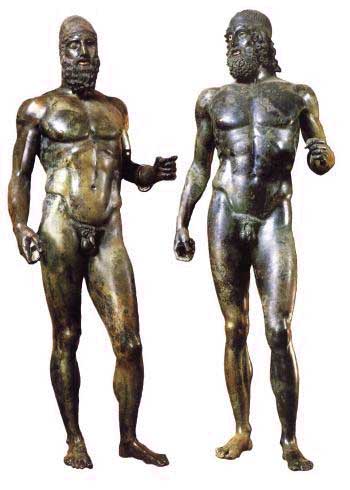

After reading the Prolegomena, please read these Penta Biblia -- these Five Books -- in the order given:
The First Notion of Goodness
Manhood is the first notion of Goodness
The Alphas of Manhood, Manliness, and Manly Spirit
The many permutations and combinations of Manhood and Honor
Primal Love
In the Warrior Kosmos, Manhood is the Primal Love, the Highest Value, Good in itself
UN-forgetting
Un-forgetting and re-collecting -- Manhood
Fight is the Father of All
The Ubiquity of Fighting Manhood
Fighting Manhood is the Father and Author of All
Fighting Manhood and Manly Love
Fighting Manhood and Manly Justice
Fighting Manhood and the Idea of Good
Warrior Kosmos, Warrior Sanction
Ares is Lord : Manhood is God
To be like to God as far as may be
To Seethe and Grow Fierce
To Achieve Manhood through a Martial Order and
Combative Erectness and Aggressive Art
That is Proper and Apportioned to Men
To Fight and Conquer
To Live According to
Reason, not Desire ;
To Be Rich, not in
Money, but in Manhood
To Have as your Judge
No other God or Man
Than A R E S
To Hold in Your Hands
In Boyhood's Flower
Manhood's Power
To Hymn Aright the
Praises of the True
Life of Gods and
Blessed Men
The Imitation of Ares
To Lead Yourself
And Your Beloved
To the Like-ness
Of the God
You Both Honor
Ares is Lord : Manhood is God


Prefatory Note from Bill Weintraub
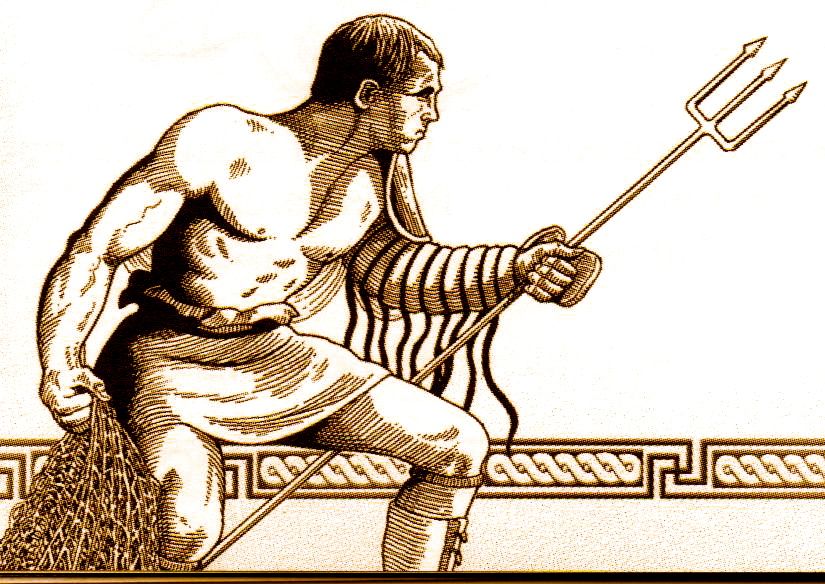
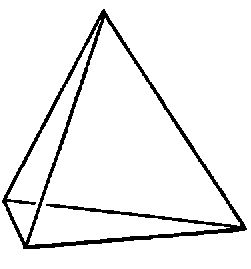
A Tetrahedron has Four sides.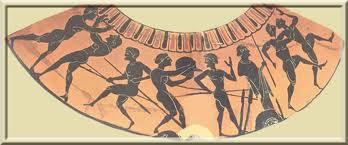
There were Five events in the ancient Greek Pentathlon.
Warrior Kosmos, Warrior Sanction
Ares is Lord : Manhood is God

![]()


After reading the Prolegomena, please read these Penta Biblia -- these Five Books -- in the order given:
The First Notion of Goodness
Manhood is the first notion of Goodness
The Alphas of Manhood, Manliness, and Manly Spirit
The many permutations and combinations of Manhood and Honor
Primal Love
In the Warrior Kosmos, Manhood is the Primal Love, the Highest Value, Good in itself
UN-forgetting
Un-forgetting and re-collecting -- Manhood
Fight is the Father of All
The Ubiquity of Fighting Manhood
Fighting Manhood is the Father and Author of All
Fighting Manhood and Manly Love
Fighting Manhood and Manly Justice
Fighting Manhood and the Idea of Good
Warrior Kosmos, Warrior Sanction
Ares is Lord : Manhood is God
To be like to God as far as may be
To Seethe and Grow Fierce
To Achieve Manhood through a Martial Order and
Combative Erectness and Aggressive Art
That is Proper and Apportioned to Men
To Fight and Conquer
To Live According to
Reason, not Desire ;
To Be Rich, not in
Money, but in Manhood
To Have as your Judge
No other God or Man
Than A R E S
To Hold in Your Hands
In Boyhood's Flower
Manhood's Power
To Hymn Aright the
Praises of the True
Life of Gods and
Blessed Men
The Imitation of Ares
To Lead Yourself
And Your Beloved
To the Like-ness
Of the God
You Both Honor
Ares is Lord : Manhood is God



![]()


After reading the Prolegomena, please read these Penta Biblia -- these Five Books -- in the order given:
The First Notion of Goodness
Manhood is the first notion of Goodness
The Alphas of Manhood, Manliness, and Manly Spirit
The many permutations and combinations of Manhood and Honor
Primal Love
In the Warrior Kosmos, Manhood is the Primal Love, the Highest Value, Good in itself
UN-forgetting
Un-forgetting and re-collecting -- Manhood
Fight is the Father of All
The Ubiquity of Fighting Manhood
Fighting Manhood is the Father and Author of All
Fighting Manhood and Manly Love
Fighting Manhood and Manly Justice
Fighting Manhood and the Idea of Good
Warrior Kosmos, Warrior Sanction
Ares is Lord : Manhood is God
To be like to God as far as may be
To Seethe and Grow Fierce
To Achieve Manhood through a Martial Order and
Combative Erectness and Aggressive Art
That is Proper and Apportioned to Men
To Fight and Conquer
To Live According to
Reason, not Desire ;
To Be Rich, not in
Money, but in Manhood
To Have as your Judge
No other God or Man
Than A R E S
To Hold in Your Hands
In Boyhood's Flower
Manhood's Power
To Hymn Aright the
Praises of the True
Life of Gods and
Blessed Men
The Imitation of Ares
To Lead Yourself
And Your Beloved
To the Like-ness
Of the God
You Both Honor
Ares is Lord : Manhood is God



![]()



![]()



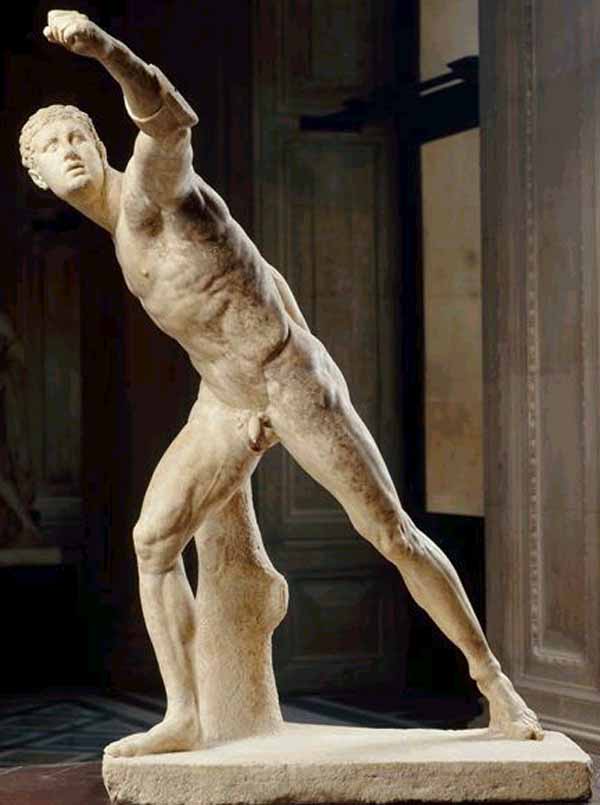

A few men of the Companion calvary [hoi hetairoi -- a crack regiment] had been left behind sick in Zariaspa, and among them were Sosicles' son, Peitho, who had charge of all arrangements for the King's personal comfort in that town, and the harp-player, Aristonicus.
45. Because of his heroism Alexander had a bronze statue of him erected at Delphi, holding his lyre and a leveled spear (Plutarch, Moralia, 334f).
From the same root [ARES] comes areté ... the first notion of goodness being that of manhood, bravery in war; cf. Lat. virtus.
goodness, excellence, of any kind, esp. of manly qualities, manhood, valour, prowess, Hom., Hdt. (like Lat. vir-tus, from vir).



![]()

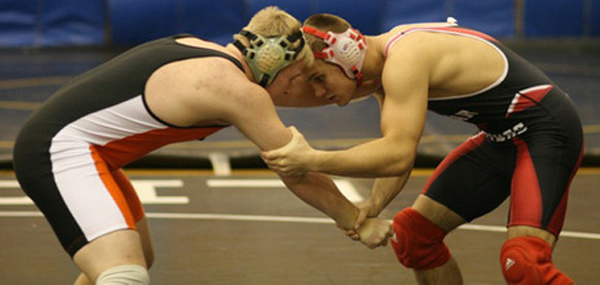

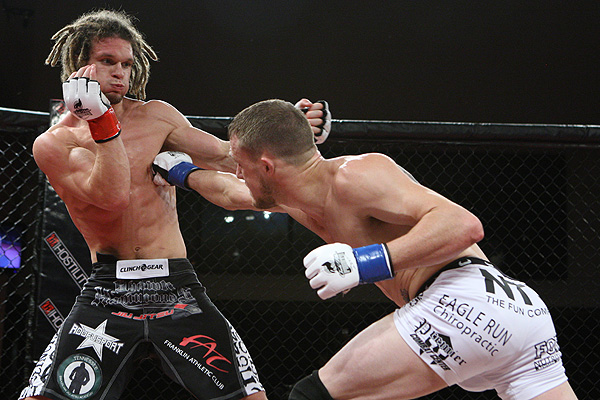
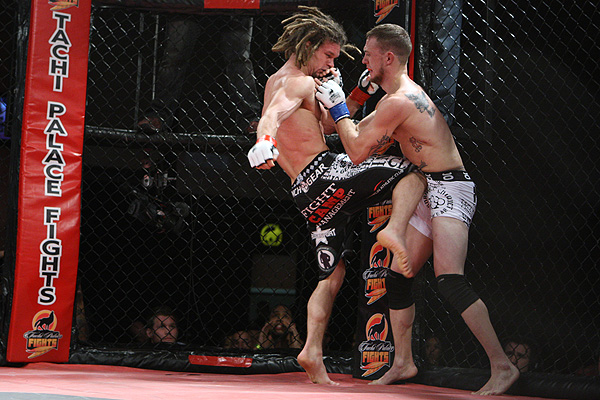
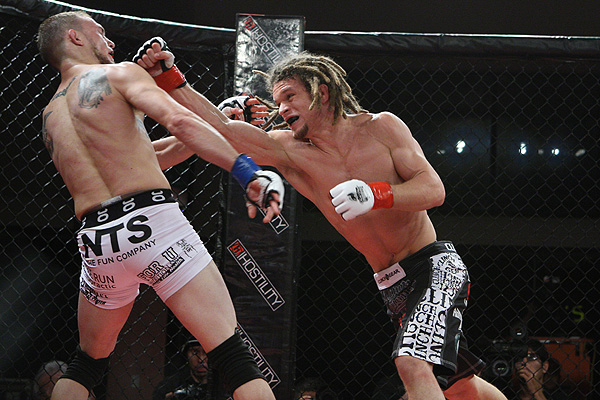
When the boys reach an age when they are no longer soft and
uncoordinated, we strip them naked. We do this because first, we think
they should get used to the weather, learning to live with different
seasons, so they are not bothered by the heat nor do they yield to the
cold. Then we massage them with olive oil and condition the skin. For
since we see that leather which is softened by olive oil does not
easily crack and is much stronger, even though it is not alive, why
should we not think that live bodies would benefit from oil? Next we
have thought up different kinds of athletics and have appointed
coaches for each type. We teach one how to box, another how to compete
in the pankration, so that they can become used to hard work, to stand
up to blows face to face, and not to yield through fear of injury.
lack of courage in the face of war or physical danger
Demosthenes' father died when he was seven, and left him a considerable inheritance
[B]ecause he was delicate and physically under-developed, his mother discouraged him from training in the wrestling-school and his tutors did not press him to attend it. He was a skinny and sickly child from the beginning, and his companions made fun of his puny physique by christening him Batalus. According to one account, Batalus was an effeminate flute-player, who was caricatured in a farce by the poet Antiphanes. Another story has it that Batalus was a poet who wrote voluptuous lyrics and drinking-songs, and yet another that the word was used as slang at that time for the anus.
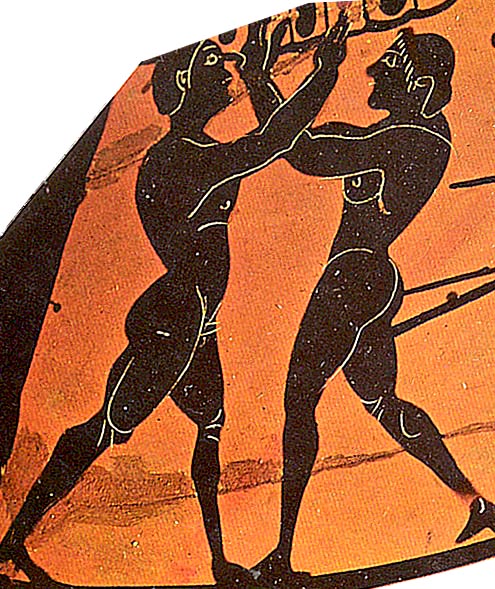
when you fight another dude in the school yard, on the street, in the fight school, on the wrestling mat, YOU BECOME A MAN. It is THAT simple.
Alexander ordered to be made and set up at Delphi a bronze statue of him, with lyre in hand and spear advanced
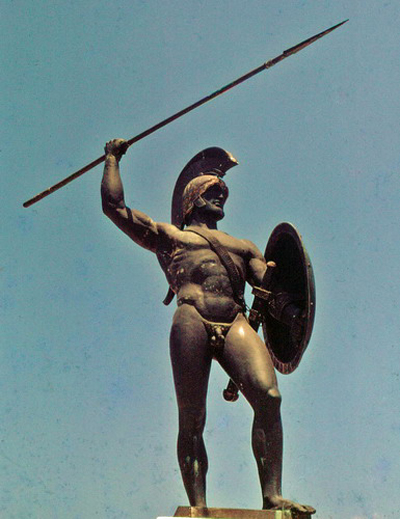


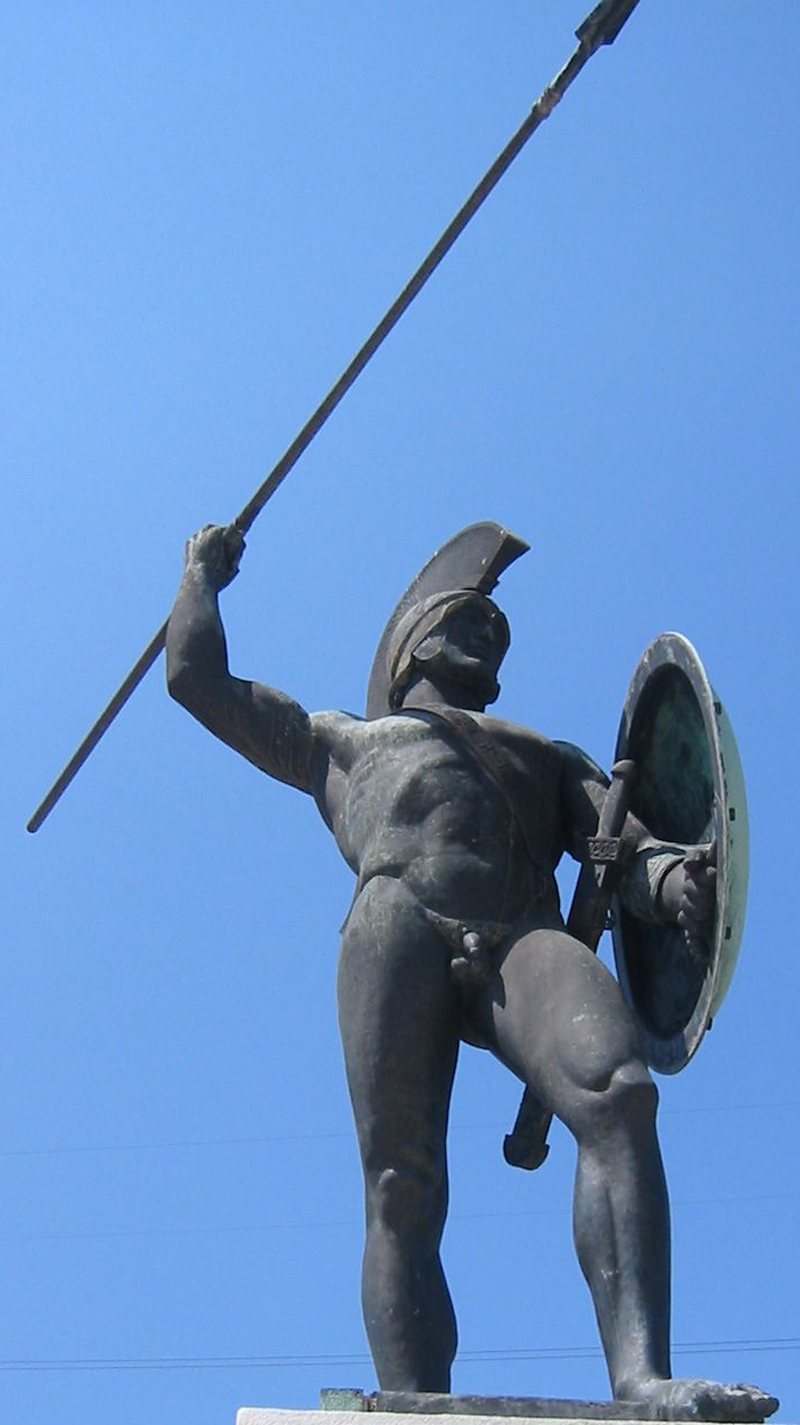
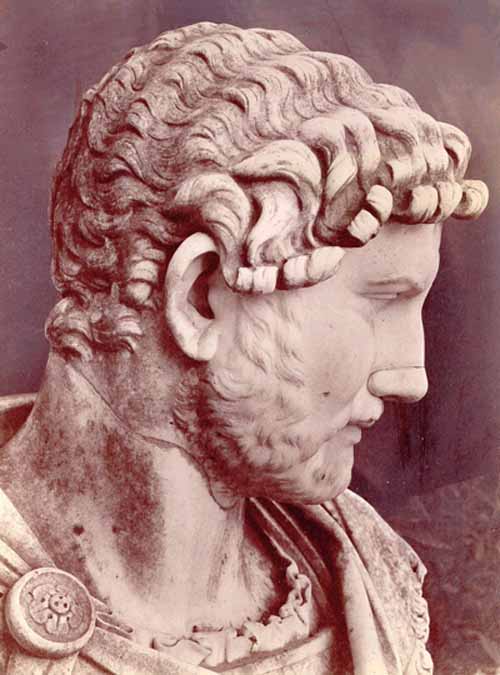
Hadrian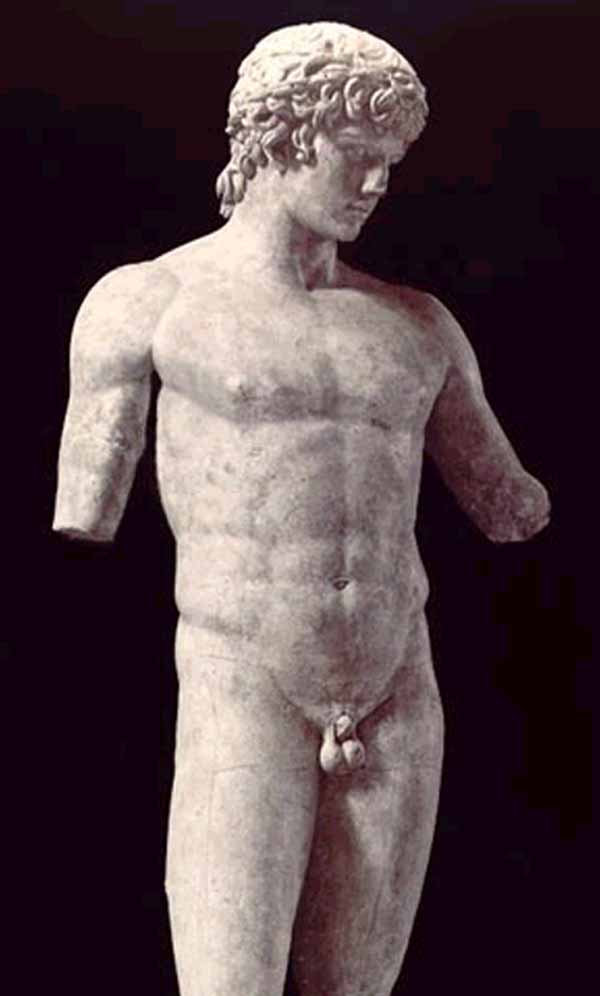
Antinous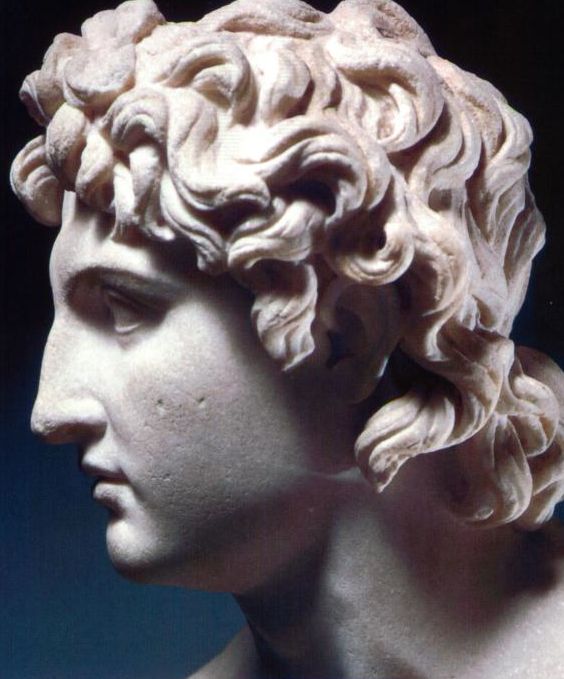
Alexander
We are told by Nearchus that he was annoyed with some of his friends, who blamed him for exposing himself in advance of his men and taking risks that no commander ought to take; and I fancy that his resentment was due to the fact that he was well aware that their criticism was justified. The truth is that he was fighting mad, and such was his passion for glory [timé] that he had not the strength of mind, when there was action afoot, to consider his personal safety; the sheer pleasure of battle, as other pleasures are to other men, was irresistable. Nearchus goes on to say that a Boeotian soldier, an oldish man whose name he does not mention, aware of Alexander's resentment at his friends' criticism and observing the glum expression on his face, came and said to him, in his rustic dialect, 'Action is a man's job, my lord'; and then quoted a line of verse -- something to the effect that 'he who acts bravely must expect his meed of suffering.' The fellow's stock went up immediately, and from that time on he enjoyed Alexander's warm approval.
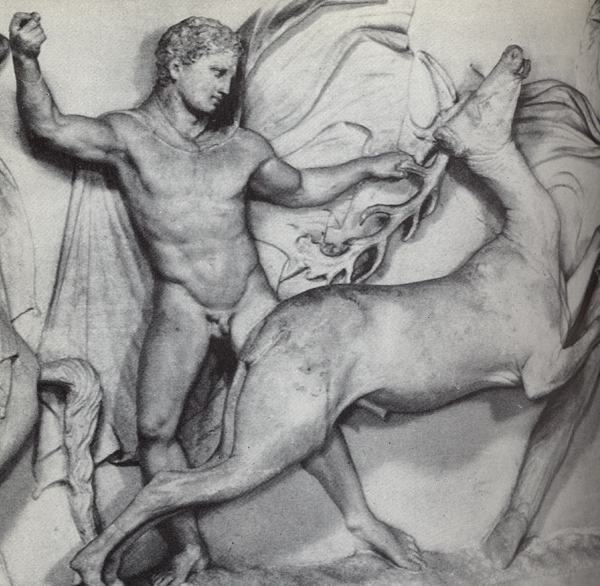
Alexander in Action: Fighting a Stag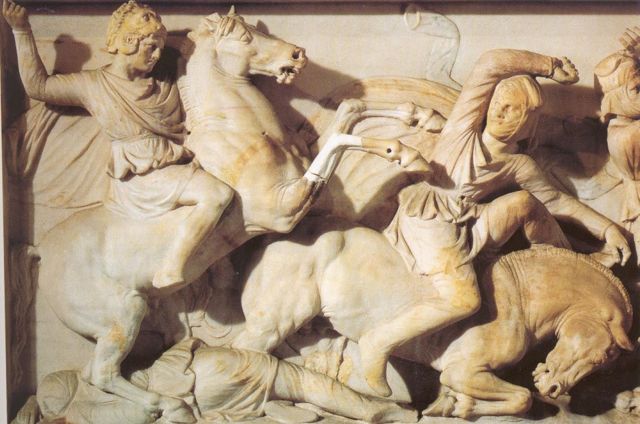
Alexander in Action: Fighting the Persians
as he Fights both the stag and the Persian.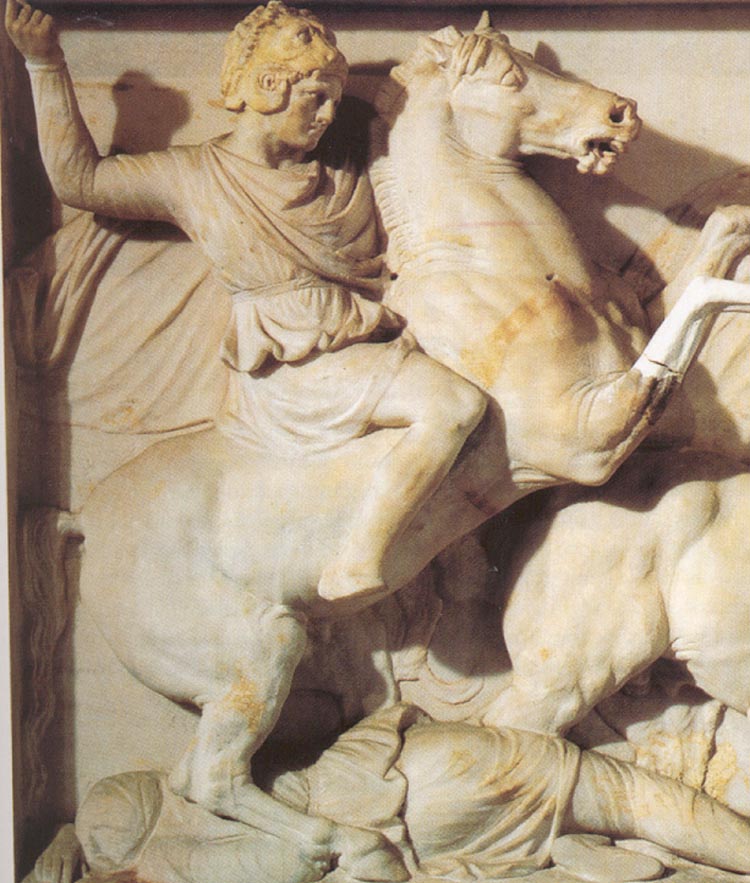













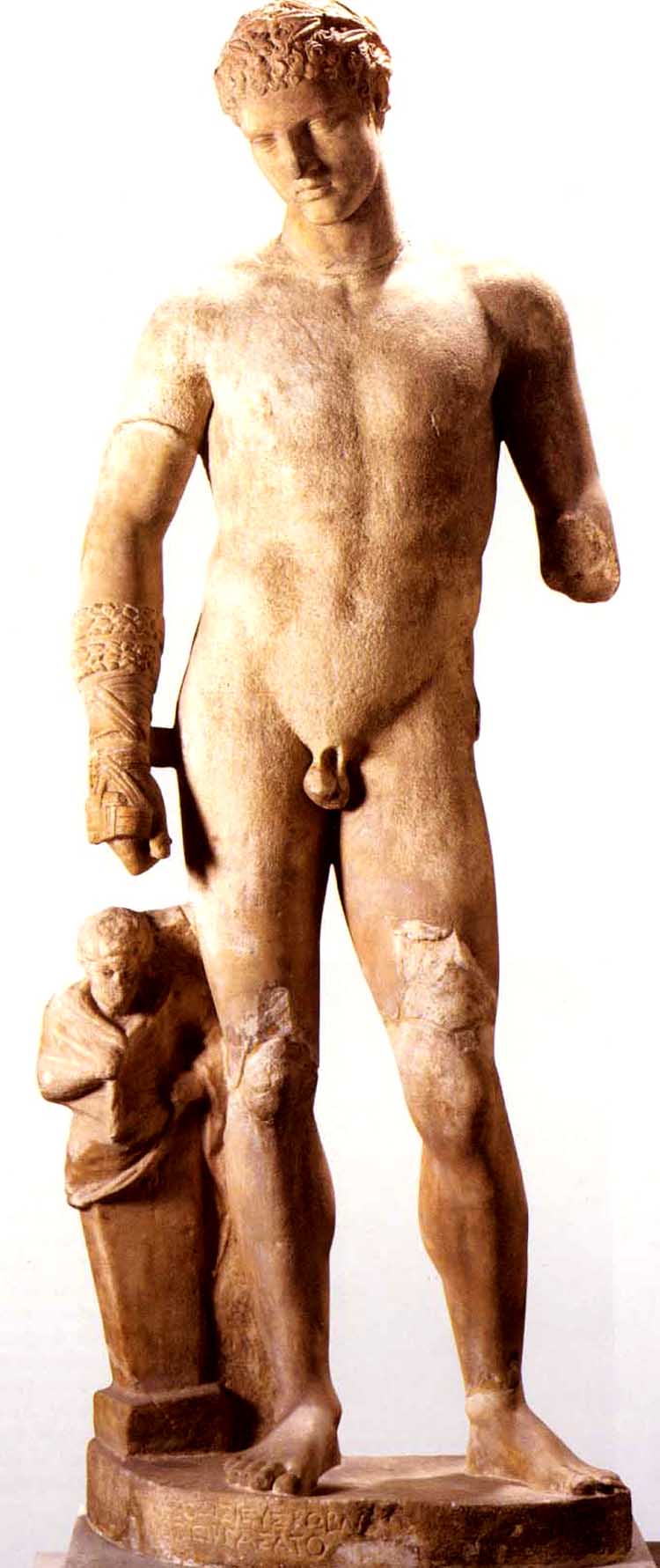

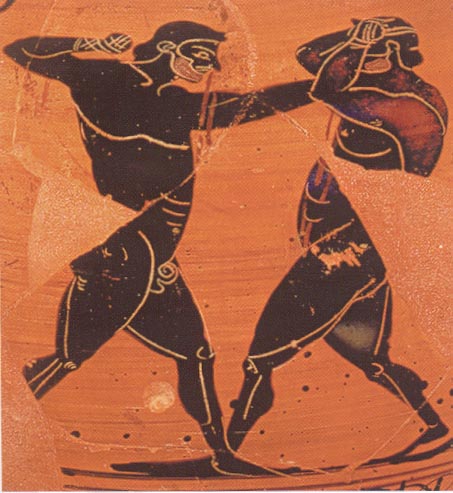
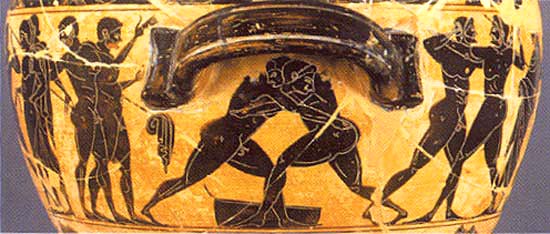
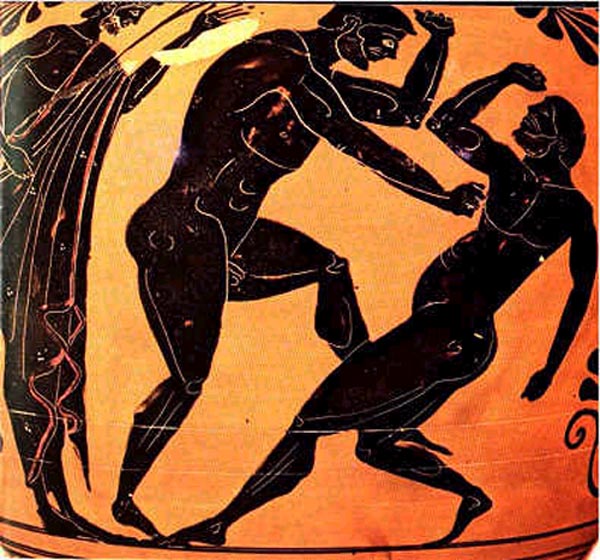
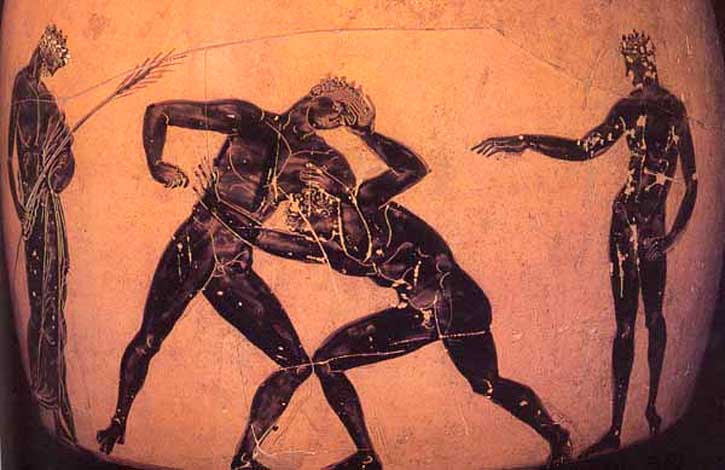
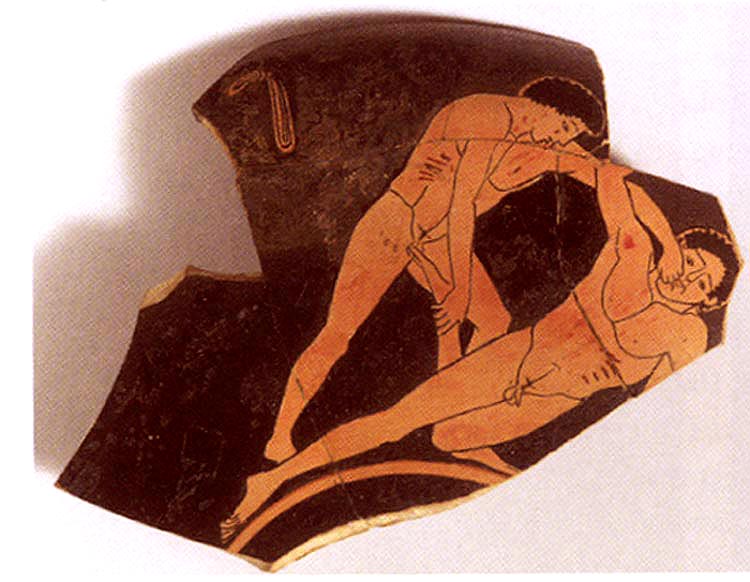
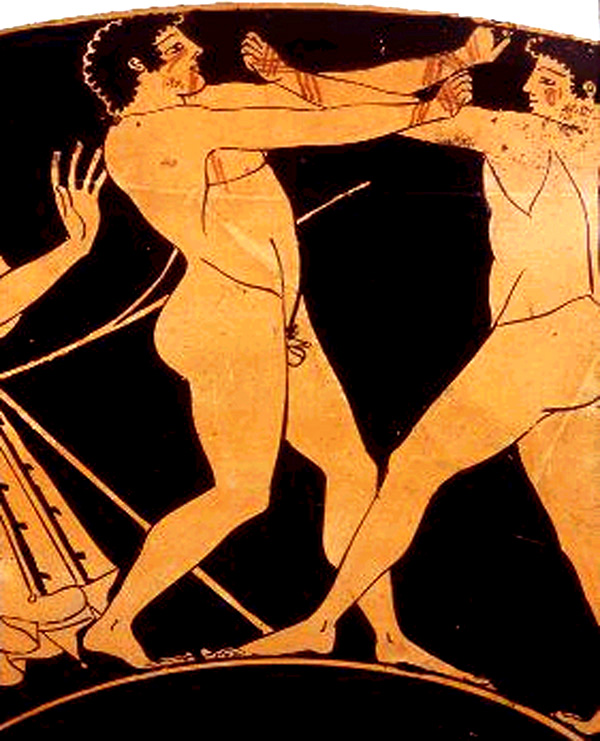

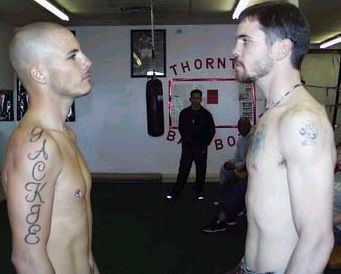
This son of Phocion's, we are told, turned out to be a man of little worth in most respects. On one occasion he had fallen in love with a girl who earned her living in a brothel. He happened to have heard a discussion in the Lyceum in which Theodorus the atheist had put forward the argument that if there is no disgrace in ransoming a man with whom you are in love, the same should be true of a woman; if the principle applies to a comrade, it applies equally to a mistress. At any rate, he determined to use the argument to justify his passion, and so bought the girl's freedom.
if there is no disgrace in ransoming a man with whom you are in love, the same should be true of a woman; if the principle applies to a comrade, it applies equally to a mistress.
if there is no disgrace in ransoming a man [philos] with whom you are in love,
[The Greeks] did not consider male-male relations incompatible with concurrent male-female relations or with marriage...
[L]egends suggest that Lycurgus derived many of his legislative ideas from Cretan practice. If this is so, the Spartan [military] tribe may initially have been divided into hetaireiai ("bands of comrades"), as was the case in Crete until the Hellenistic period.
his passion leading him to think the argument sound
Now later writers observe that the ancient Athenians used to cover up the ugliness of things with auspicious and kindly terms, giving them polite and endearing names.

[Alexander] severely rebuked Hagnon also for writing to him that he wanted to buy Crobylus, whose beauty was famous in Corinth, as a present for him. Furthermore, on learning that Damon and Timotheus, two Macedonian soldiers under Parmenio's command, had ruined the wives of certain mercenaries, he wrote to Parmenio ordering him, in case the men were convicted, to punish them and put them to death as wild beasts born for the destruction of mankind.
"And don't you agree that the one who wins the prize of valor [aristeuo] and distinguishes himself shall first be crowned by his fellows in the campaign, by the lads and boys each in turn?" "I do." "And be greeted with the right hand?" "That, too." "But I presume you wouldn't go as far as this?" "What?" "That he should kiss and be kissed by everyone?" "By all means," he said, "and I add to the law the provision that during that campaign none whom he wishes to kiss be allowed to refuse, so that if one [he] is in love with anyone, male [arren] or female, he may be the more eager to win the prize."
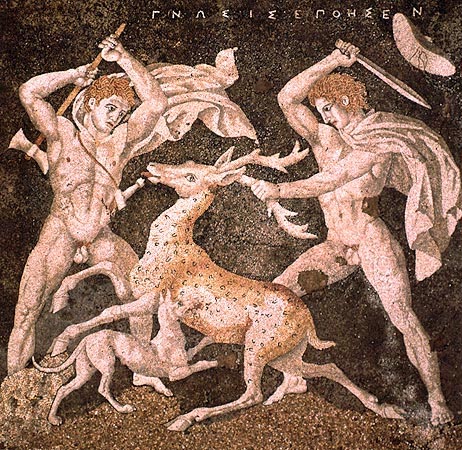
Hephaestion and Alexander hunt a stag


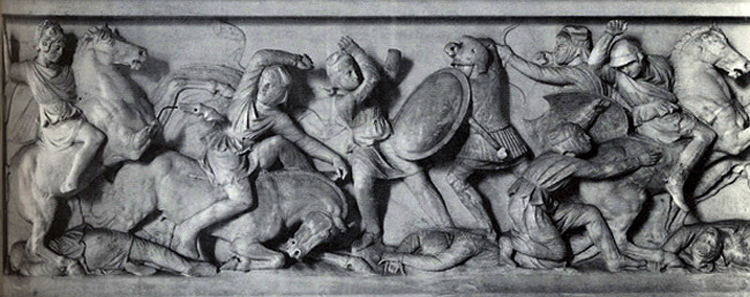
Alexander, on horseback, on the left ; and Hephaestion, on horseback, on the right -- battle the Persians.



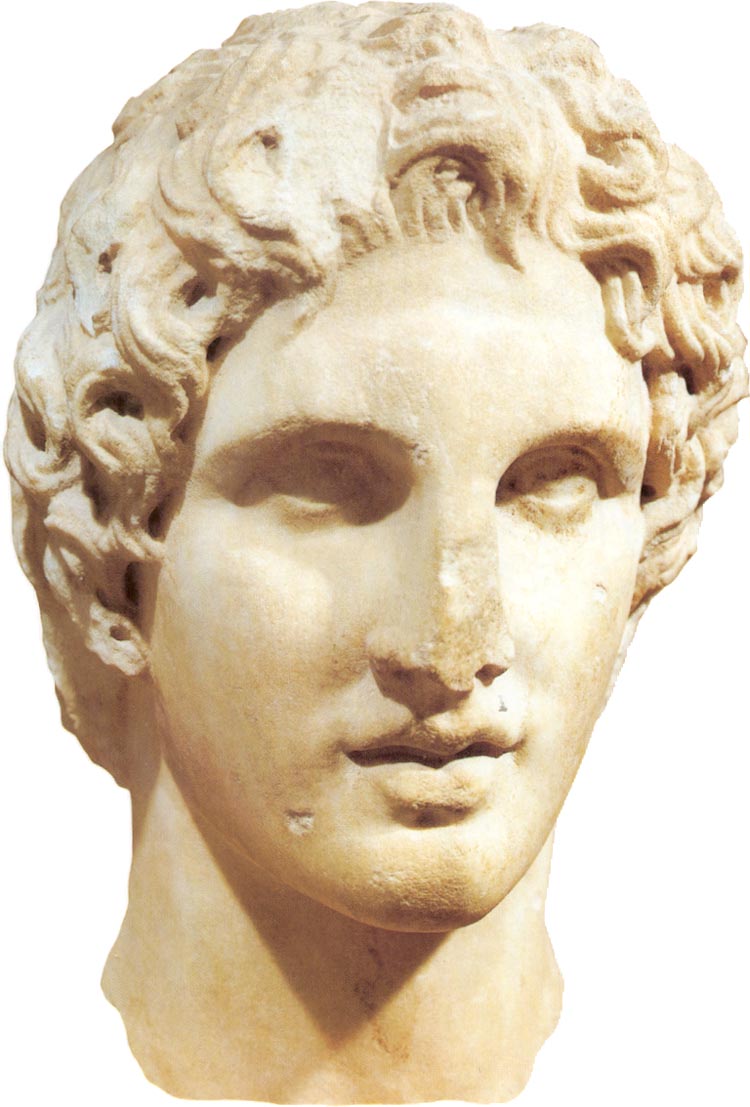
Alexander died in the 114th Olympiad, in the archonship of Hegesias at Athens. He lived, as Aristobulus tells us, thirty-two years and eight months, and reigned twelve years and eight months. He had great personal beauty, invincible power of endurance, and a keen intellect; he was brave and adventurous, strict in the observance of his religious duties, and hungry for fame. Most temperate in the pleasures of the body, his passion was for glory only, and in that he was insatiable. He had an uncanny instinct for the right course in a difficult and complex situation, and was most happy in his deductions from observed facts. In arming and equipping troops, and in his military dispositions, he was always masterly. Noble indeed was his power of inspiring his men, of filling them with confidence, and, in the moment of danger, of sweeping away their fear by the spectacle of his own fearlessness. When risks had to be taken, he took them with the utmost boldness, and his ability to seize the moment for a swift blow, before his enemy had any idea of what was coming, was beyond praise. No cheat or liar ever caught him off his guard, and both his word and his bond were inviolable. Spending but little on his own pleasures, he poured out his money without stint for the benefit of his friends.
I'm too scared to come out. I love women too and I want to be a father and raise kids one day but my heart seems torn between this drive in me to he with another man. It's a thrill. I want to have that special guy to be my best friend and male lover but still be faithful to my future wife. I don't think that is possible because in marriage your supposed to be faithful to one person and only that person right?




Lycurgus [the Spartan law-giver] did not put Spartiate children in the care of any tutors who had been bought or hired. Neither was it permissible for each father to bring up and educate his son in the way he chose.



Sparta was supreme in andreia.
At Sparta lover and beloved stood beside each other in the hoplite line; before battle the Spartans sacrificed to Eros, to love.
such relationships were institutionalized, played a large role in the training of boys, and were thought to contribute to bravery in combat.
[male-male] relationships were institutionalized, played a large role in the training of boys, and were thought to contribute to bravery in combat.
The Spartan state deliberately made Eros a factor, and an important factor, in its agogé.
[Among the girls, Lycurgus] did away with prudery, sheltered upbringing and effeminacy [such as make-up and long hair] of any kind. He made young girls no less than young men grow used to walking nude in processions, as well as to dancing and singing at certain festivals with the young men present and looking on. On some occasions the girls would make fun of each of the young men, helpfully criticizing their mistakes. On other occasions they would rehearse in song the praises which they had composed about those meriting them, so that they filled the youngsters with a great sense of ambition and rivalry. For the one who was praised for his manliness and became a celebrated figure to the girls went off priding himself on their compliments; whereas the jibes of their playful humour were no less cutting than warnings of a serious type, especially as the kings and the Elders attended the spectacle along with the rest of the citizens.
I mean the processions of girls, and the nudity, and the competitions which the young men watched, attracted by a compulsion not of an intellectual type, but (as Plato says) a sexual one.
After spending only a short time with her, he would depart discreetly so as to sleep wherever he usually did along with the other young men. And this continued to be his practice thereafter: while spending the days with his contemporaries, and going to sleep with them, he would warily visit his bride in secret, ashamed and apprehensive in case someone in the house might notice him. His bride at the same
time devised schemes and helped to plan how they might meet each other unobserved at suitable moments. It was not just for a short period that young men would do this, but for long enough that some might even have children before they saw their own wives in daylight.
adopt the idea of the homosexual as a physical "species" different
from the heterosexual. But there are no convincing historical grounds
for this view.
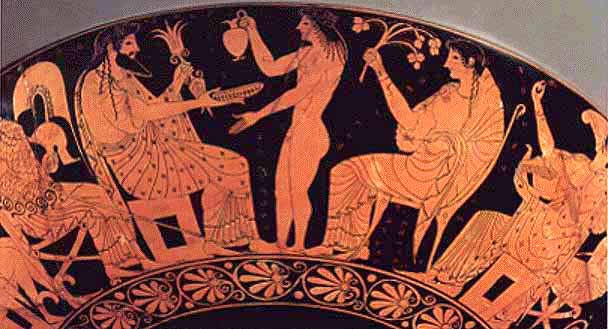
Neither "homosexual" nor "heterosexual":
Zeus, King of the Gods,
with his wife Hera -- and
his male lover Ganymedes
Contrary to today's bio-belief, the heterosexual/homosexual binary is not in nature, but is socially constructed, therefore deconstructable.
We should be calling humans bisexual because this idea of exclusive homosexuality is not accurate of people. Homosexuality is mixed in with heterosexuality across cultures and history.
Animals don't do sexual identity. They just do sex.

Wherever and whenever the homosexual [sic] ethos of the Greek world originated, the simple answer to the question 'Why were the Athenians of Plato's time so fond of homosexual [sic] relations?' is 'Because their fathers and grandfathers were'.



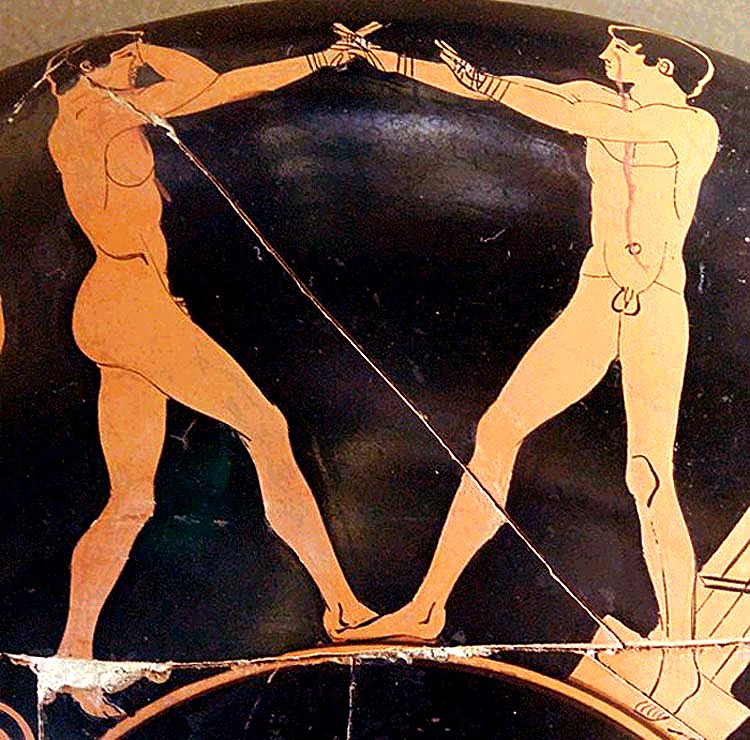





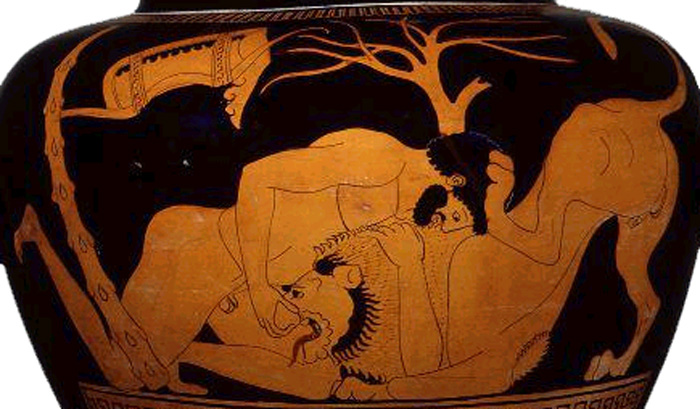
The Hero Herakles Fights the Nemean Lion




Boxers Fight Nude




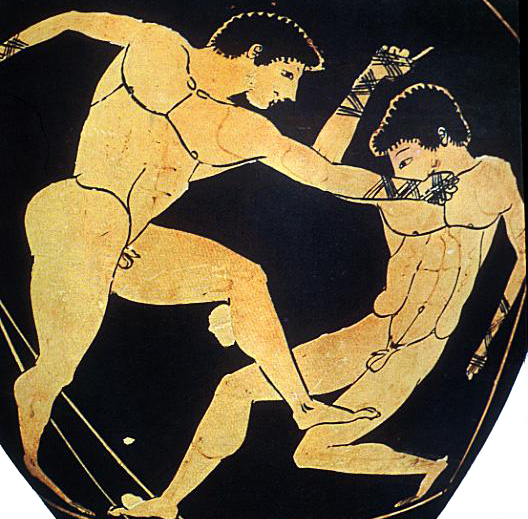
Boxers Fighting Nude:
Their Testicles are Clearly and Openly Displayed




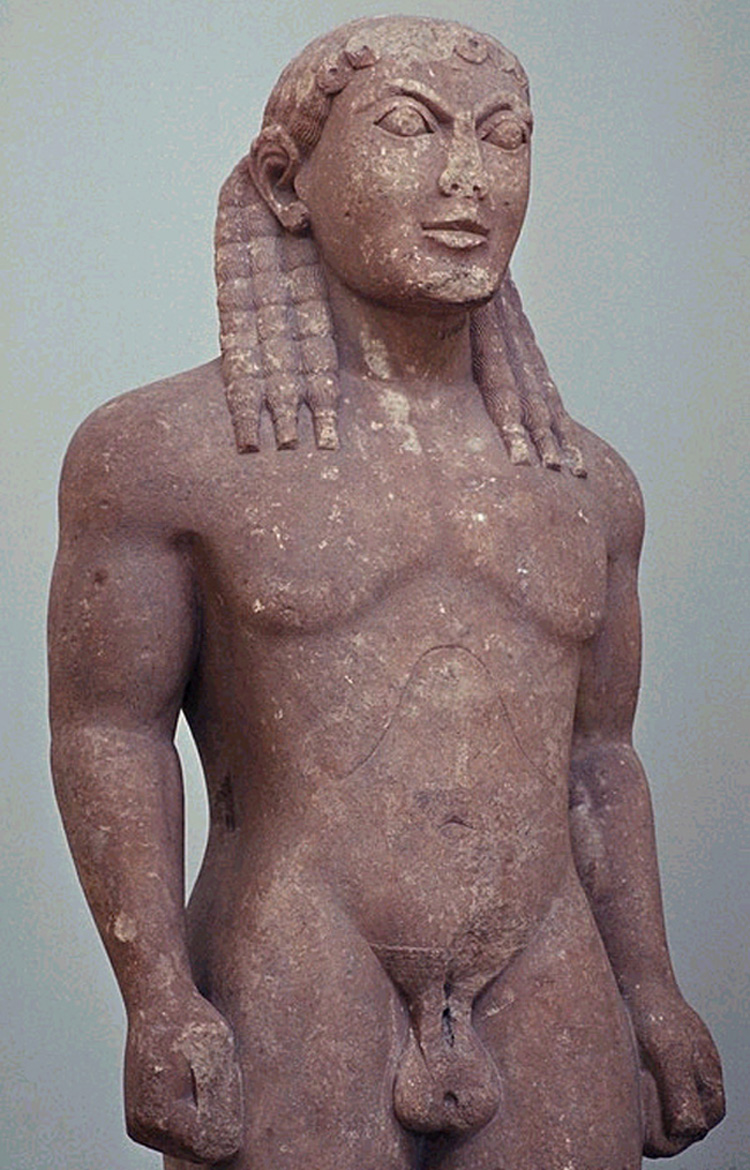
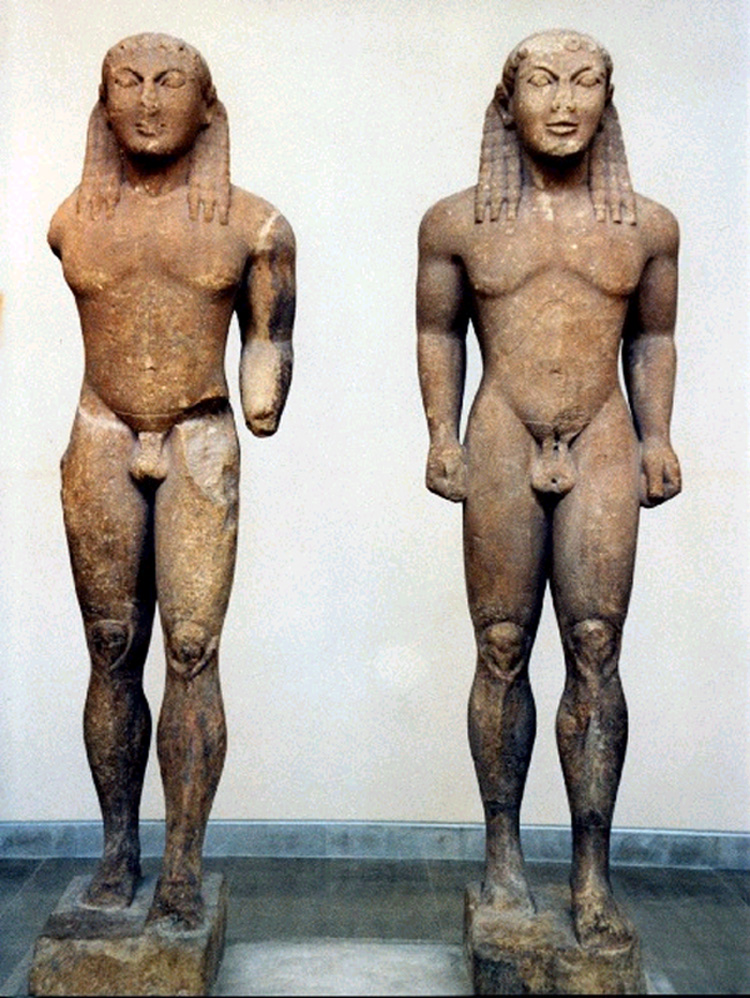
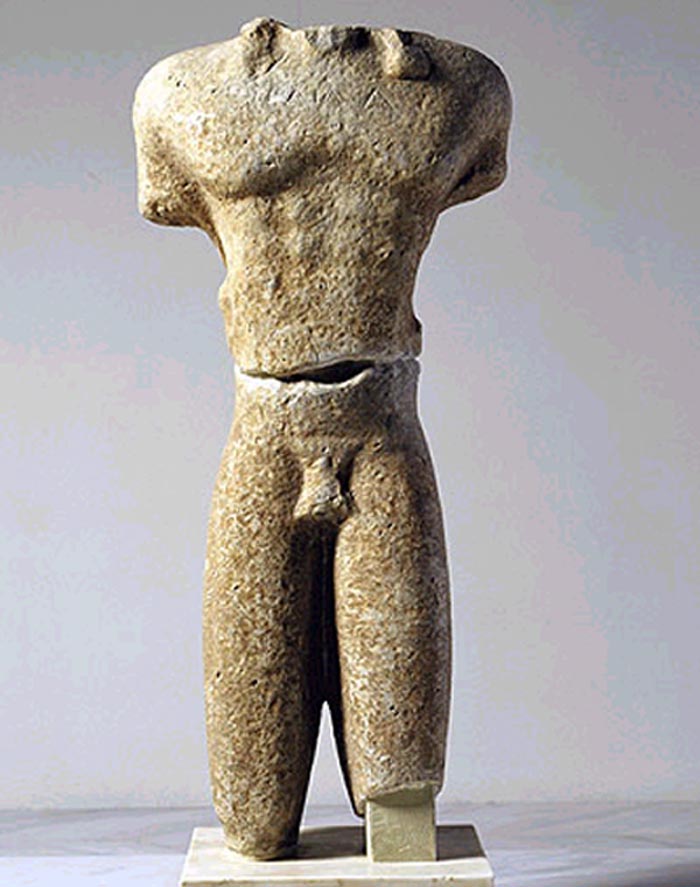
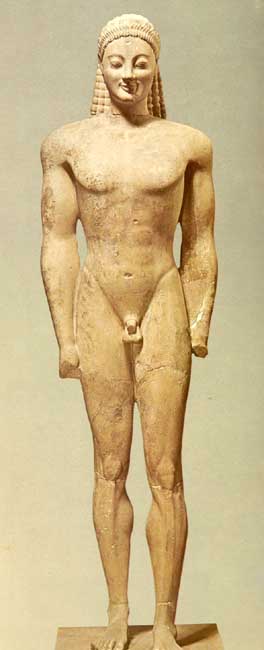
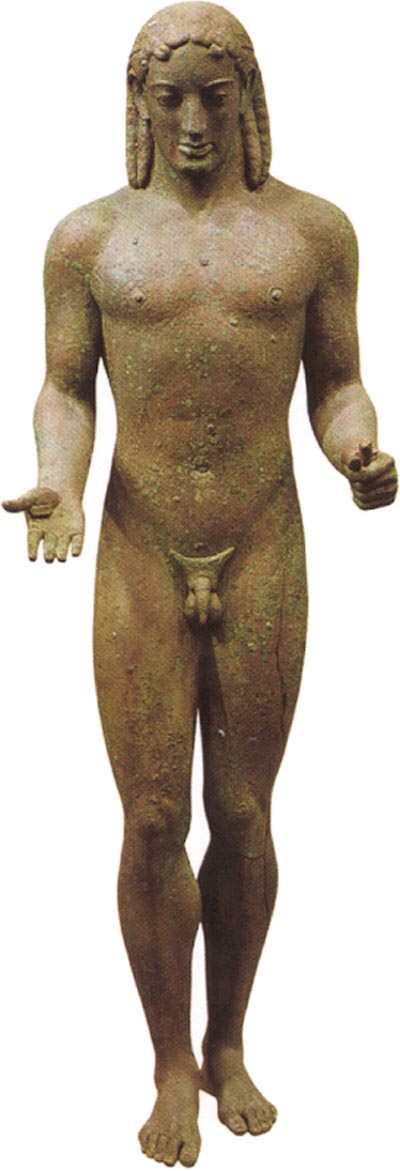
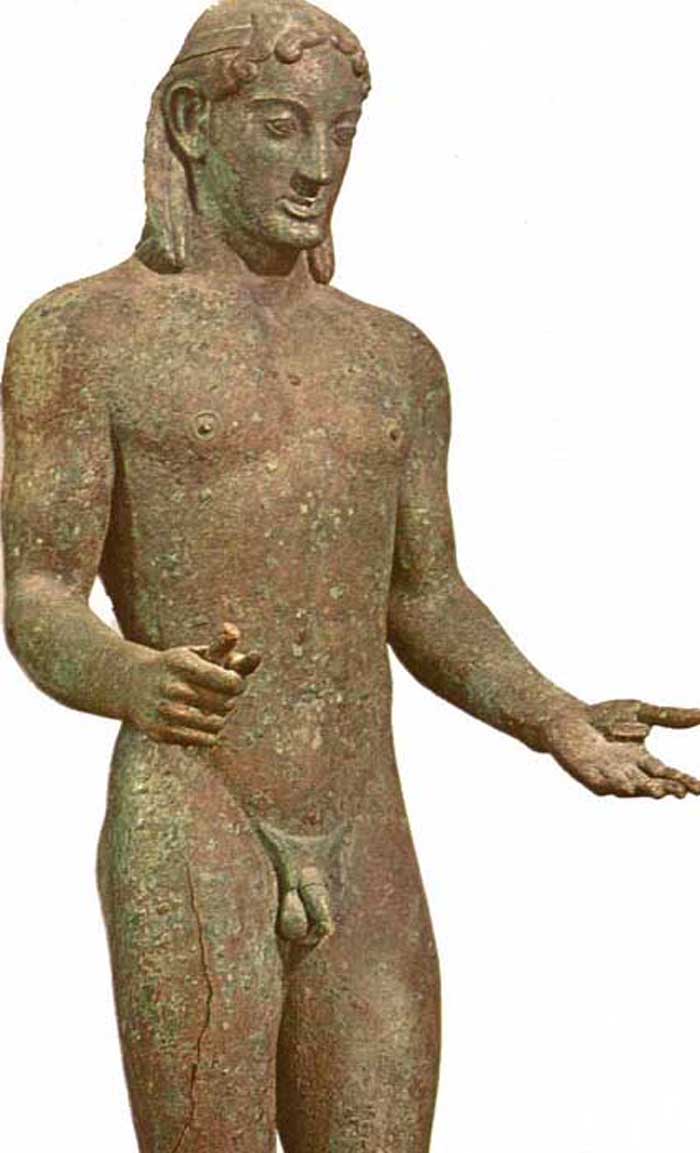
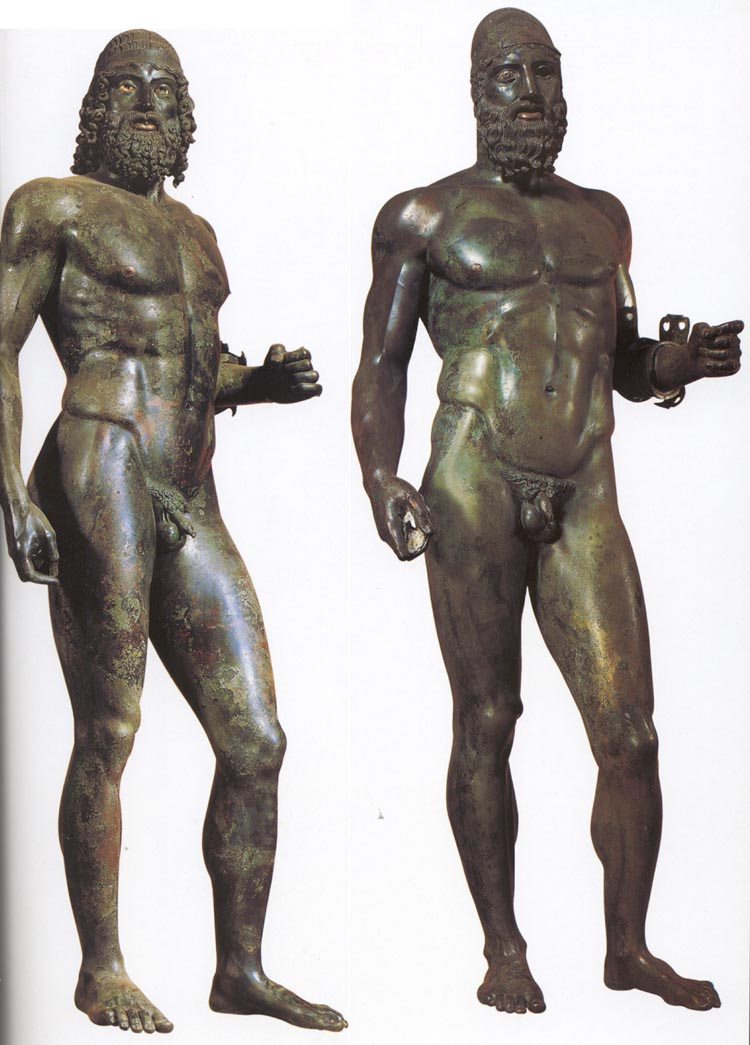
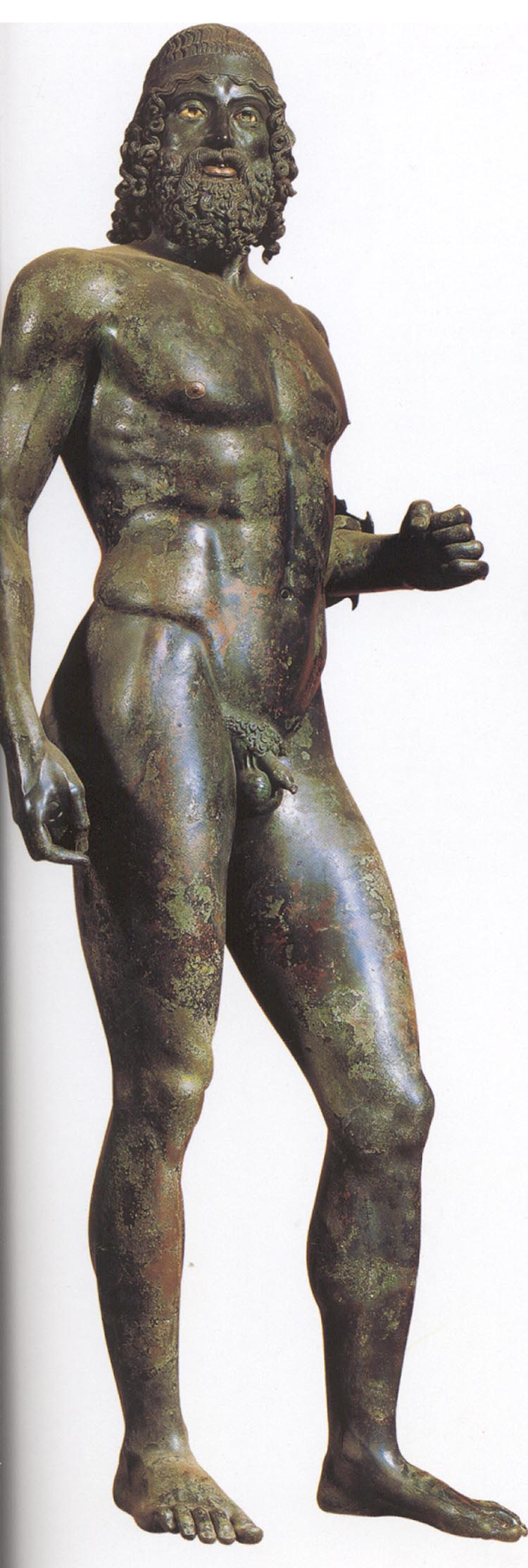
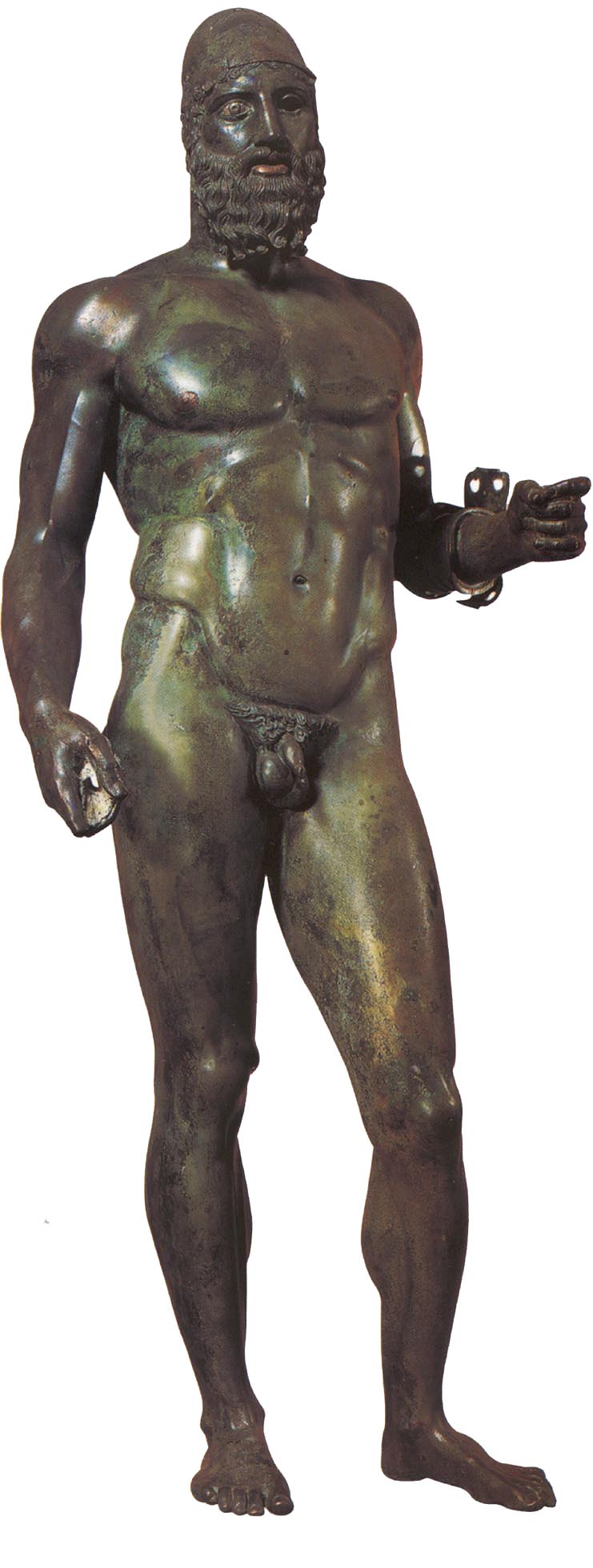
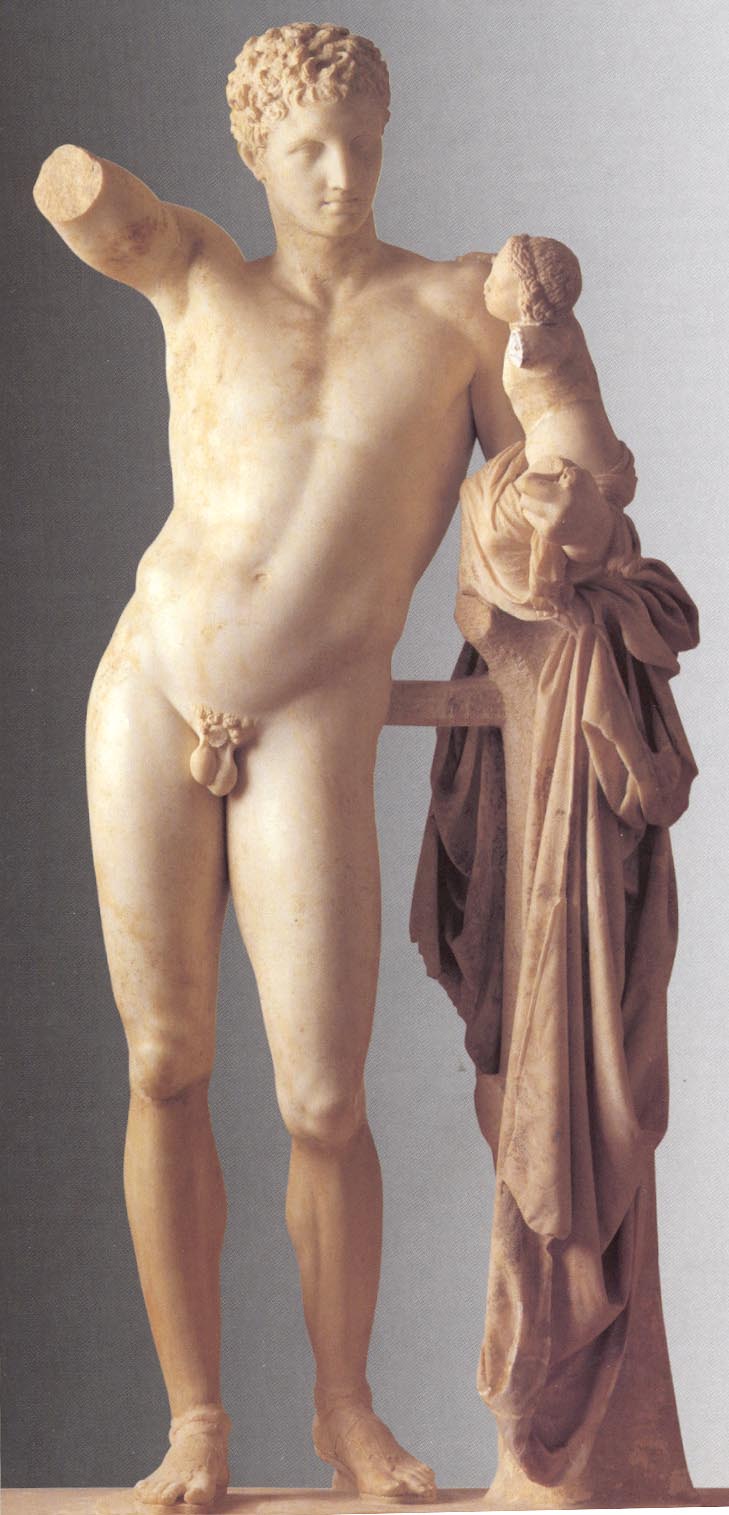
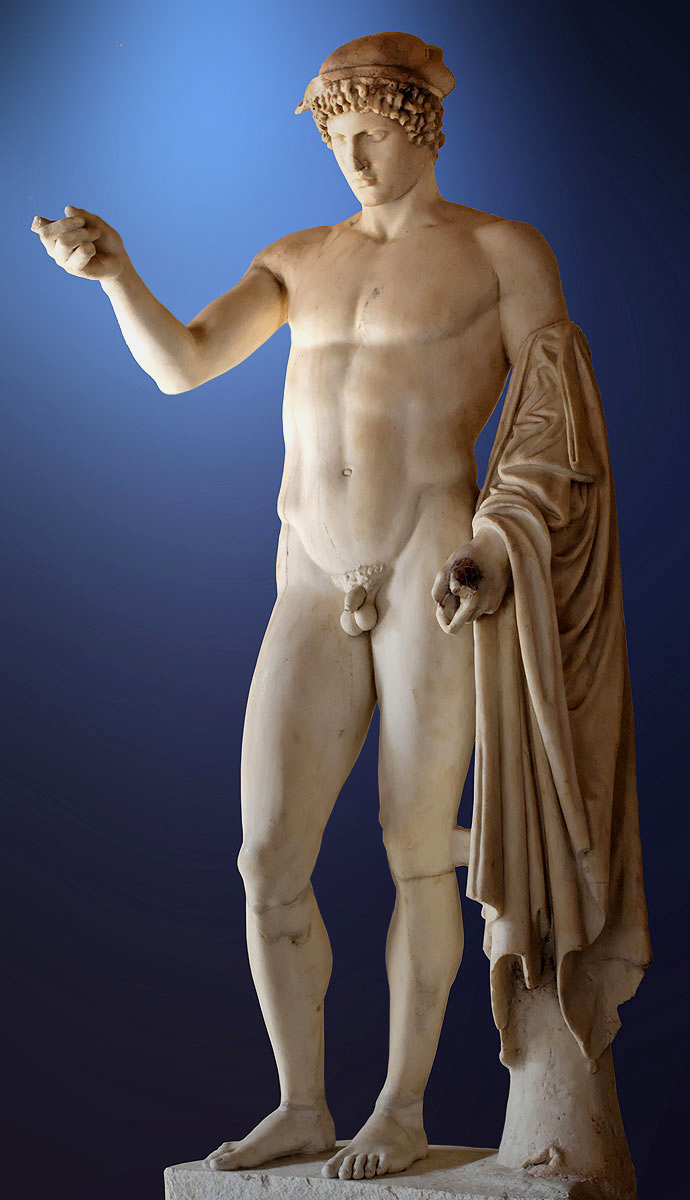
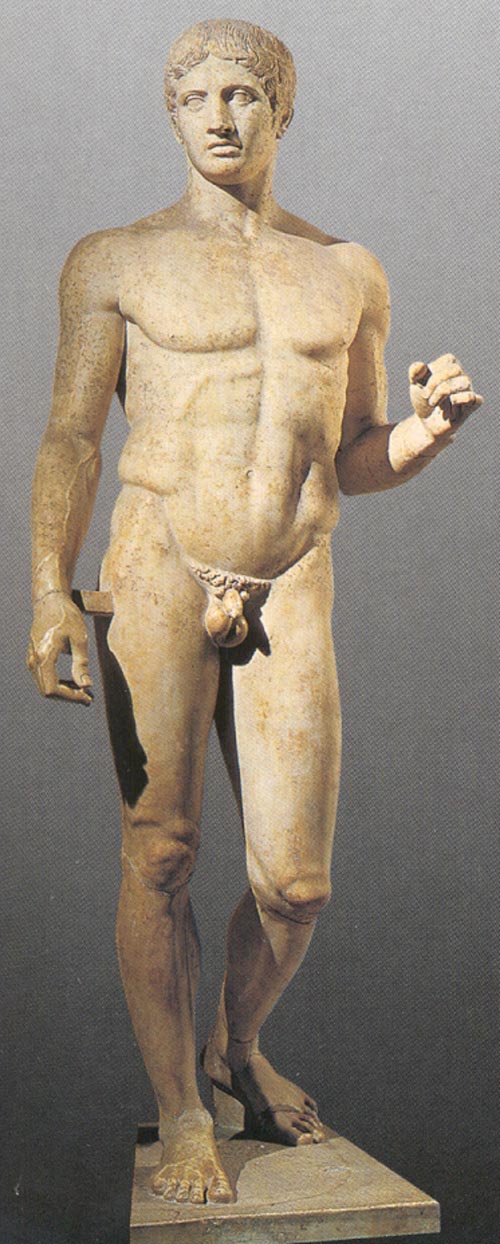
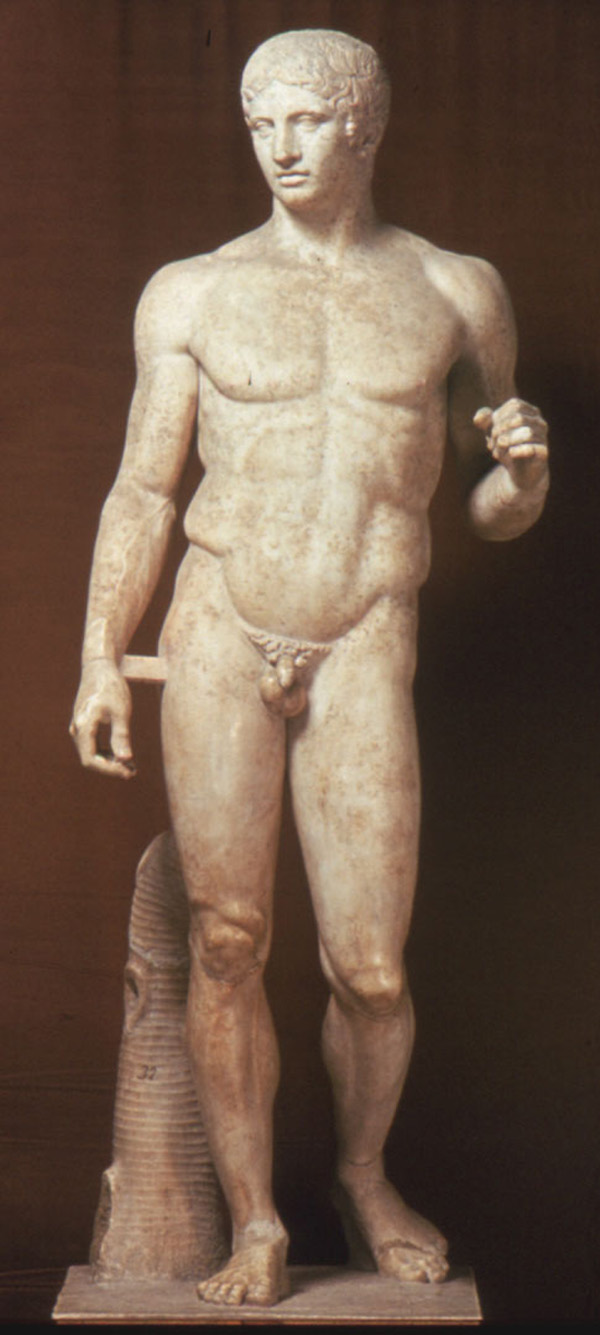
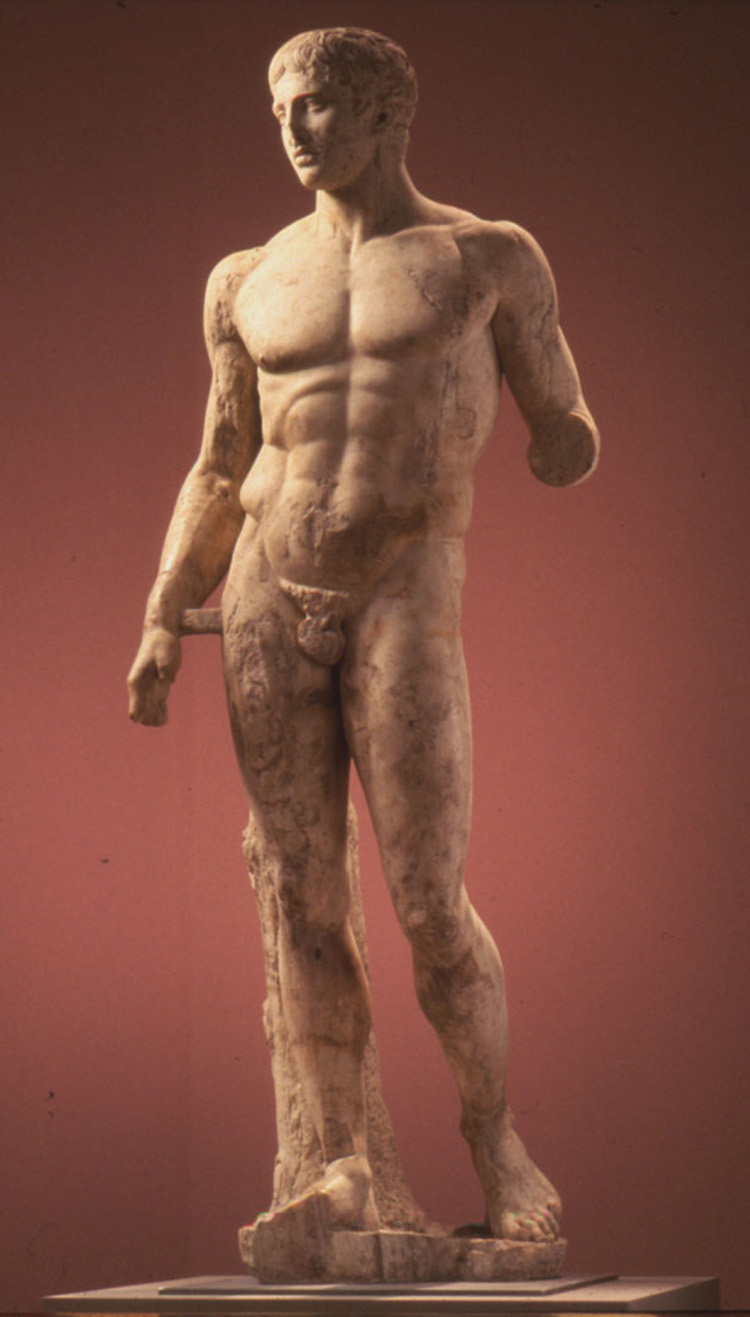
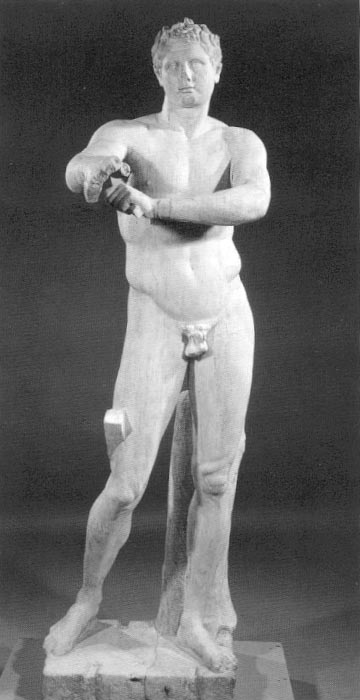
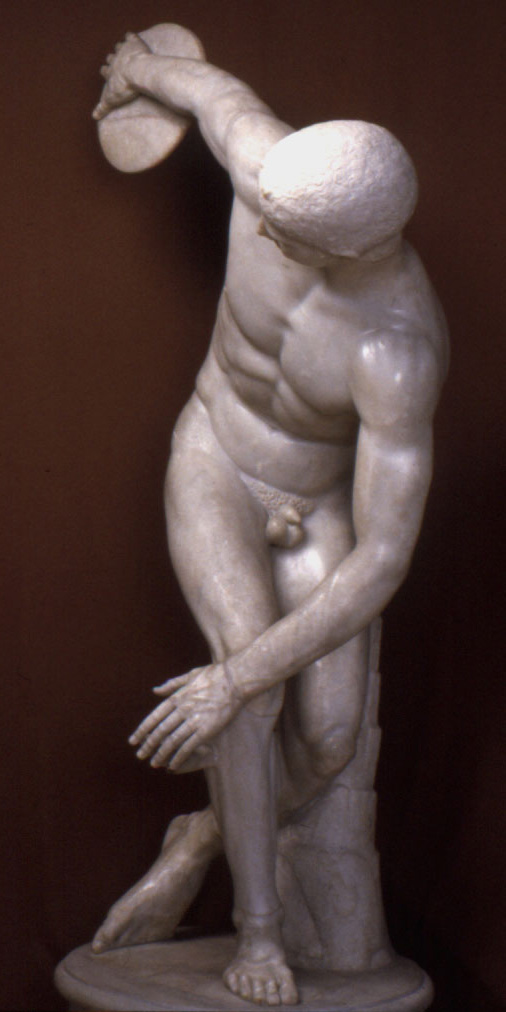
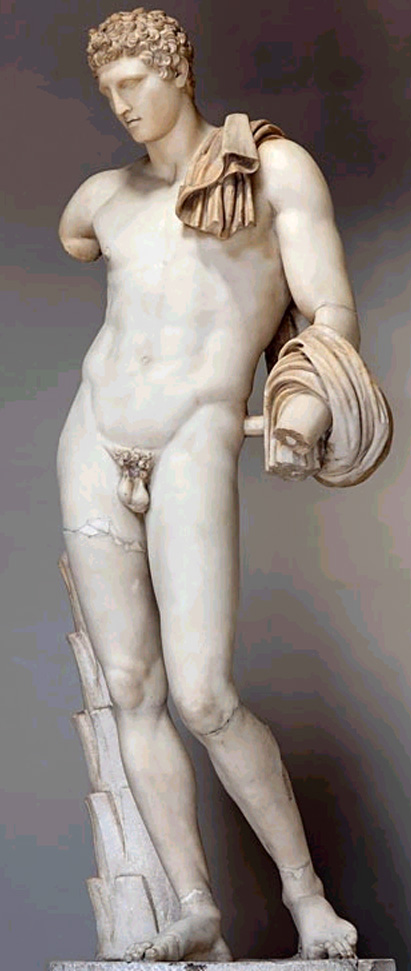
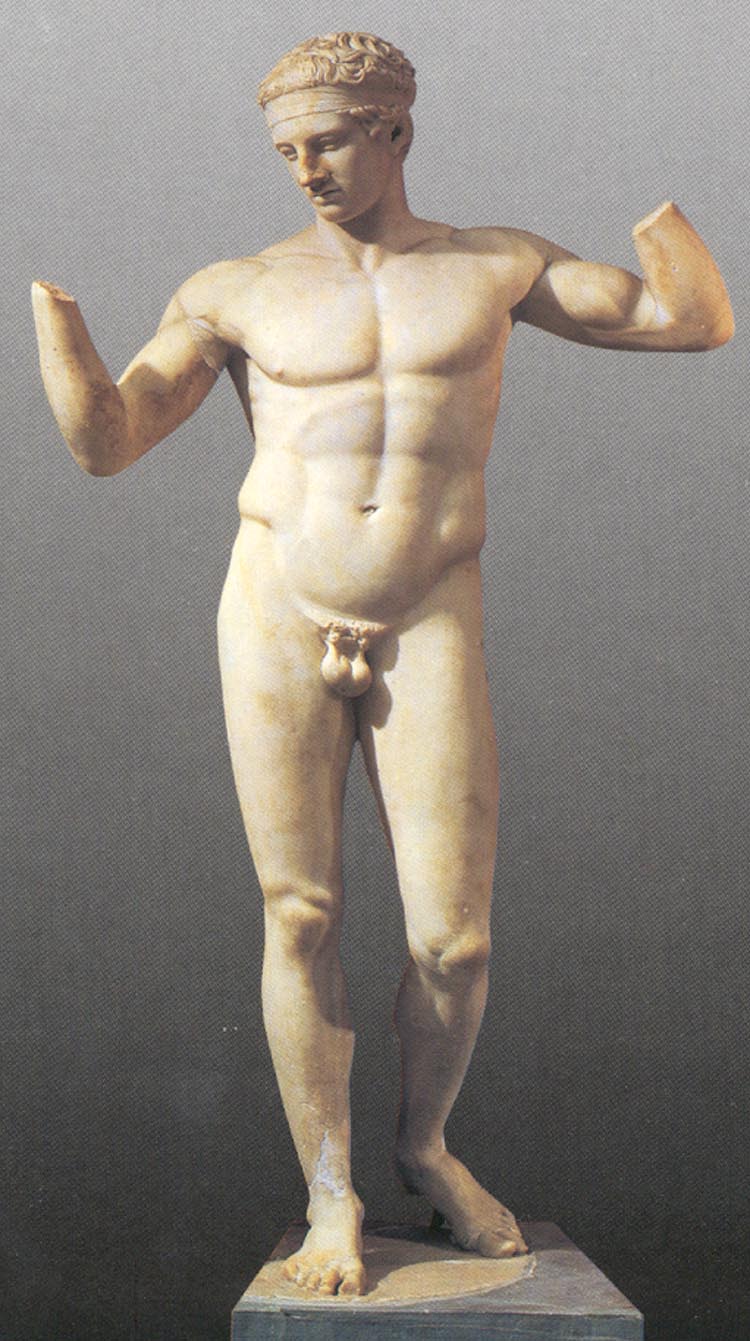
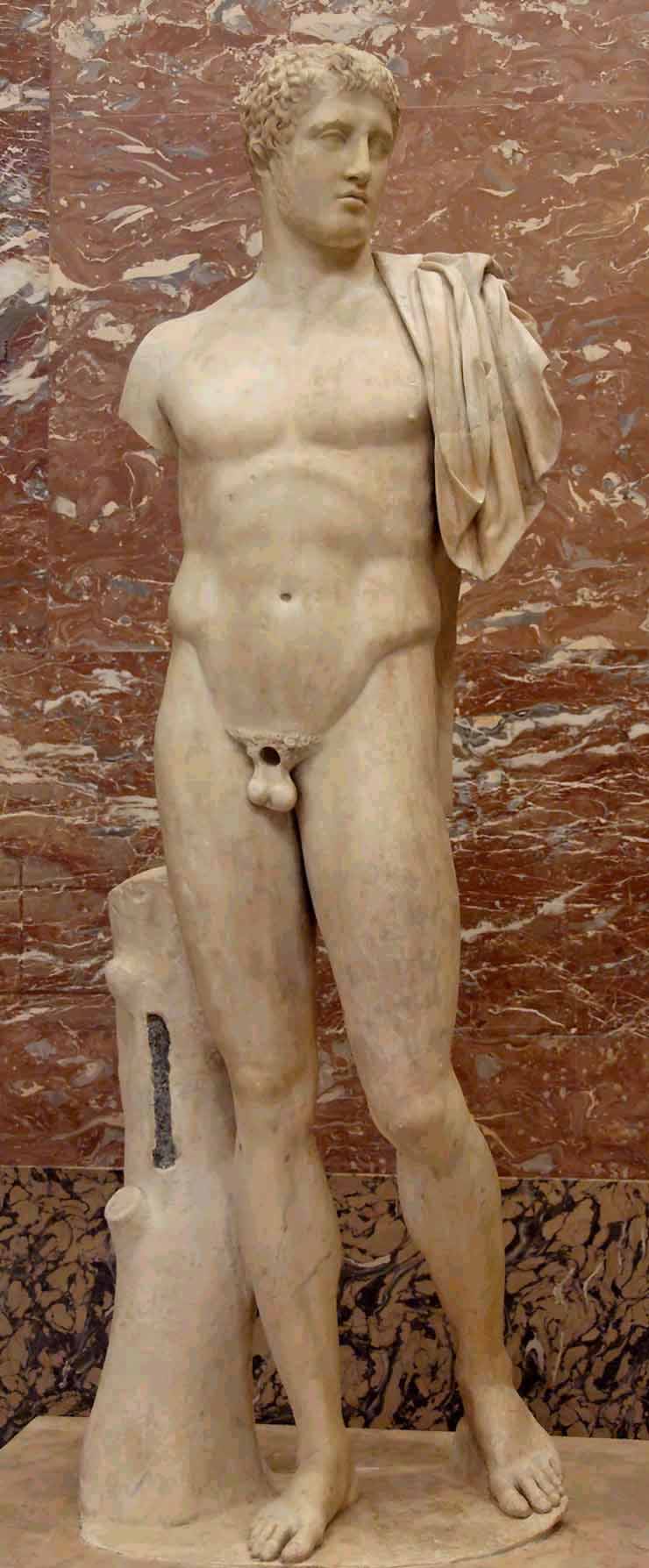


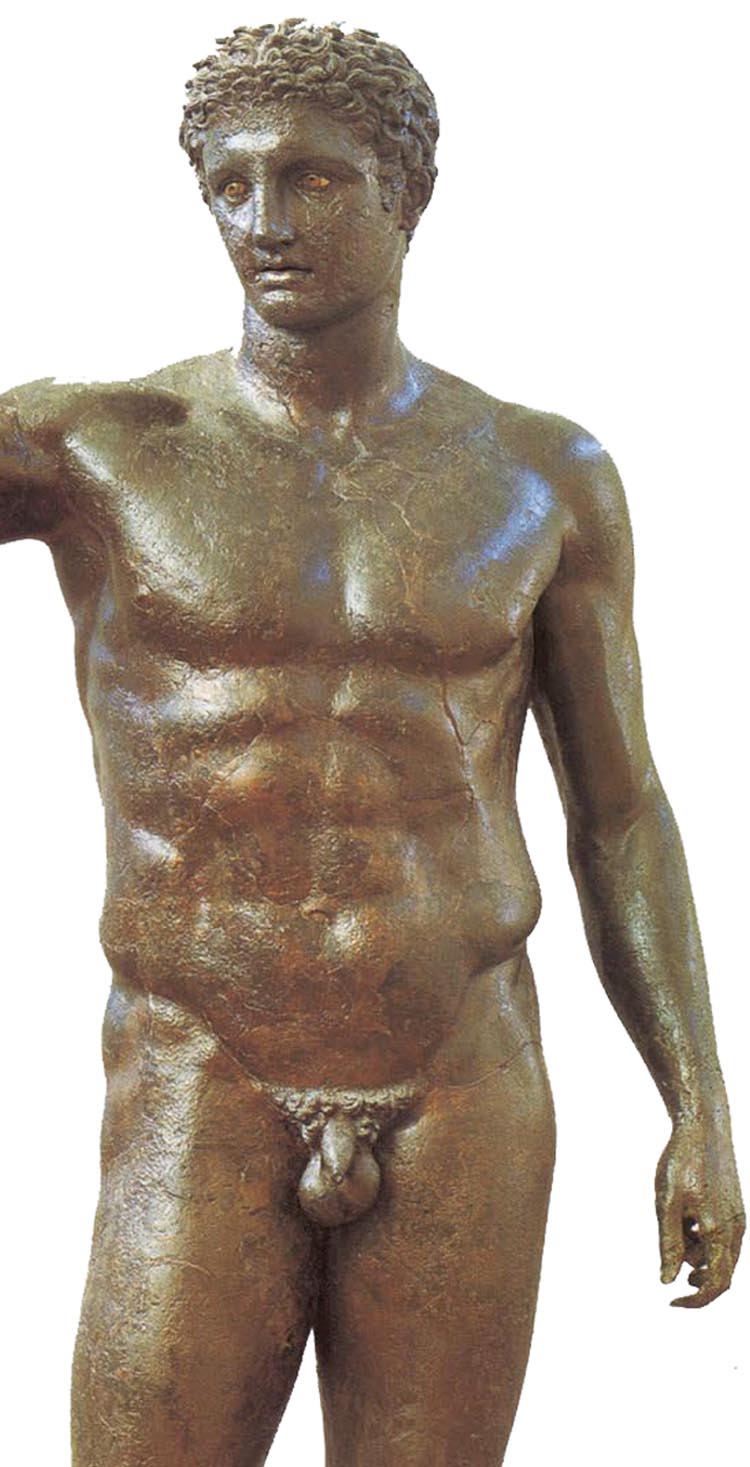
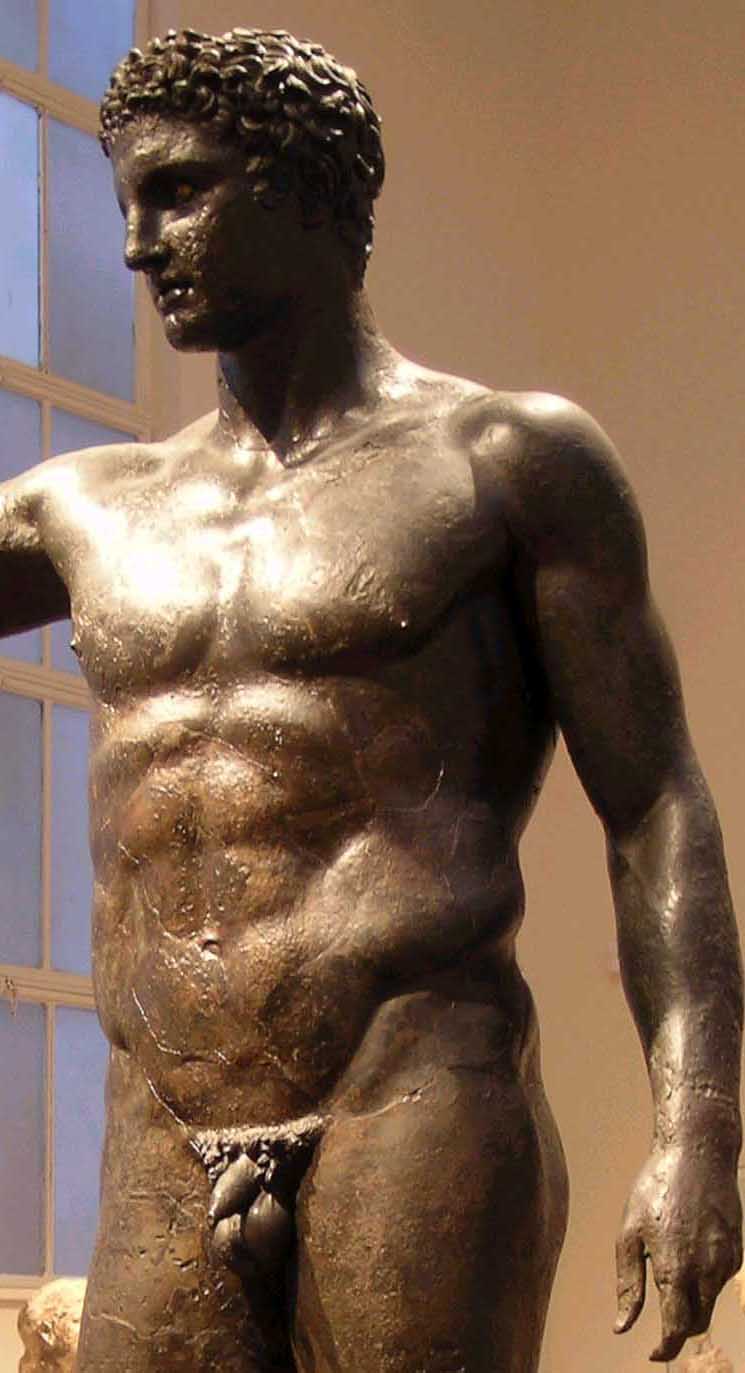
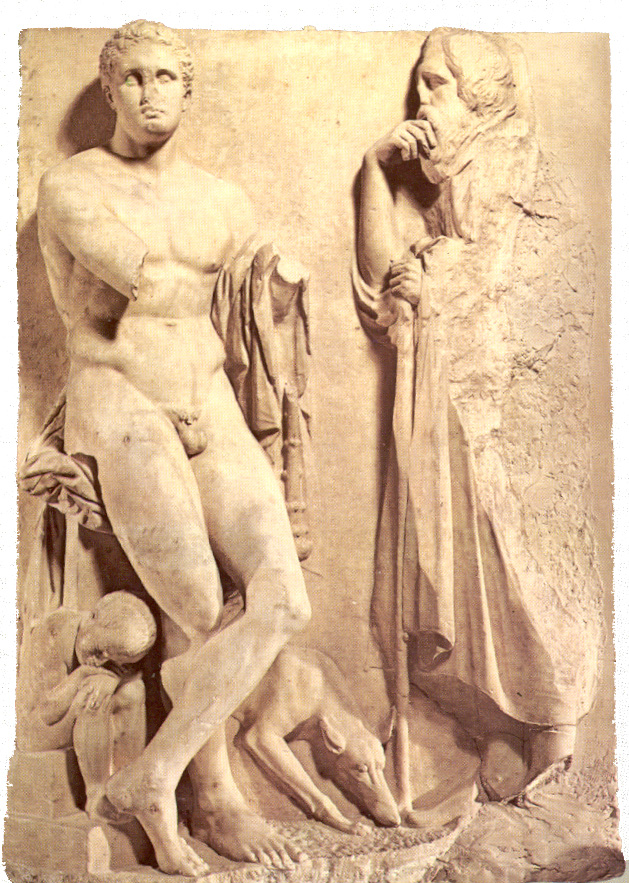







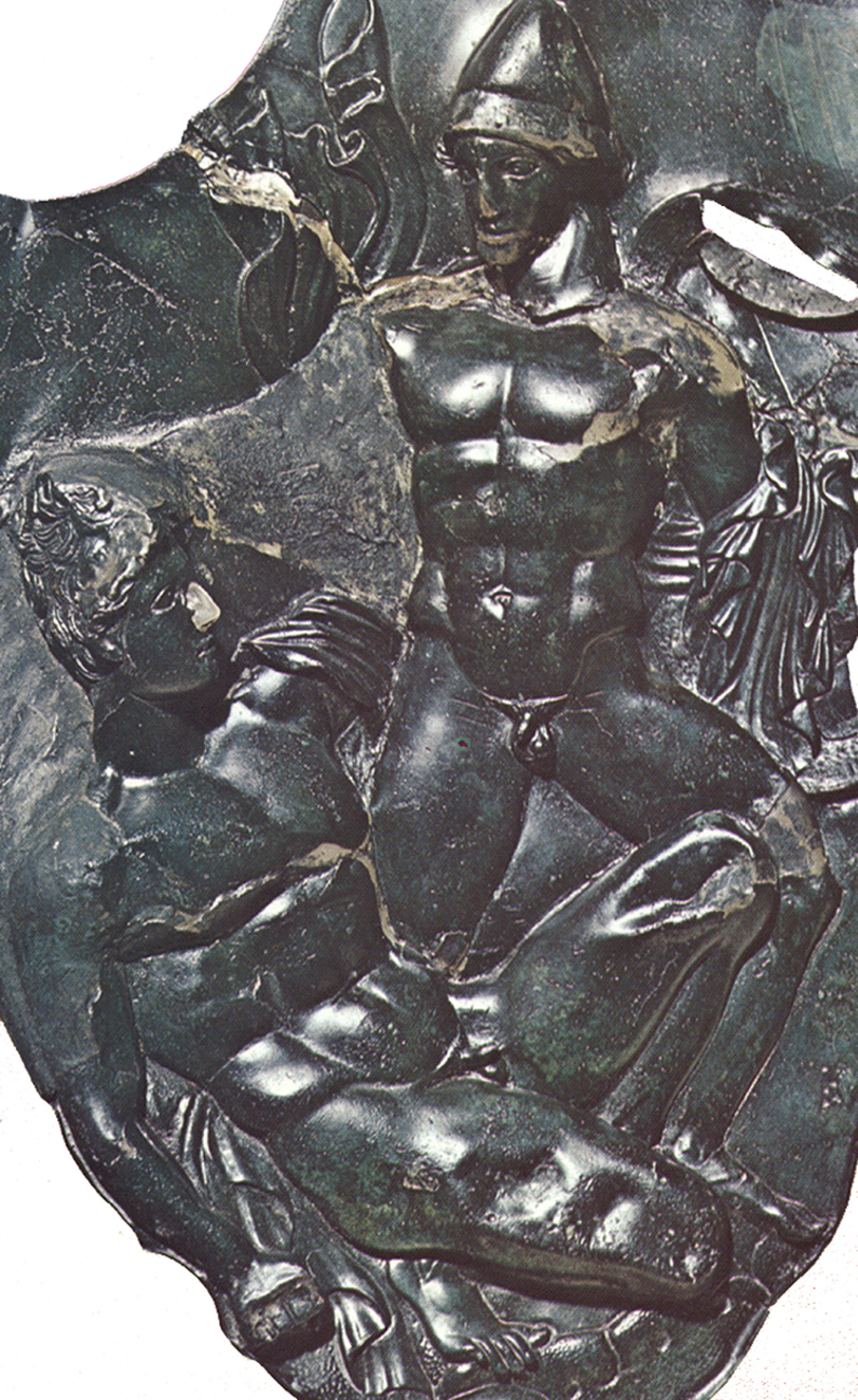
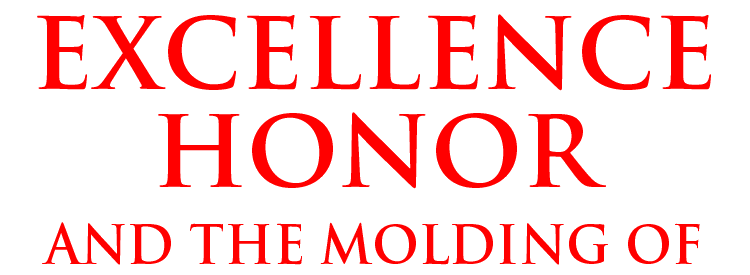









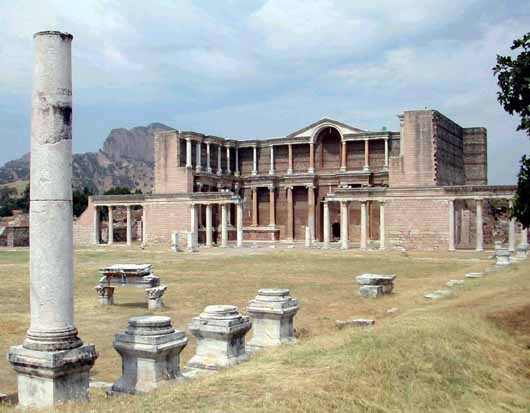
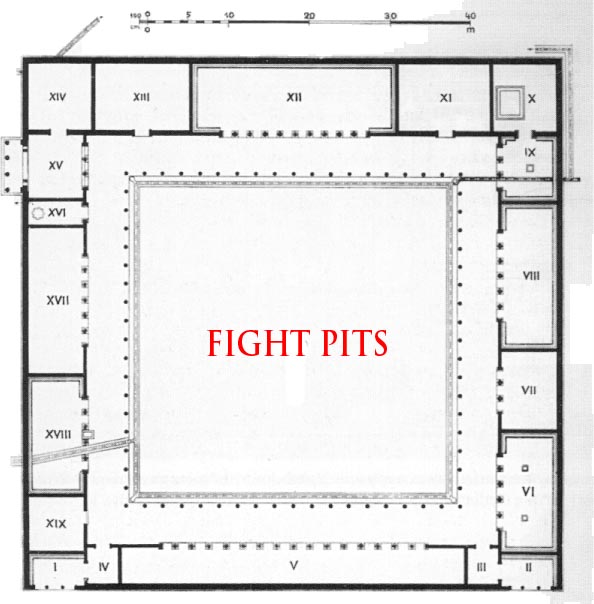


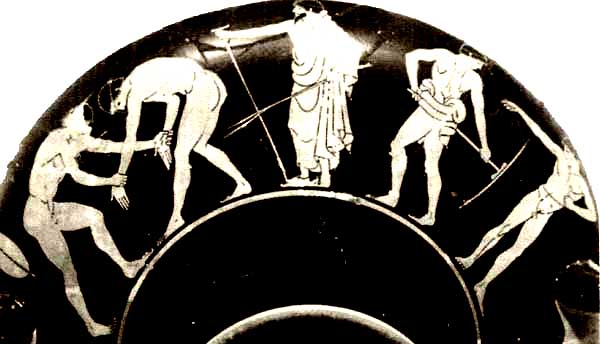
On the left, wrestlers and their trainer; to the right, a boxer wraps his hand in soft leather thongs,
while another athlete softens the sand of the fight pit -- the skamma -- with a pickaxe.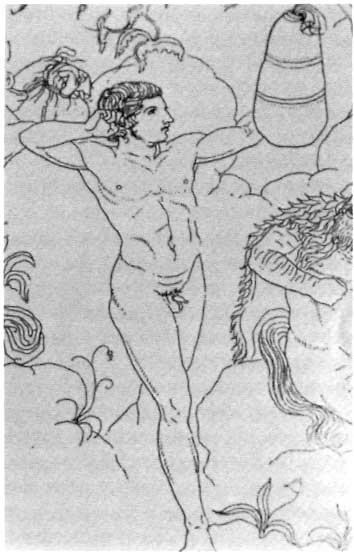
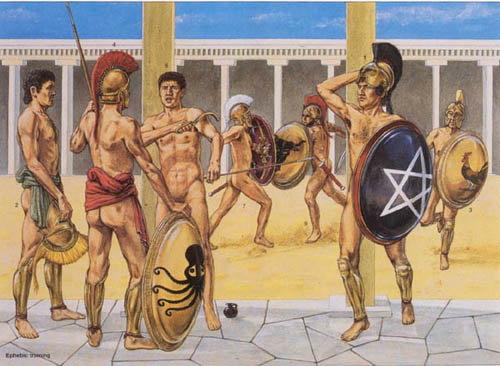
athenian ephebes train at the palaistra
the view is from the apoduterion or undressing room
cut-away of the apoduterion at Nemea
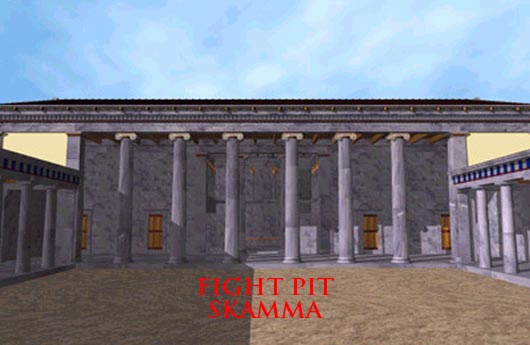
From the same root [ARES] comes areté ... the first notion of goodness being that of manhood, bravery in war; cf. Lat. virtus.

The Fight Pits are in the large courtyard at the center of the palaistra;
there are classrooms on either side of the courtyard;
the ephebeion (XII) is on the north side and the apoduterion (V) on the south.
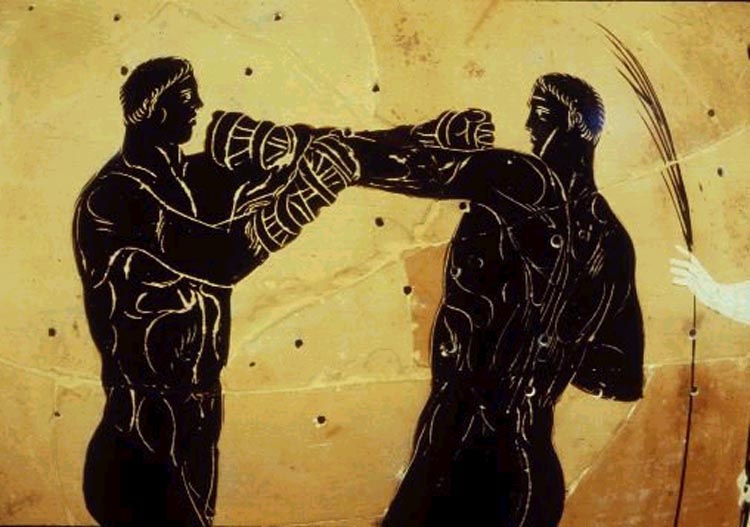



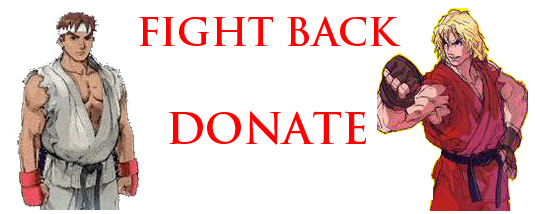
to
Contents.
to 


![]()

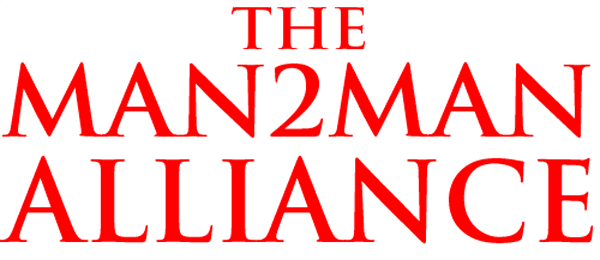






who reject anal penetration, promiscuity, and effeminacy
among men who have sex with men







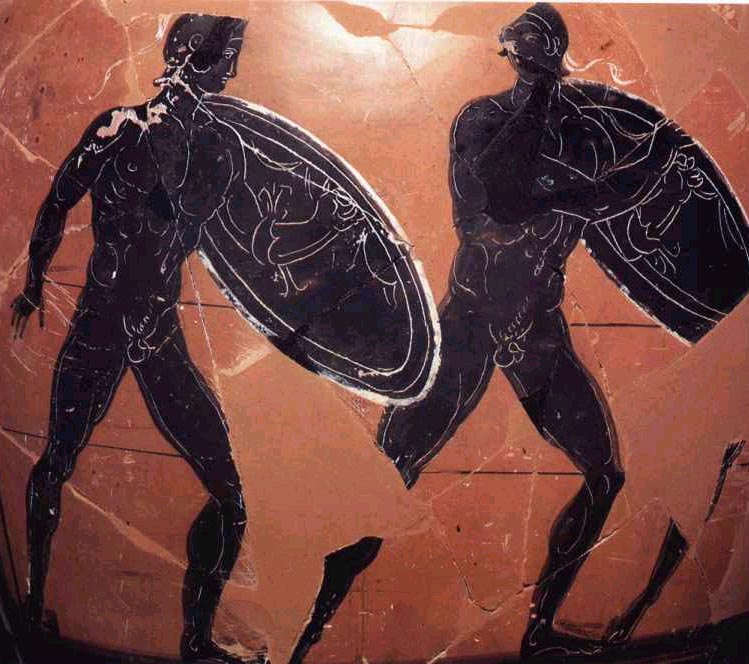
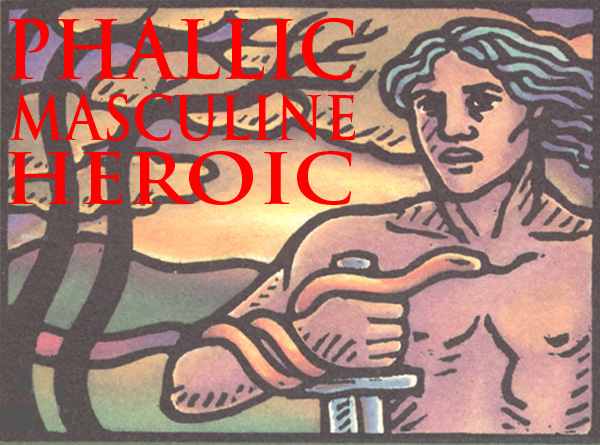


![]()

Who Celebrate, Exalt, and Worship
Fighting Manhood
In the Divine and Sacred Person of
L o r dxA r e s,
The Warrior God
God of Fight, God of Manhood, God of Fighting Manhood

| Heroes Site Guide | Toward a New Concept of M2M | What Sex Is | In Search of an Heroic Friend | Masculinity and Spirit |
| Jocks and Cocks |
Gilgamesh | The Greeks | Hoplites! | The Warrior Bond | Nude Combat | Phallic, Masculine, Heroic | Reading |
| Heroic Homosex Home | Cockrub Warriors Home | Heroes Home | Story of Bill and Brett Home | Frot Club Home |
| Definitions | FAQs | Join Us | Contact Us | Tell Your Story |




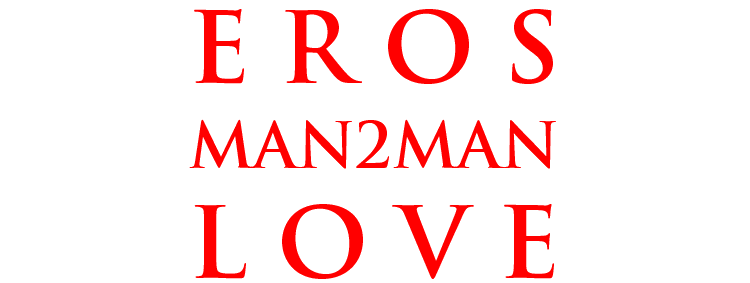
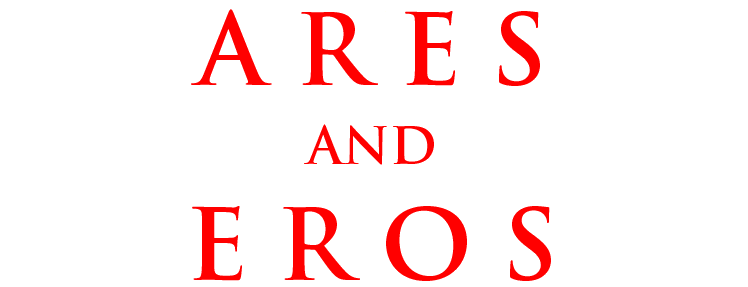
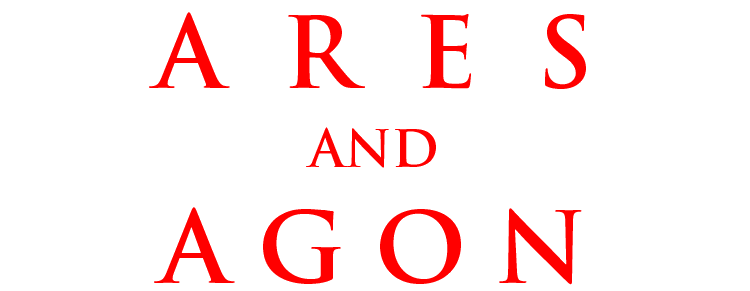
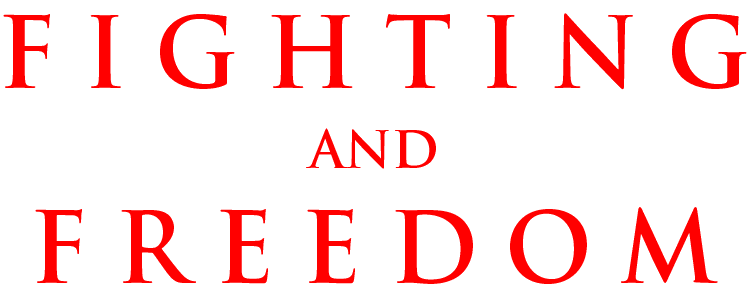
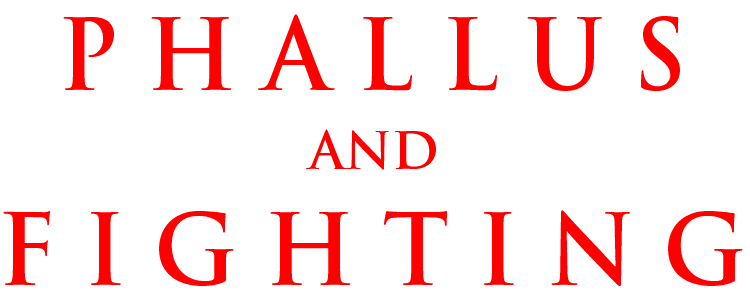
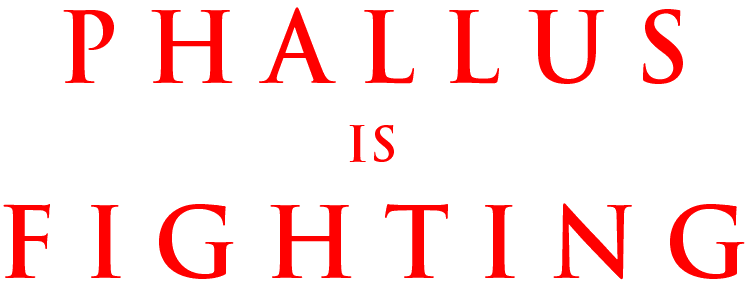
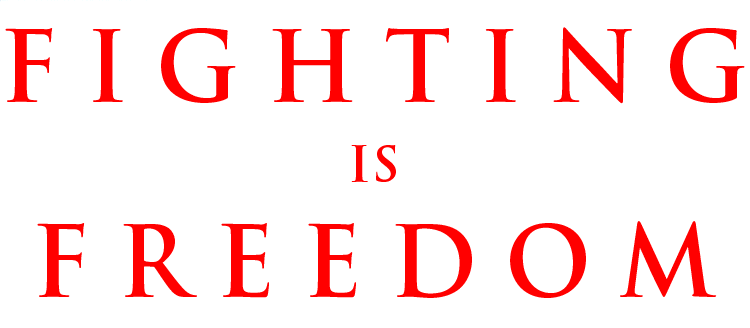


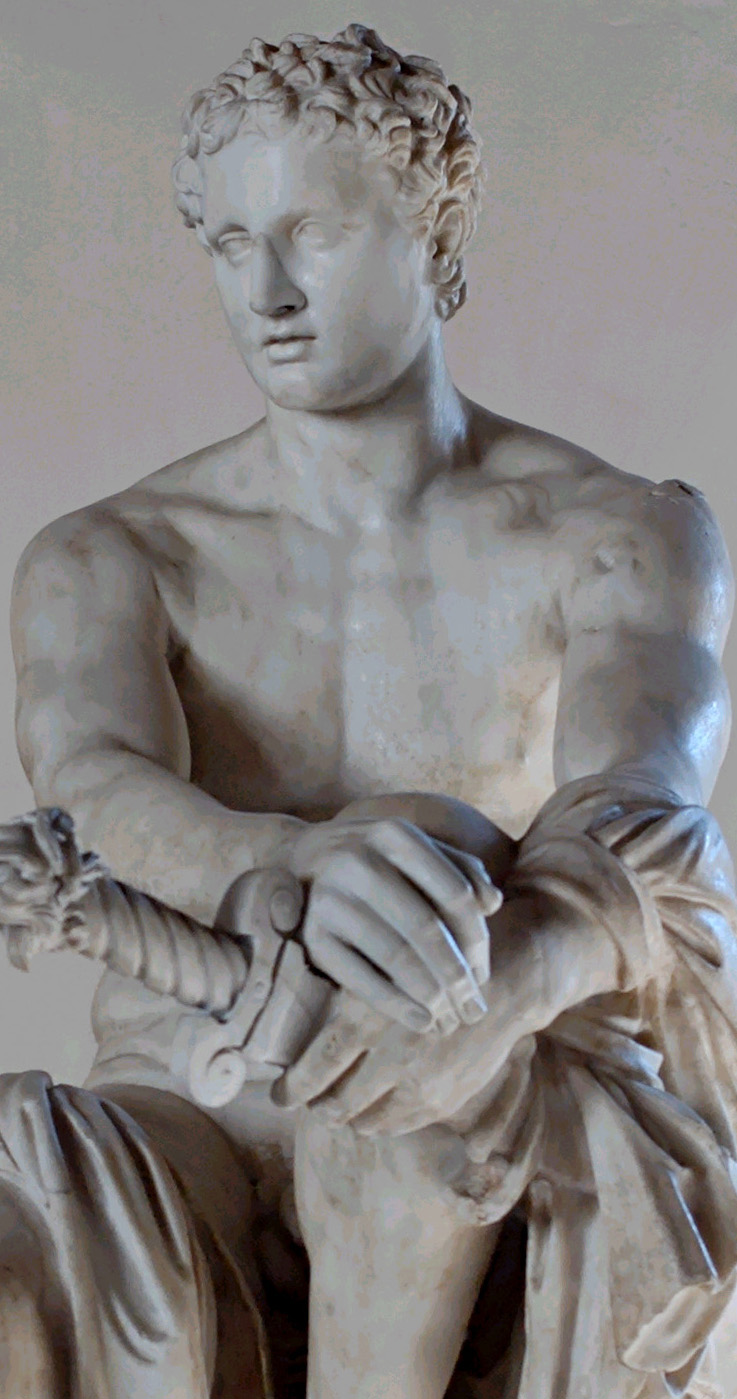

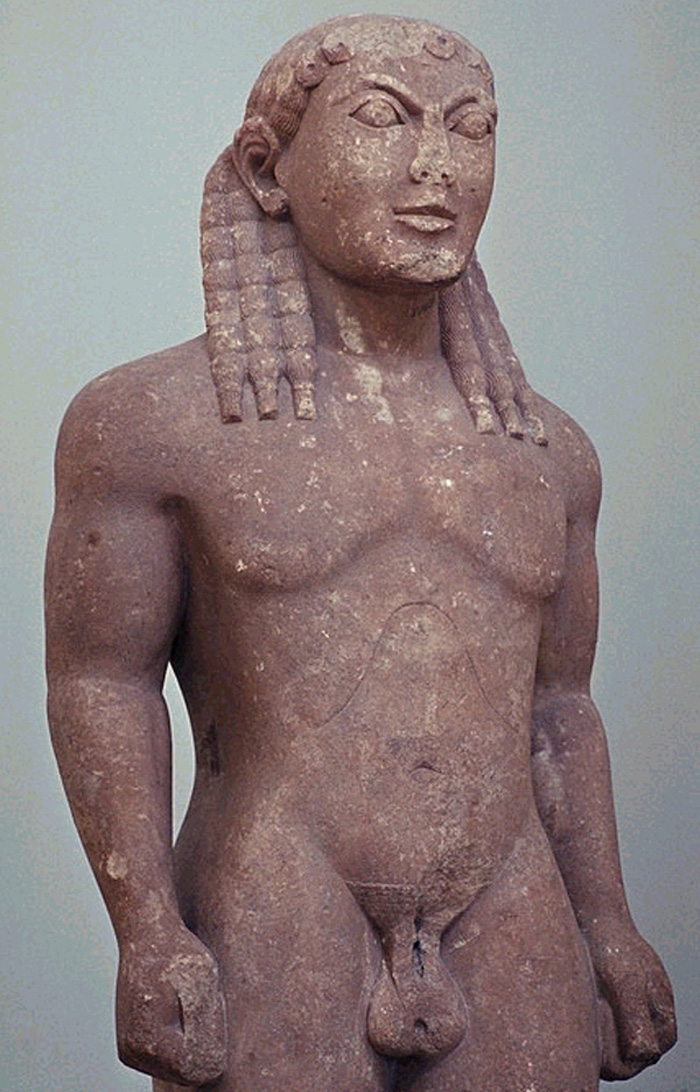

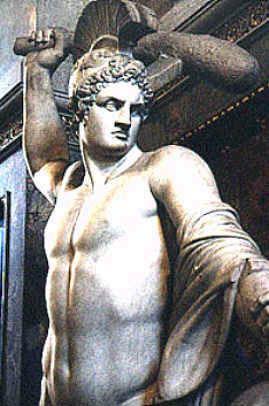
































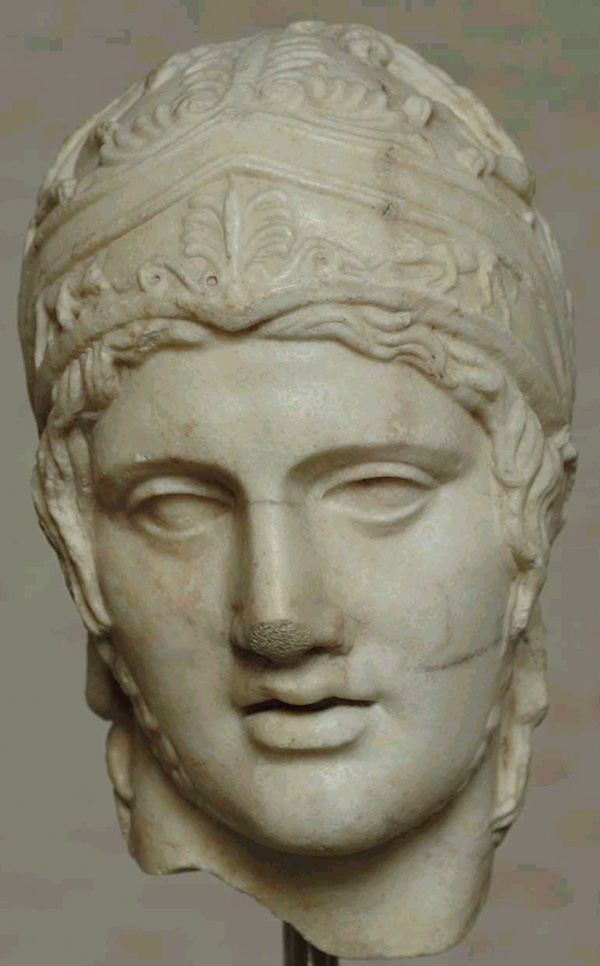

















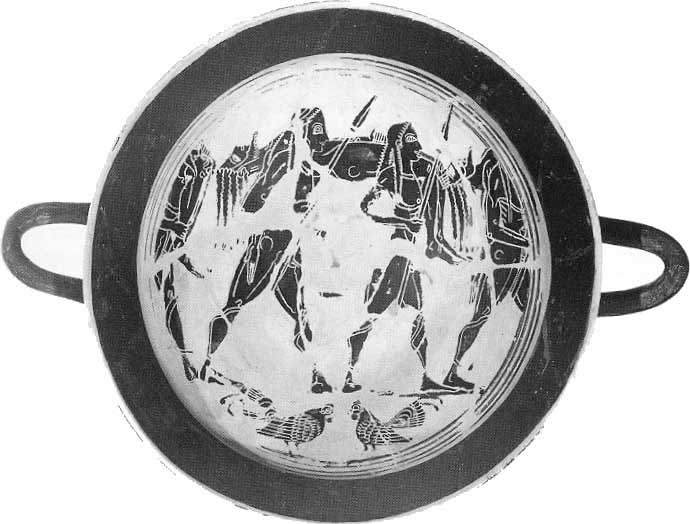














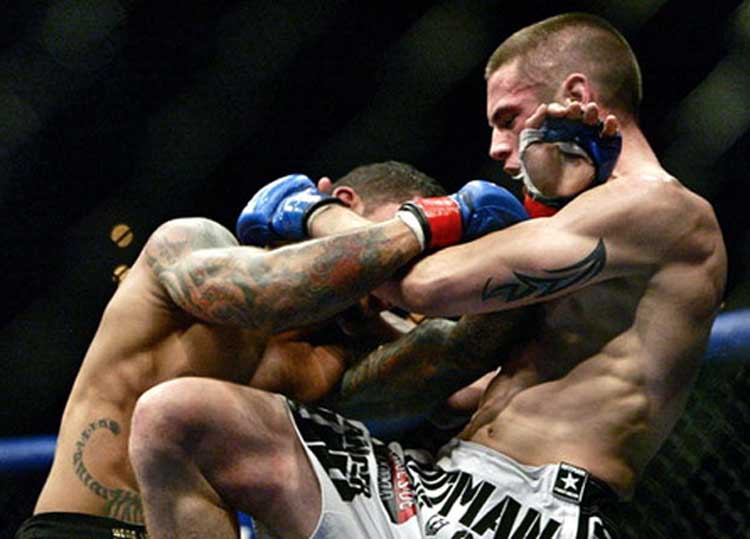














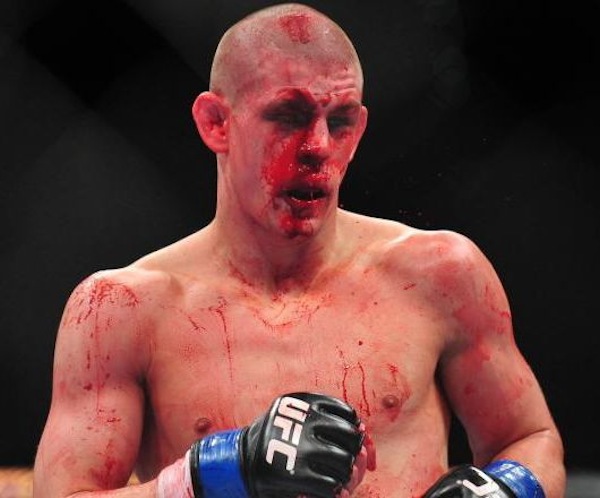

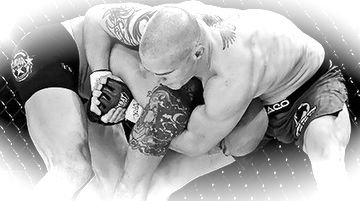
Recently I've been reading John Milton, the great English poet and defender of the Puritan and Parliamentary Revolution.
I've been reading his prose pieces -- which were written to advance that Revolutionary cause.
If you think I'm dogmatic and militant -- you should read Milton.
But his militancy helped bring about the freedoms we have today.
If an army went into battle without proper training and organisation they would lose. Historic example, in the English Civil War (1642 to 1646) the army of King Charles 1st was better organised and won most of the first battles; however Oliver Cromwell trained and organised the men fighting on Parliament's side into the New Model Army, and they won! If they had not been so organised the King would have carried on as the dictator he had been. Maybe eventually we would have got the freedoms that we enjoy now but it would have come more slowly and the monarch would have given them very grudgingly; so organisation is as you say vital to winning.









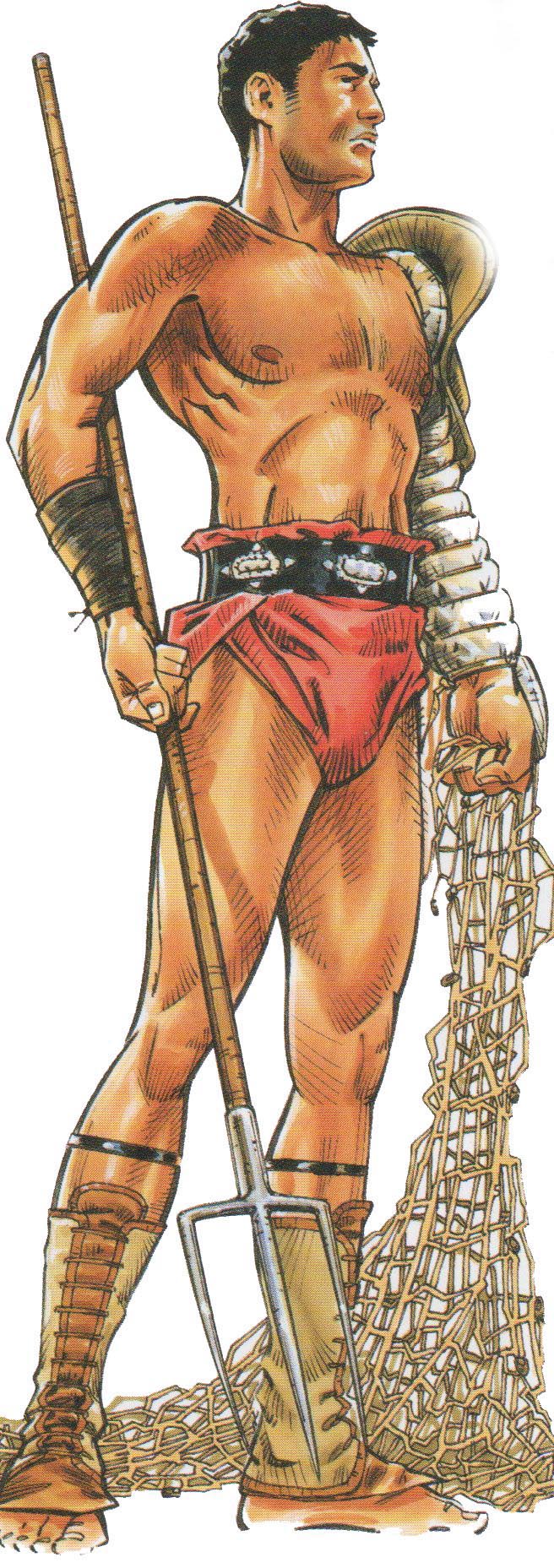


![]()


MANHOOD: A LEXICON
Word ListAncient Greek Words:
Manhood, manliness, strength, vigor, bravery, courage, excellence; Valour, gallantry, fortitude; Goodness, moral perfection, high character, virtue; Worth, merit, value.
Manhood, manliness, strength, vigor, bravery, courage, excellence; Valour, gallantry, fortitude; Goodness, moral perfection, high character, virtue; Worth, merit, value --
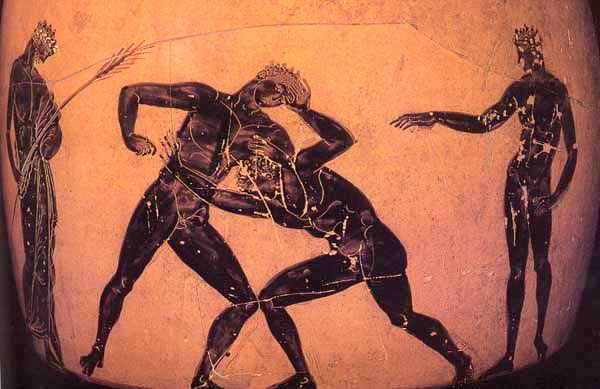
While the games were being held at Olympia, an old man was desirous of seeing them, but could find no seat. As he went to place after place, he met with insults and jeers, and nobody made room for him. But when he came opposite the Spartans, all the boys and many of the men arose and yielded their places. Whereupon the assembled multitude of Greeks expressed their approbation of the custom by applause, and commended the action beyond measure; but the old man, shaking "His head grey-haired and grey-bearded," and with tears in his eyes, said, 'Alas for the evil days ! Because all the Greeks know what is right and fair [ta kala -- The Noble Warrior Way of Manly Moral Beauty], but the Spartans alone practise it.'
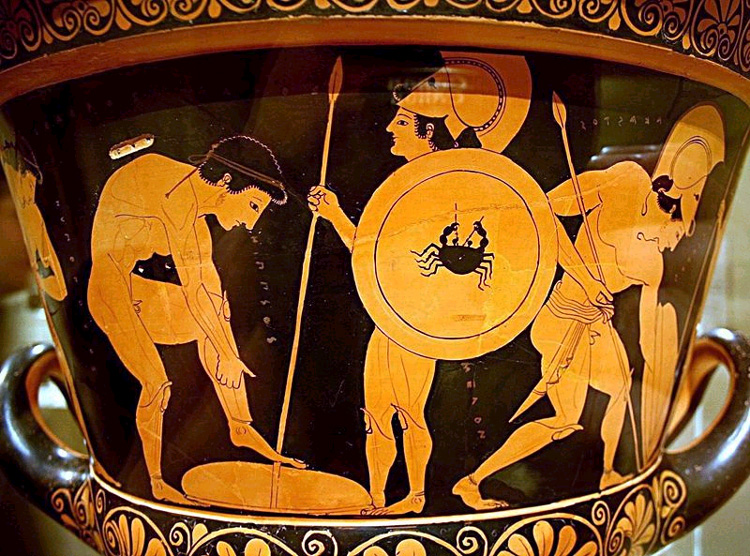
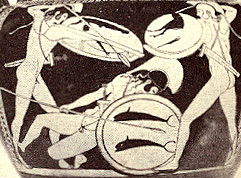
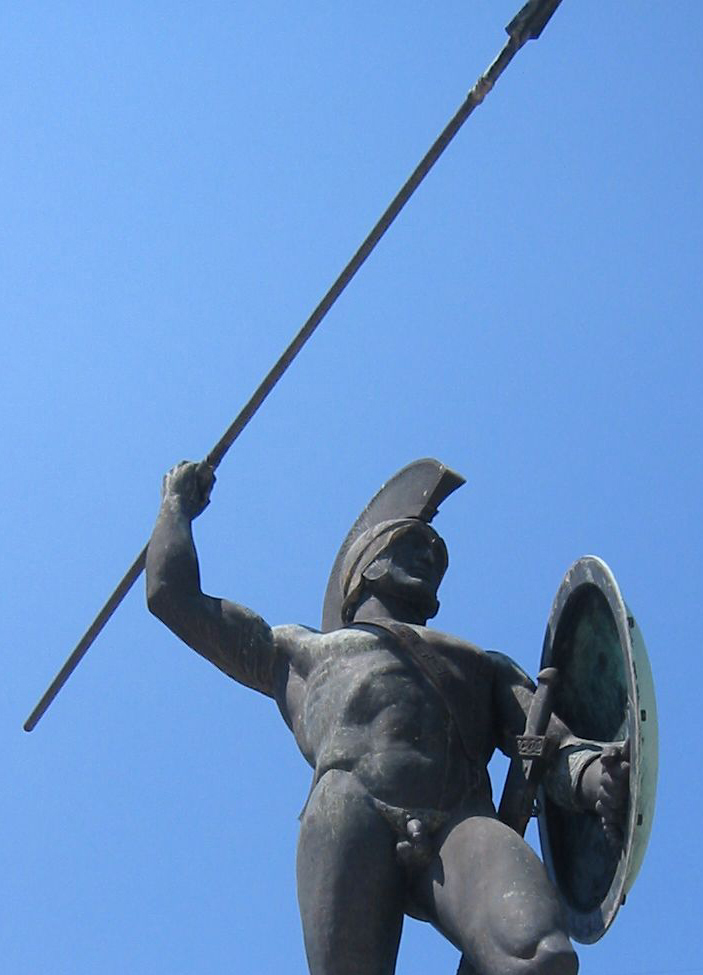



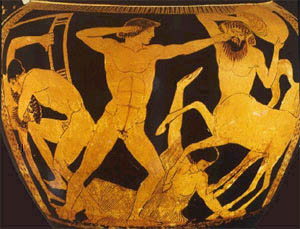
Manhood, manliness, strength, vigor, bravery, courage, excellence; Valour, gallantry, fortitude; Goodness, moral perfection, high character, virtue; Worth, merit, value.

From the same root [ARES] come areté, ari-, areion [better], aristos [best], the first notion of goodness being that of manhood, bravery in war; cf. Lat. virtus.

Diomedes
the short but glorious aristeia [heroism] of the Greek spirit. The basic motive of Greek areté is contained in the words 'to take possession of the beautiful'. The courage of a Homeric nobleman is superior to a mad berserk contempt of death in this -- that he subordinates his physical self to the demands of a higher aim, the beautiful. And so the man who gives up his life to win the beautiful, will find that his natural instinct for self-assertion finds its highest expression in self-sacrifice.
Ares, then, if you like, would be named for his virility [arren] and courage [andreion = courage, Manliness], or for his hard and unbending nature, which is called arratos; so Ares would be in every way a fitting name for the God of War.








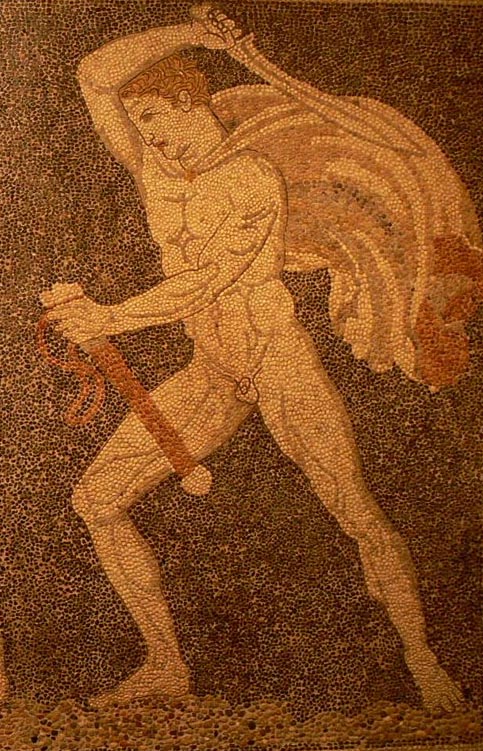
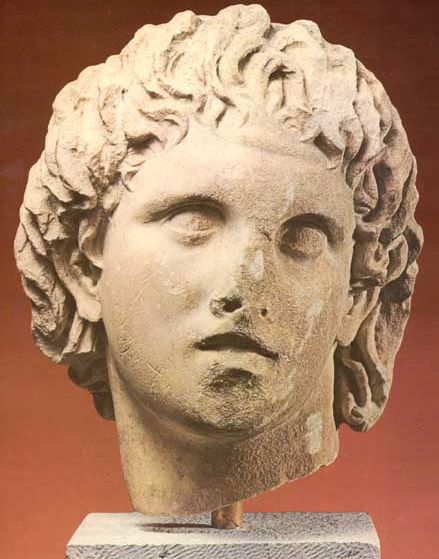
Alexander
Myth represents the active operations [daimonia] of the Gods.





The contemplation of the ειδωλον, image or symbol, leads us to the reality. The reality is always the Platonic Idea [which resides in the World of Being]. The ειδωλον, in the case of ordinary "things," is the material copy which men mistake for the reality. In the case of spiritual things and moral ideas, there is no visible image or symbol, but imperfect analogies, popular definitions, suggestive phrases . . .
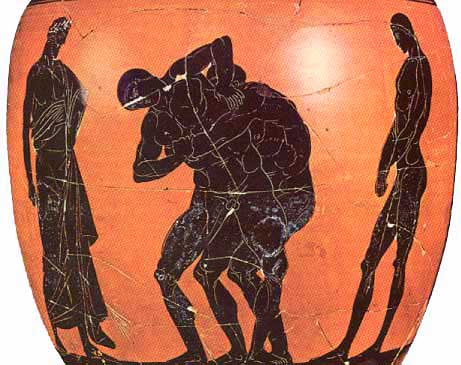
Wrestling
The ephedros is on the right ;
he'll Wrestle the Victor of the bout
[V]ictory in competition for timé also carried with it a strong entitlement to the obedience and deference of others and, therefore, lay at the basis of the loyalty of man for man. For it was simply in the nature of things, Greeks thought, for lesser men to respect and obey persons of the highest timé, worth, inasmuch as they were "worthy" of such treatment. Both gods [sic] and men paid automatic, unthinking respect to timé, and men paid respect to the gods [sic] at least in part because of their supreme timé.
The troops were, indeed, suffering terribly, but their discipline was wonderful. They made no attempt to beat off the enemy who were attacking them, but simply waited for the word from their God and their general, while they were shot and struck down at their posts.
The ruin of Paganism, in the age of Theodosius, is perhaps the only example of the total extirpation of any ancient and popular superstition; and may therefore deserve to be considered as a singular event in the history of the human mind.
The order was passed along the line to prepare for action, and suddenly there came over the whole phalanx the look of some ferocious beast, as it wheels at bay, stiffens its bristles, and turns to defend itself, so that the barbarians could no longer doubt that they were faced with Men who would Fight to the Death.
Hybris was both the act of insult -- whatever the reason for it -- and the arrogant disposition that disposed a man to the insult.
[T]he Athenians would not grant the Spartans the highest meed of valor [aristeia], nor allow them to erect a general trophy [tropaion], and the cause of the Hellenes had certainly gone at once to destruction from their armed contention, had not [the Athenian general and politician] Aristides, by abundant exhortation and admonition, checked his fellow-generals, especially Leocrates and Myronides, and persuaded them to submit the case to the Hellenes for decision.
Thereupon, in the council of the Hellenes, Theogeiton the Megarian said that the meed of valor must be given to some third city, unless they desired the confusion of a civil war. At this point Cleocritus the Corinthian rose to speak. Every one thought he would demand the meed of valor for the Corinthians, since Corinth was held in greatest estimation after Sparta and Athens. But to the astonishment and delight of all, he made a proposition in behalf of the Plataeans, and counselled to take away contention by giving them the meed of valor, since at their honor neither claimant could take offence.
